Discover the power of Staff Augmentation Best Practices in IT. Optimize team efficiency, transparent communication, and successful project outcomes.
Read Our Recent Blogs
The latest updates, stories, idea, guides from the Ontik team

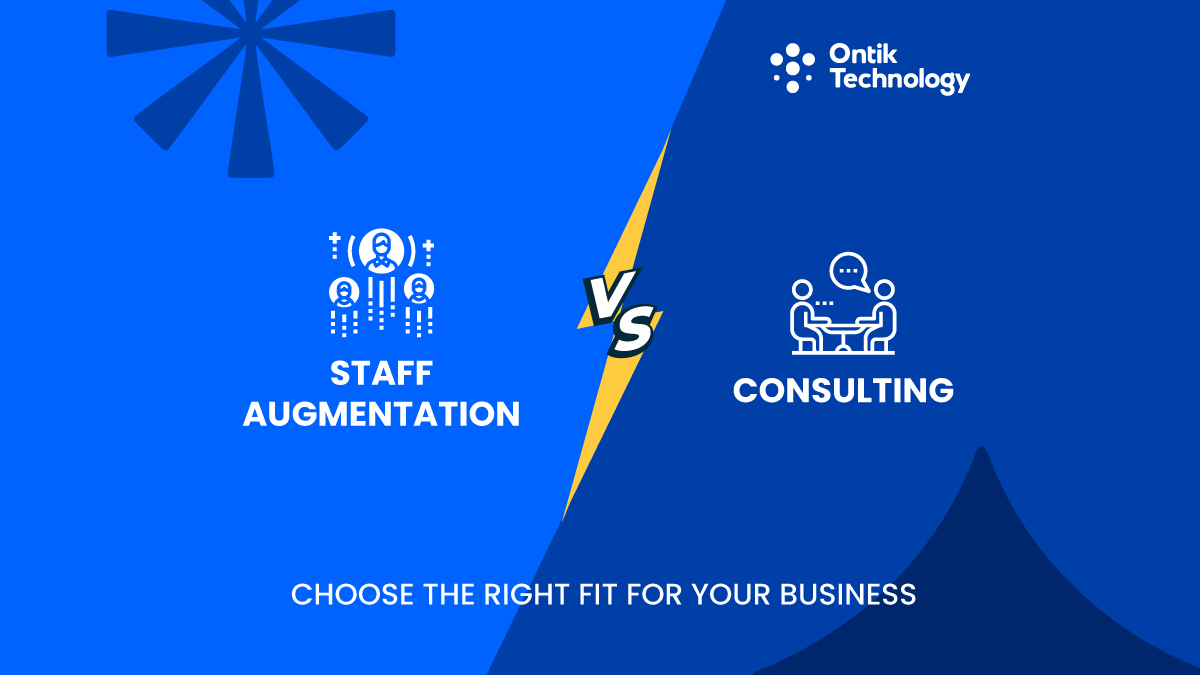
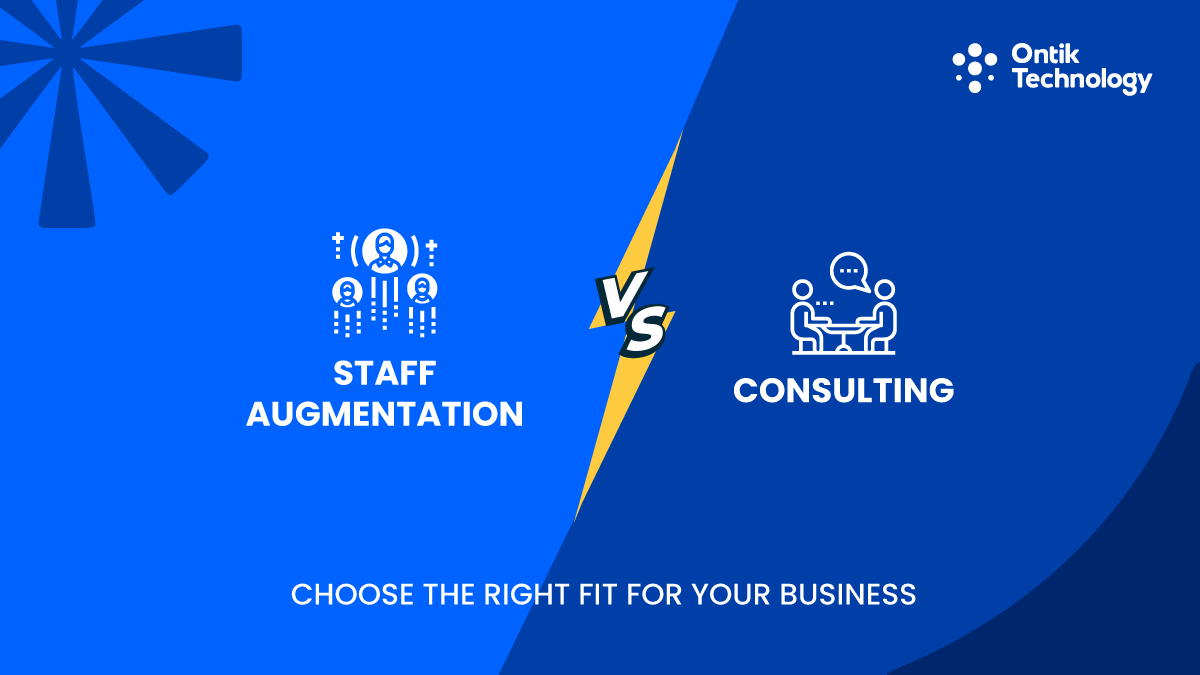
What if the secret to scaling your business strategy isn’t about working harder but choosing the right help?
Every growing company reaches a point where its in-house team is no longer enough. Deadlines get tighter. Projects get bigger. Budgets demand smarter decisions.
That’s when two powerful options appear: staff augmentation vs consulting.
Both choices seem appealing at first glance. But when you choose the right option, it can greatly help you. It will save your time, reduce costs, and create new growth opportunities. This choice is the most important for business goals in the USA or Europe. The option you choose affects how quickly your company grows. It also impacts how well you compete in your market.
Here’s the twist: Most companies don’t fully understand the difference. Staff augmentation gives you extra help to finish tasks more efficiently. Consulting brings expert minds to guide your strategy.
So, which model aligns with your objectives, schedule, and financial plan? That’s exactly what we are about to discover.
In this article, we’ll break everything down in simple terms. You’ll learn what staff augmentation is, what consulting is, and how they work in the real world. We’ll explore the key differences between them, including costs, flexibility, and skill sets.
We will also talk about when to choose staff augmentation over consulting. We will explain why some firms use both methods effectively. You will also see how Ontik Technology mixes staff augmentation and consulting to get the best results.
By the end, you won’t just know the difference, you’ll know which one will push your business ahead of the competition. Are you ready to solve the puzzle that many companies face? Let’s start by understanding each model step by step.
What is Staff Augmentation?
Staff augmentation is a way to hire skilled workers for your team. You bring them in for a specific time or project. They work under your direction, follow your process, and focus on your goals.
You manage them directly, just like your regular employees, but without the long-term commitment of a full-time hire. This makes it one of the most flexible workforce solutions for modern business processes.
Different types of team augmentation services exist. These are:
1. IT staff augmentation:
It brings in tech experts like developers, testers, or engineers to help your current team. They collaborate with you for a set time, usually until you complete a project or project requirements or finish a busy period. Perfect for software development, app creation, or technical upgrades. If you are making a mobile app and need more front-end or back-end developers, you can hire extra help for that. They follow your rules, use your tools, and work as part of your team. Many companies in the USA and Europe do this to finish work faster without overloading their full-time staff.
2. Team augmentation:
Team augmentation is not just for tech roles. You can add various professionals to help an entire department. This can include designers, marketers, project managers, or customer service staff. If you are launching a new product, you might need several experts. You may need a marketing expert. You may also need a UI/UX designer. Additionally, a data analyst could be important. Instead of hiring all of them full-time, you can bring them in for only as long as you need. This saves time, money, and keeps your team flexible.
3. Contract developers:
Contract developers are coders you hire for short-term or one-time work. They are often specialists in a certain programming language or technology. To add a blockchain payment system to your website, you can hire a contract developer. This is a good option if you don’t have blockchain experts in your company. When the team completes the work, the contract ends with no long-term commitment.
In today’s fast-moving market, this model is a smart way to stay competitive. Many companies use temporary tech staffing to handle sudden workload spikes. Others rely on remote development teams to access global talent without relocation costs. Prominent names in tech, finance, and retail already use talent augmentation to meet tight deadlines and scale quickly. For example, a software startup in Germany hired remote developers from Ontik Technology. This helped them launch their product three months earlier than planned.
The biggest advantage? Flexibility.
You can adjust your team size based on the workload. This also helps you save money. You avoid full-time salaries, benefits, and extra costs. Reports show that businesses can cut project costs by 25–40% with team augmentation services. This is better than traditional hiring.
Staff augmentation is a great fit for today’s workforce strategies. It is quick, affordable, and flexible. You can find the right talent when you need it, without any delays or wasted money.
What is Consulting Service?
Consulting involves a company engaging external experts to address challenges and enhance operations. These specialists apply their expertise to assist businesses in achieving growth and preventing expensive errors. It’s not just hiring more people; it’s about bringing in the right expertise to improve the business.It focuses on giving direction and finding the best way to move forward.
Consulting firms are not the same as internal advisors. Internal advisors work for your company and understand your daily tasks. Consulting firms come from outside, which means they can see your business with fresh eyes. They look at the bigger picture, find gaps, and suggest changes based on proven methods.
Many types of consulting services exist.
- Tech consulting focuses on the current landscape. It helps firms choose the right software, platforms, and infrastructure. This choice can make a difference in their specific situation. It’s about relevance today, not yesterday or tomorrow.
- Business consulting, on the other hand, keeps the larger company framework in view. It improves operations, enhances leadership practices, and updates strategic plans. This helps every part of the organization grow together and become stronger.
- Operations consulting focuses on daily tasks. It aims to make these tasks run more smoothly and efficiently.
Consultants don’t stop at footnotes; they stand side-by-side with executives, turning ideas into sound plans. Together, they confront key questions like, Which new market deserves the most attention? And, how do we trim expenses while protecting quality? Which technology will give us an edge? Good consulting doesn’t just give answers; it gives a clear plan to follow.
The consulting industry is growing fast. In the USA alone, the market is worth over $70 billion and keeps expanding each year. In Europe, the demand for consulting staff and strategic advice has increased rapidly. Companies are facing digital changes and global competition. Businesses want expert guidance now more than ever.
Key Differences Between Staff Augmentation vs Consulting Services
Staff augmentation vs consulting is a common debate for growing businesses. Both models help you get work done and reach goals, but they do it in different ways. Knowing the differences will help you choose the right one for your needs.
With team augmentation services, you extend your team. The new members work under your management. You guide them daily, just like your in-house employees.This is a team extension model that helps you add extra talent fast. Great for hiring contract developers or remote development teams for a software launch.
In consulting staff augmentation, the goal is different. You hire a staff consultant or a consulting team to fix a specific business problem. They analyze your situation, create a clear plan, and sometimes help carry it out. Consulting is usually project-based staffing, and when the project is done, their work ends.
Value Proposition of Each Model
The value proposition of staff augmentation and consulting has main differences in their purpose. While one focuses on execution, the other emphasizes direction.
Here’s a clear comparison:
Which Industries Prefer Which Model?
Different industries prefer different models based on their operational needs and challenges.
- Staff Augmentation is most common in technology-driven industries, where demand for specialized talent changes rapidly.
- Consulting dominates industries with strategic planning and risk management.
Strategic Advantages of Staff Augmentation
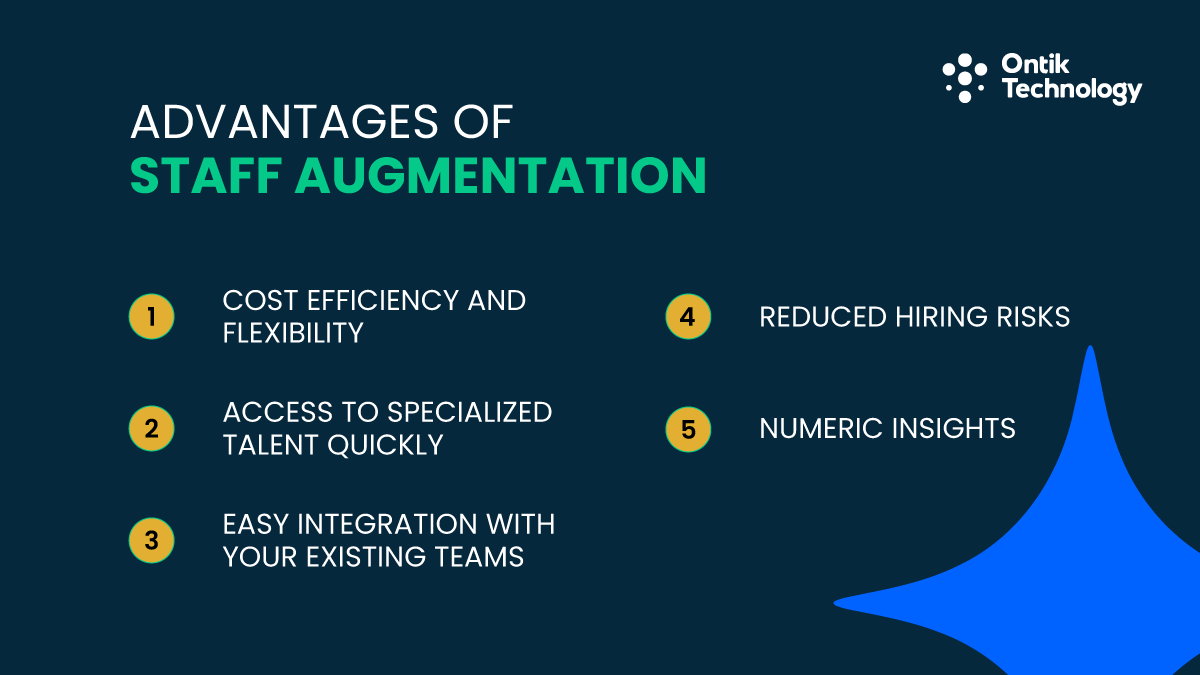
Staff augmentation gives businesses many benefits that make it a smart choice for different projects. Flexible, cost-effective, and helps you get skilled talent fast.
1.Cost Efficiency and Flexibility
Staff augmentation comes with plenty of perks. It’s flexible, easy on the budget, and lets you bring in skilled talent quickly whenever a project calls for it.
No full-time salaries. No extra benefits. No long-term commitments.
You can increase or reduce your team size whenever your workload changes. This makes it a budget-friendly and adaptable option for both small startups and large enterprises.
2.Access to Specialized Talent Quickly
Need a cybersecurity expert? A mobile app developer? Or a data analyst?
IT staff augmentation services let you find specialized talent in days instead of months. This is a significant advantage when you need contract developers or remote teams for urgent projects.
3.Easy Integration with Your Existing Teams
Augmented staff work directly with your in-house team. They follow your rules, using your tools, workflows, and fitting into your company culture. This makes onboarding smooth and helps maintain project speed. They feel like part of your team just without the long-term contract.
4.Reduced Hiring Risks
Permanent hires can be costly if they don’t work out. With temporary tech staffing, you can bring in talent for a short period first. You can extend the contract or hire them full-time if they're a good fit.
5.Numeric Insights
Companies save 25–40% on project costs with staff augmentation consulting services compared to hiring permanent staff. You save money by cutting hiring costs and skipping employee benefits. Faster onboarding makes the outsourcing model even more effective.
Strategic Advantages of Consulting
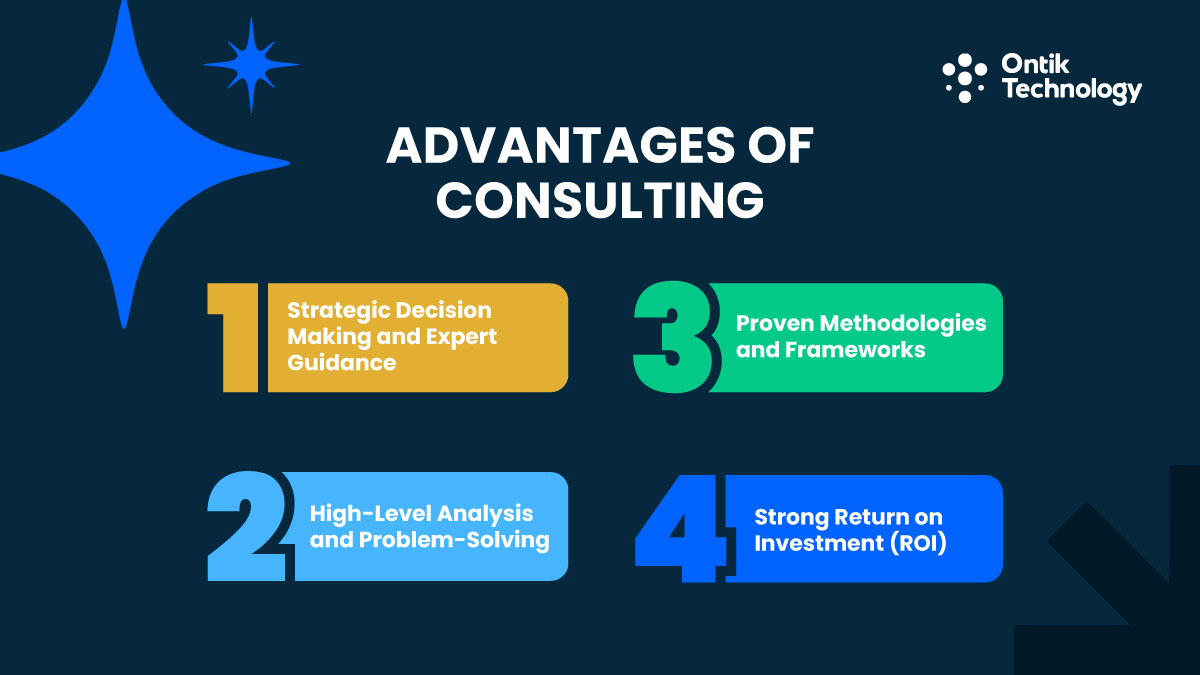
Consulting is about bringing in outside experts. They will guide strategy, solve problems, and help you make the best business moves. It’s all about strategy and getting results, not just having more people on board.
1.Strategic Decision-Making and Expert Guidance
You may benefit from consulting assistance in aligning your business objectives with effective strategies.
They evaluate your project scope, analyze market trends and market position. They recommend helping you choose the best direction and avoid costly mistakes.
2. High-Level Analysis and Problem-Solving
Consultants dig into your challenges and opportunities. They use their knowledge to find gaps. They suggest solutions and make sure you stay competitive.
3. Proven Methodologies and Frameworks
A consultant doesn’t rely on guesswork. They bring tried-and-tested methods that have delivered results for other businesses. These frameworks help you execute changes smoothly and measure results.
4. Strong Return on Investment (ROI)
The right consulting engagement can lead to big returns. Reports show companies get a high return when they use consulting to grow, cut costs, or go digital. While it may cost more than team augmentation, the value often comes back many times over.
Staff Augmentation vs Consulting: Which is Better?
Deciding between staff augmentation vs consulting isn’t about which one is “good” or “bad.” You should select the option depends on your current needs. There are three options to consider like scope, budget ansd timeliness. This will help you to make decision. Though the two models have some differences, but both deliver good results.
Factors to Consider
- Project scope: Do you just need extra hands to execute tasks, or do you need expert advice to guide the project from the top?
- Budget: Are you looking for a cheaper team augmentation option? Or can you pay more for specialized consulting?
- Timelines: Are you in a hurry, or can you take some time to plan and think before jumping in?
When to Choose Staff Augmentation
Pick staff augmentation when you need skilled professionals fast. It works well for short term projects, tight deadlines, or when your team is missing certain technical skills.
A reliable staff augmentation company can connect you to a global talent pool. You can find software engineers, designers, or other experts in just a few days. You get the specific skills you need without a long recruitment process or long term commitment.
When to Choose Consulting
If your problem is difficult and needs expert help, choose consulting. It works well for long-term planning, market growth, cost savings, or improving business goals. A consultant studies your project scope and finds the gaps. They give you a clear plan for success using proven methods and frameworks.
Hybrid Models: The Best of Both Worlds
Some companies don’t choose, they blend both. Consultants create the plan, then team augmentation specialists handle the execution. This hybrid model mixes expert direction with the speed and flexibility of an outsourcing model. You get strategy and action working together for maximum impact.
Skills and Expertise: What You Get from Staff Augmentation Or Consulting
1.What skills are common in staff augmentation vs consulting?
When you look at staff augmentation vs consulting, the skills they bring are pretty different.
Staff augmentation gives you the exact skills you need to get the work done. You might need software engineers, UI/UX designers, testers, or data analysts. These professionals join your team and work like they’re part of it, but without a long-term contract. The goal is to fill a gap fast and keep projects moving.
Consulting is about expertise, strategy, and decision-making. A consultant might not write code or design a website. They guide your team, study your project scope, and give you a clear plan that works. They bring years of experience, industry insight, and proven frameworks.
Both models have value: One gives you extra hands, the other gives you a sharper mind for solving problems.
2.Industries leveraging specialized skills (IT, software, finance)
Different industries use these models in different ways. In IT and software, team augmentation is common when deadlines are tight or a new product needs to launch fast. Companies hire contract developers or, based on project needs, agencies or companies hire remote development teams, or other tech talent. This helps them speed up delivery without hiring full-time staff.
In finance, consulting is often the best choice for risk management and compliance. It also helps improve operations and long-term performance. Strategic guidance is very important in this sector, so decision-making matters a lot.
Other industries like healthcare, e-commerce, and manufacturing also blend the two models. Many companies use staff augmentation for quick talent access. They use consulting for strategic planning.
3. How Ontik Technology bridges this skill gap effectively
Ontik Technology understands that businesses often need both skills and strategy. They offer IT staff augmentation services to quickly add skilled professionals to your team. This could be developers, designers, or other specialized talent from a global talent pool.
At the same time, they offer consulting expertise. Their consultants help you plan, improve processes, and achieve your business goals.
By combining both models, Ontik Technology helps companies act fast without losing sight of long-term success.
Flexibility and Scalability in Staff Augmentation vs Consulting
1. Why scalability is critical for startups and enterprises
Scalability is one of the most significant factors for shaping business growth. For startups, it can be the difference between surviving and shutting down. A small team may handle early projects. But as new clients and bigger demands come in, they need more hands and stronger systems. That’s where scalability matters.
For enterprises, scalability helps them adjust to market changes. It also prevents them from wasting resources. Sometimes they need to expand fast into a new region or launch a new service. Other times, they need to scale down to save costs during slow periods.
A flexible workforce solution helps startups and enterprises stay ahead. This works no matter their size or stage of growth.
2. How augmentation enables quick scaling
Staff augmentation makes scaling simple and fast. It helps you to quickly add skilled professionals. It's best for short-term projects, product launches, or busy periods. This approach saves you from the long recruitment process.
A tech company can quickly hire software engineers, testers, or designers using a team augmentation model. They don’t need to commit to long-term contracts or full-time salaries. This flexibility saves both time and money.
IT staff augmentation services make scaling simple. The process stays smooth and quick. You can add people when you need them and reduce the team when the project ends. That’s why businesses see this as a smart way to stay agile.
3.How consulting provides structured growth plans
While augmentation gives speed, consulting provides structure. A consultant studies strategically. They design a roadmap for growth that supports long-term goals. This is useful for entering new markets, cutting costs, or building stronger operations.
Consultants use proven strategies and frameworks. They also bring deep industry knowledge. They help companies avoid mistakes and make smarter moves. Unlike augmentation, which adds people to your team, consulting shapes the direction of the entire business.
Both models give businesses what they need. Staff augmentation offers you fast execution. On the other hand, consulting ensures steady growth.
Managing Risks in Staff Augmentation and Consulting
When you look at staff augmentation vs consulting, both come with some risks.
Common risks include
- Sometimes external developers don’t deliver the quality you expect.
- Working with remote teams can also bring communication or culture issues.
- Lack of the exact technical skills needed for your project.
- High consulting fees without guaranteed results.
- Consulting strategies that look good on paper but don’t match your business goals.
Ways to reduce risks:
- Carefully vet talent and check past work before hiring.
- Define roles, timelines, and the project scope clearly in contracts.
- NDAs (non-disclosure agreements) is a smart way to keep your data safe.
- Monitor progress regularly to spot issues early.
Real world examples:
- Some companies rushed into temporary tech staffing and ended up failing.
- But others did well by bringing in contract developers who cut delivery time by 30%.
- Many enterprises improved compliance and saved millions through smart consulting strategies.
Both models can work well. Success depends on planning, choosing the right people, and managing risks the right way.
How Ontik Technology Leads in Staff Augmentation and Consulting
Ontik Technology is well known for combining the best of staff augmentation and consulting. Instead of offering one-size-fits-all solutions, they look at what your business actually needs speed, strategy, or both.
They provide you with the best staff augmentation services. It gives you quick access to skilled talent. You can bring in developers, designers, or analysts easily, without long hiring cycles. This means you can scale your team fast, meet deadlines. They make sure the talent you get fits right into your workflow, so projects move smoothly without delays.
Their consulting services are experienced in guiding businesses in the right direction. They study your goals, analyze gaps, and create proven strategies. The advice is practical, tested, and built to deliver results.
Ontik’s real strength lies in balance. What sets Ontik apart is their ability to bridge execution with strategy. You don’t just get extra hands for tasks or expert minds for planning, you get both working together. That’s why businesses across industries trust Ontik as their go-to partner for scaling fast and growing smart.
Conclusion
When you think about staff augmentation vs consulting, there isn’t a single best choice. The real question is: What does your business need right now? Staff Augmentation is the best option for bringing skilled people and staying flexible. On the other hand, consulting can be the better choice for making a solid plan, expert advice, and a strategic plan. Go with consulting if you want clear guidance on how to grow.
Some companies even mix both. They use staff augmentation to get the work done and consulting to shape the strategy. The key advantage of Ontik Technology is that you don’t have to choose one over the other. They help you to provide both options that fit your goals, budget, and timeline. But firstly, you have to know your business like challenges, priorities, and long-term goals. The right partner will do more than just fill a gap. They’ll help your business grow confidently. Ultimately, the best choice is the one that aligns with your current needs and future plans.
FAQs
1.What does staff augmentation mean in IT projects?
It means adding skilled professionals to your team for a set time. They work with your in-house team to complete projects faster.
2.Is consulting more expensive than staff augmentation?
Yes. Consulting costs more because it gives expert advice and clear strategies. Staff augmentation is usually cheaper since you only pay for the talent and hours you need.
3.Can a company use both models together?
Absolutely. Many companies use consulting to plan their projects. They use staff augmentation to get the actual work done. This mix brings both strategy and speed.
4.Which model is better for startups vs enterprises?
Startups often prefer staff augmentation for quick scaling. Large enterprises often choose consulting for long-term and structured growth. Both can benefit from a hybrid model.
5.How to choose a reliable partner like Ontik Technology?
Look for experience, global talent access, and a track record of success. Ontik Technology provides both skilled talent and consulting support, so they are a reliable partner.
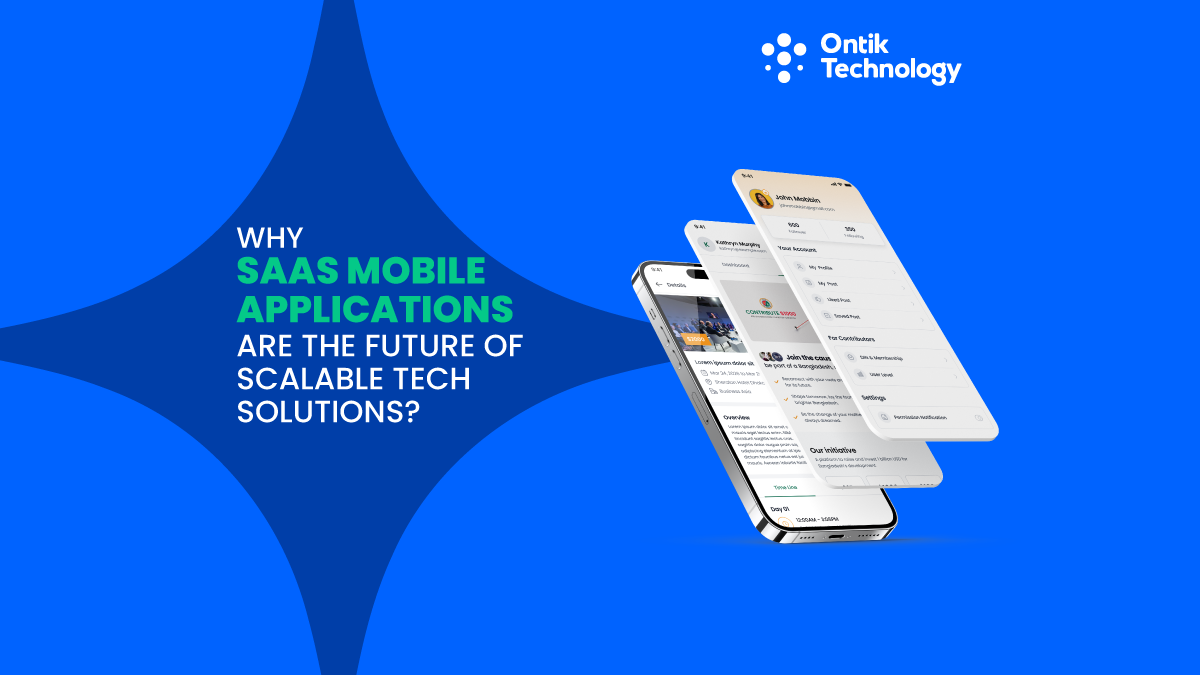

Companies or organisations no longer depend on manual or traditional software, they are more focused now in becoming digitalized. This is where SaaS mobile applications come to play. A saas mobile app runs without the hassles of any common software, making it easy to bring functionality at a large scale. It is inherently versatile, therefore it forms an integral part that allows businesses to deliver scalable services without the burden of traditional software of the SAAS (software as a service) model today catering to wide-ranging business requirements across industries.
SaaS applications are different from standard software in that they are hosted on cloud servers and accessible via all devices. It follows a subscription-based business model, ensuring lower upfront costs and faster updates. When it comes to app development, gone are the days of companies just wanting a flashy design; firms are now leaning toward user-friendly design, enhanced security, and global accessibility.
Many developers now use vibe coding software and custom SaaS app development to speed up launches. A saas mobile application needs careful planning, but the reward is stronger customer engagement. In 2024, the SaaS market passed $200 billion, with mobile SaaS growing at a 12% CAGR. Finance, healthcare, and education drive much of this demand. Companies like Ontik Technology, one of the best SaaS app development companies, set global standards for scale and quality.
The future is clear: SaaS Mobile Applications are not a trend. They are the foundation of scalable and innovative tech.
What Are SaaS Mobile Applications?
SaaS mobile applications are different from regular traditional applications or software. They run on the cloud but are designed for smartphones and tablets. Users no longer have to download and run heavy applications, they only need to open a saas mobile app, log in, and get started. For example apps like Slack, Dropbox, Zoom are all part of SaaS mobile applications.
It is not like you are purchasing the software when you begin to use a saas application. You subscribe to it. The saas business model spreads the cost over time and takes care of everything necessary to maintain the software for you. And this further lets saas application development like a stroll in the park. Thanks to the use of in-place upgrades via backend, and single foldable devices that do not require the same, they just work.
You can compare it with SaaS Web Applications. A web-based program performs in a browser. A saas mobile application delivers a similar service right into a mobile-friendly experience. That includes offline help, push notifications, and workability for little screens.
The figures say it all. More than 70% industries employed at least one saas app in 2024, and the global mobile SaaS market is worth over $60 billion. By 2030, therefore, purchasing power parity per capita income is expected to grow at an average annualized rate of 15%. This trend will be driven by finance, e-commerce and manufacturing.
So, when you hear about SaaS Mobile Applications, don’t think of them as “just another app.” They’re scalable business tools, designed to handle secure payments, sensitive data, and millions of users without breaking down. That’s what makes them different and hence, they’re growing so fast.
Quick Comparison: SaaS Mobile Applications vs Regular Software Applications
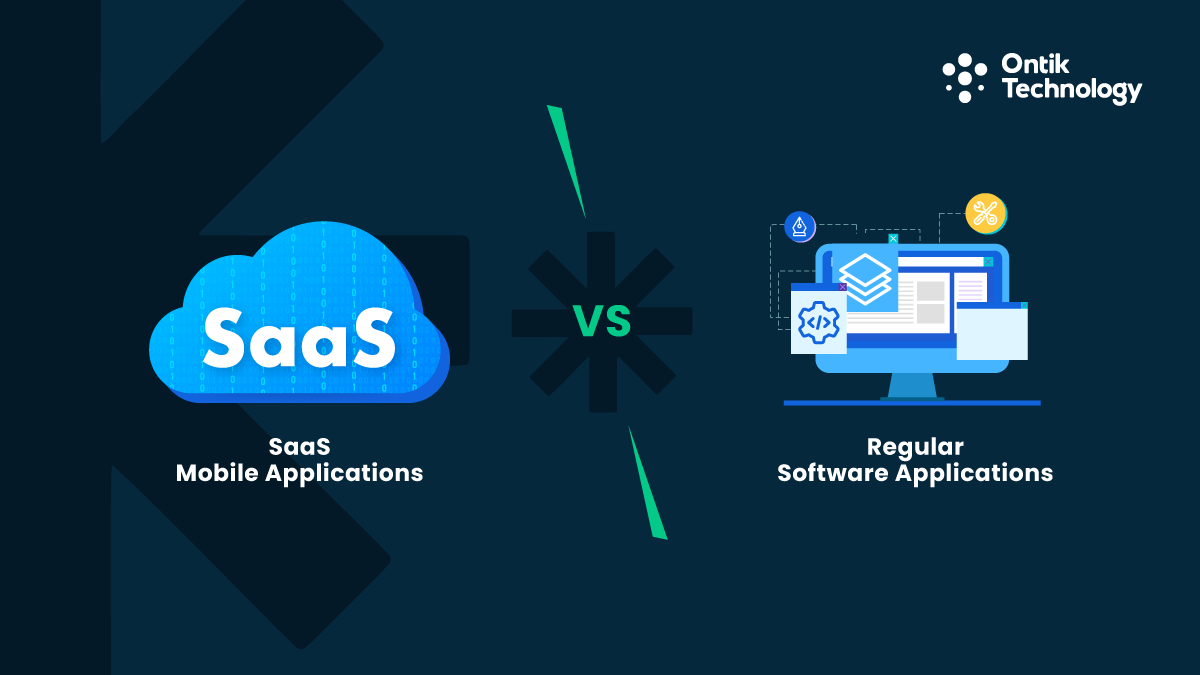
If you are one of those, who is tired of installing bulky and heavy apps on your mobile devices which takes a lot of space then SaaS mobile applications are the right fit for you. They don’t come with heavy licensing fees and can be accessed from any device using the cloud server.
A regular software application lives on your computer or phone. You buy it once, download it, and hope it works for years. The problem? Updates are slow, data security depends on the user, and scaling is a nightmare. Imagine running a retail chain with hundreds of employees. Installing the same tool on every device is time-consuming and expensive.
Now compare that with a saas mobile app. The software lives in the cloud. Updates roll out instantly. If you need 5 users today and 500 tomorrow, you scale in minutes. This is the core advantage of the saas model; flexibility without extra hardware or IT staff.
The Saas application development process is also different. Traditional apps need long release cycles and manual upgrades. A saas app can be updated weekly or even daily. For users, it feels like the software just keeps improving in the background. For developers, it means less downtime and better control over bugs.
Take Zoom as an example. Ten years ago, video calls meant using Skype, installing updates, and hoping the app wouldn’t crash. Today, Zoom is a saas mobile application. You install it once, and everything else runs from the cloud. Updates happen in the background. New features appear overnight. It works on both web and mobile without effort.
For businesses, the choice is simple. A software as a service solution means you pay a subscription and avoid the pain of ownership. Regular software requires tedious manual installs, safety concerns and a high purchase cost.
That is the reason why SaaS Mobile Applications are being opted by fast-moving industries such as Finance, Healthcare, e-commerce etc. It is fast, stable and designed for the way that people work now; on the go, from any device, at any time.
Why SaaS Mobile Applications Are Growing Worldwide
By now you should have a proper idea about why the demand for Saas mobile applications is growing at such a vast rate. In this section, we will go deep down to break the key reasons behind this sudden popularity of saas mobile app.
Design and Customization
Why it’s so popular: Flexibility is a big part of the story. Custom SaaS development allows enterprises to build apps that suit them perfectly. SaaS app design to payment system integrations, businesses are given custom tools. That’s why you’re seeing more B2B SaaS apps enter the market, particularly in industries like logistics, healthcare, and retail.
Market Confidence
Corporates are also more positive about SaaS due to improved data security and compliance. It will handle responses and store them in the provider's database which can be compliant with regulations such as GDPR or HIPAA. This makes SaaS Mobile Applications secure for sensitive data, bank details as well as all patient records.
Why Businesses Choose SaaS
The benefits are clear. A saas solution cuts costs and speeds up delivery. Companies don’t need to build everything from scratch. They subscribe, log in, and start using. For developers, saas application development means faster updates and fewer technical barriers. For businesses, it means staying competitive.
Key Features of Successful SaaS Mobile Applications
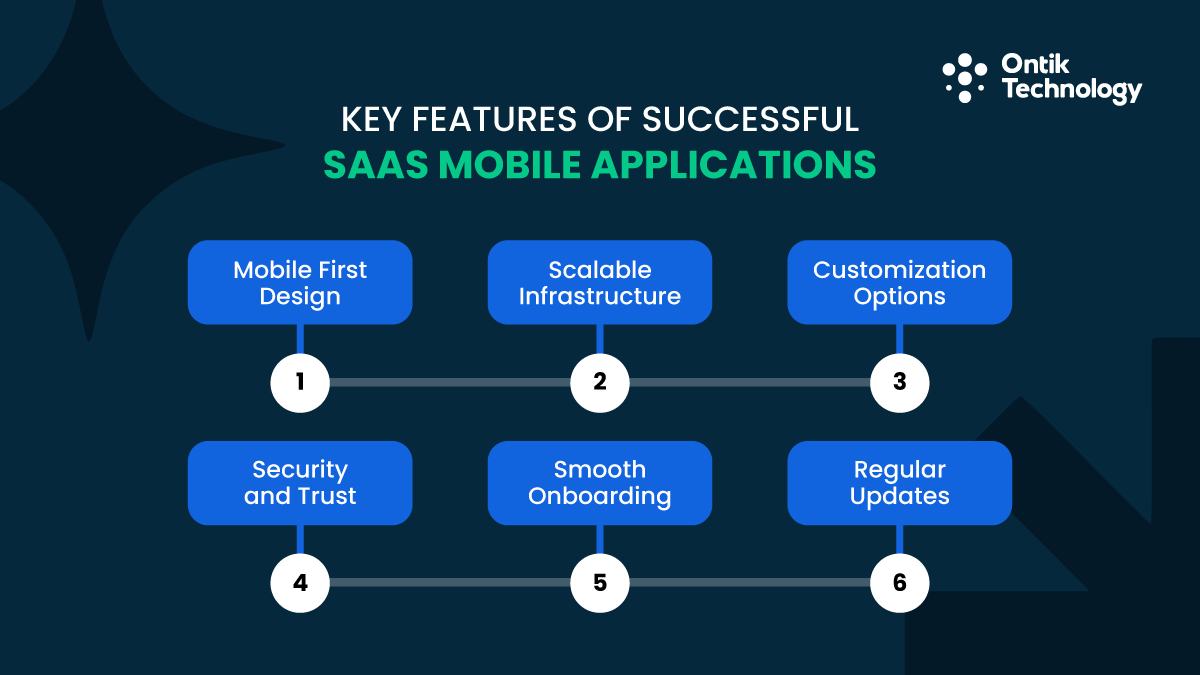
Whether you need B2B SaaS apps or ECommerce SaaS, every SaaS mobile app is not perfect and hence it is important to know about the right features you need to look for while selecting one for your enterprise.
1. Mobile-First Design
A saas mobile app must feel natural on a phone. Layouts, buttons, and speed matter more here than on desktop. That’s why SaaS app design now focuses on mobile-first principles like offline support, push notifications, and quick loading.
2. Scalable Infrastructure
For instance, a saas application may start with 100 users and then boom it could jump to 10k overnight. Successful apps prepare with cloud-native systems that expand without downtime. Ontik Technology, recognized as one of the top SaaS app development companies, has built global apps that handle such scale with ease.
3. Customization Options
Custom SaaS App adopts into your various workflows; keeping users engaged. Adaptability in every aspect like CRM integrations to custom dashboards. To offer you a custom-made feature, numerous enterprises choose to work with Custom SaaS Development Partners like Ontik.
4. Security and Trust
Companies won’t commit to a tool if security feels weak. Strong encryption, role-based access, and compliance (GDPR, HIPAA) are must-haves. Apps like Zoom and Dropbox scaled faster after improving their security.
5. Smooth Onboarding
The first few minutes of any app is crucial, this is where the user decides whether he stays or not. Apps like Slack and Notion prove how simple signup, clear tutorials, and smart defaults reduce friction. In SaaS, onboarding is not optional; it’s critical.
6. Regular Updates
SaaS apps cannot be static like traditional software. They release updates for bug fixes, new features, and performance improvements regularly: A successful saas mobile application rolls out regular updates. By following this rhythm the user stays happy and wants to come back.
The Role of Vibe Coding in SaaS Mobile App Development
Vibe coding is changing how developers build SaaS Mobile Applications. Instead of spending months writing complex code, teams use vibe coding tools to speed up the process. The result is a saas mobile app that’s faster to launch and easier to update.
Real Use in SaaS
Vibe coding is about speed, and for SaaS founders that means faster minimal viable products (MVPs) You then build a prototype version, you test it with some actual end users and based on feedback, you improve your service. This reduces the risk and cost involved in development. Hence, some of the well known Vibe coding apps were born this way.
Why Vibe Coding Works
Startups love it because it removes long development cycles. With vibe coding software, you can design, test, and roll out features in weeks instead of months. Many call it lovable vibe coding because it makes the whole process less stressful and more creative.
AI and Vibe Coding
Vibe Coding Gets Even Stronger With AI. The best AI fx 0or vibe coding assists with auto-complete, bug alert and writing small portions of the code. This speeds up SaaS build processes and prevents human error. Some tools combine AI with a vibe coding website editor so non-technical founders can join the process too.
Mobile-First Advantage
The strength of vibe coding mobile app development is speed on smaller devices. It helps developers build smooth navigation, push notifications, and mobile-friendly layouts without starting from scratch. It also ensures a saas mobile application looks and feels consistent across Android, iOS, and web.
Trend to Watch
Vibe coding has been considered the future for much of Saas application development. This allows solo or small team developers to compete with larger companies. This dominance of SaaS is only going to increase with the growing demand, which will make vibe coding an essential element for survival.
Can a Solo Developer Build a SaaS App?
Previously people used to think only a SaaS app development company can build a SaaS app. But in reality it is not true, even a solo developer can develop a SaaS app and perform SaaS app management. With the right tools and skills, developing SaaS Mobile Applications is possible.
The Main Challenges
Let's be honest, developing a SaaS application is not an easy task. . A saas application needs more than just coding. You need cloud hosting, payment systems, data security, and customer support. Building all of that alone is tough. Many solo projects fail because developers underestimate the workload.
How Is This Possible?
Things are changing. With vibe coding apps and modern application development platforms, one developer can build and launch faster than ever before. In this case most of the heavy lifting is done by cloud services like AWS, Firebase, Stripe etc. So this means a person can focus on saas application design & user-experience and outsource the back-end to these platforms.
Real Examples
Plenty of successful SaaS development companies started with one developer. Indie hackers often launch a custom SaaS app to solve a small problem, then scale over time. Tools for saas app management like automated billing and customer dashboards that make it easier to grow without a big team.
So to answer in short, yes, a solo developer can build a SaaS app. But success depends on focus. Start small, validate with users, and expand step by step. A saas mobile application requires careful planning, but with today’s tools, one motivated developer can go surprisingly far.
SaaS Mobile Applications in Different Industries
SaaS mobile applications don't only work for startups or smaller companies, Due to their flexibility, they can be used in almost any large industries that too by keeping the costs under control.
Finance
Banks and fintech companies use saas applications because they are fast, secure, and meet strict rules. Mobile SaaS tools run wallets, fraud checks, and lending apps. Services like Stripe and PayPal follow the software as a service model to handle billions of safe transactions.
Retail and E-commerce
Retailers have relied on SaaS mobile applications for aspects of retail business operations like inventory management, sales reporting, and customer loyalty programs. Shopify is a SaaS platform that allows small businesses to operate a full eCommerce store on their phone and put the retailer in control. The mobile app enables sellers to edit product features, track orders, and view sales and analytics whenever they want to.
Education
Online learning was the way to go during the Covid-19 pandemic, and this was just the start for online education. SaaS was uniquely positioned to dominate the sector. Google Classroom and Zoom are SaaS Mobile Applications that enable teachers and students to connect with immediacy. A SaaS Mobile Application for education typically involves pre-recorded video classes, digital tests, and cloud storage for any assignments.
Healthcare
In healthcare, SaaS Mobile Applications give patients access to digital health records, appointment scheduling, and telemedicine. A custom SaaS app can also connect with medical devices to share real-time data. Compliance with HIPAA and GDPR makes security a top priority here.
Logistics and Transportation
SaaS is also used by supply chain companies to track shipments, manage fleets and even predict delays. For instance, a custom SaaS development for logistics could involve real-time GPS tracking and AI-driven route planning. Managers can keep an eye on the operation on the go with a mobile interface.
We can see a similar pattern in each of these industries: the switch from what they were using previously to the SaaS Mobile Applications. The reasons for this change are simple; lower costs, faster updates and scaling capabilities. SaaS fits businesses needs today, and allowing them to be mobile as hospitals, banks and online stores to name a few, did not happen without the excess and older systems.
SaaS Mobile Applications Market Statistics
We have already discussed everything you need to know about SaaS applications, but now let’s discuss some numbers which will help you understand more about the efficiency of SaaS mobile applications.
Adoption Numbers
The average company now uses over 110 different SaaS apps for daily operations. Out of these, nearly half are mobile-friendly. A saas mobile app is often the first choice for teams in sales, customer service, and operations, since employees need access on the go.
Industry Spending
● With over $50 billion spent on SaaS solutions every year, financial services and banking have made significant investments in mobile services such as payments and digital wallets.
● Healthcare SaaS is growing at a blistering 20% CAGR as a result of telemedicine and health record applications.
● E-commerce companies are also spending heavily on SaaS tools, with carpet and rolls of products from SaaS mobile applications that are Shopify and BigCommerce.
Global Trends
● North America still leads SaaS adoption, but Asia-Pacific shows the fastest growth, adding millions of new users each year.
● By 2030, analysts predict SaaS will represent over 70% of all software spending worldwide, with SaaS Mobile Applications taking a significant share.
Mobile vs Web
In 2015, most SaaS apps were built for the web first. Now, more than 65% of SaaS Website Design Agency and SaaS application development projects start with a mobile-first approach. This shows the shift in user behavior, customers want instant access through their phones, not just desktops.
Choosing the Right SaaS App Development Company
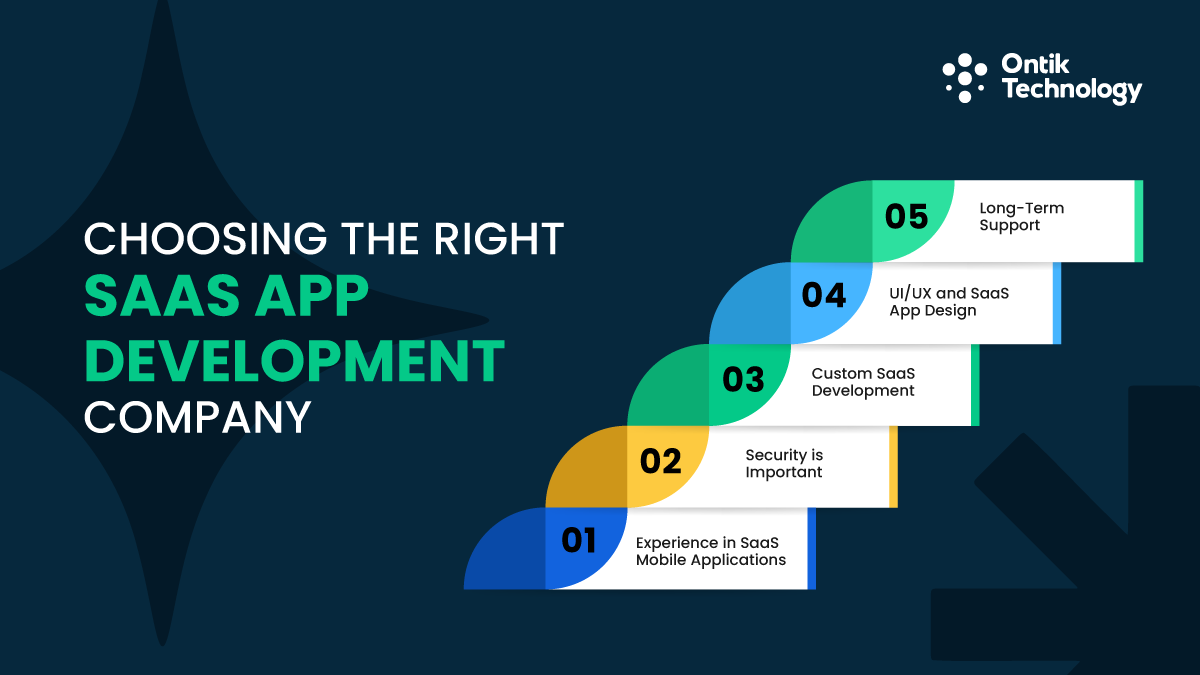
Building a saas mobile app is not just about coding. It requires design, security, scalability, and constant updates. That’s why choosing the right SaaS app development company is one of the most important steps for any business.
What to Look For
● Experience in SaaS Mobile Applications - The firm's experience should not be limited to just standard mobile app builds, but rather SaaS apps built on a cloud-based platform.
● Security is Important - A saas application will handle sensitive data. So, make sure you choose a firm with enough experience in compliance (GDPR, HIPAA, PCI DSS).
● Custom SaaS Development - Each business is different and will have different requirements. A good developer should provide custom SaaS app solutions, not generic templates. So, they should be experienced enough for custom SaaS app development.
● UI/UX and SaaS App Design - It doesn't matter how great the app is, if the interface is clunky or confusing users are not going to use it. You want a developer whose focus is on user-friendly design and a smooth onboarding process.
● Long-Term Support - SaaS is not a "set once and forget it" scenario. To maximize your chances of success, ongoing support for updates and saas app management is a necessity.
Why Ontik Technology Stands Out
Among the many options, Ontik Technology has built a global reputation as one of the best SaaS app development companies. It is a well known SaaS app development company. They specialize in custom SaaS development, creating scalable apps for industries like finance, healthcare, and education. And they do it all in a way that combines innovation with excellent application development services, which lands them smack on top of any business list who needs scalable reliability.
Conclusion
This incredible rise of SaaS Mobile Applications trends reflects just how fast business tech continues to evolve. Startups and enterprises depend on them for speed, safety and expansion. So, a saas mobile app is a must have. Old software models are fading. Software as a service tools are always up to date, will run on any device, and will scale to your demand.
They are used by both companies and developers, because they help in reducing costs, and saves time. Looking ahead, innovations like vibe coding, AI, and custom SaaS apps will push this shift even further. In the global market, those investing in SaaS Mobile Applications today will shape the success of tomorrow.
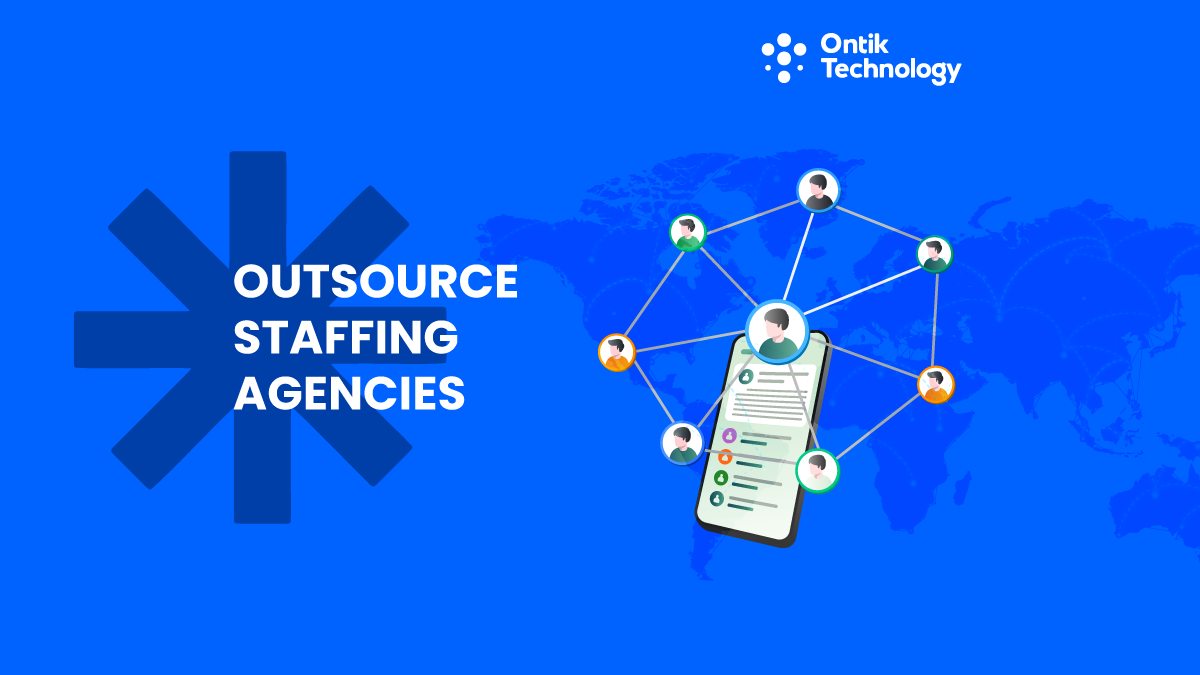
As we head into 2025, the global tech industry is growing faster than ever, and so is the need for skilled IT professionals. But hiring full-time developers or engineers can be slow and expensive. That’s why many businesses are turning to smart solutions like outsource staffing agencies. These partners help companies scale quickly, tap into global talent pools, and stay agile without the heavy costs or long hiring timelines. It’s an efficient way to meet demands and stay competitive in today’s fast paced digital world.
Today, remote work, digital growth, and short-term projects have made IT staff augmentation more than just a trend it’s now essential. Whether you're running a startup or leading a big company, working with an outsourced staffing agency lets you quickly add skilled professionals to your team. You don’t have to deal with the stress of long-term hiring. Instead, you can scale up fast, adapt to market changes, and stay focused on your business goals.
Top 15 Best Outsource Staffing Agencies
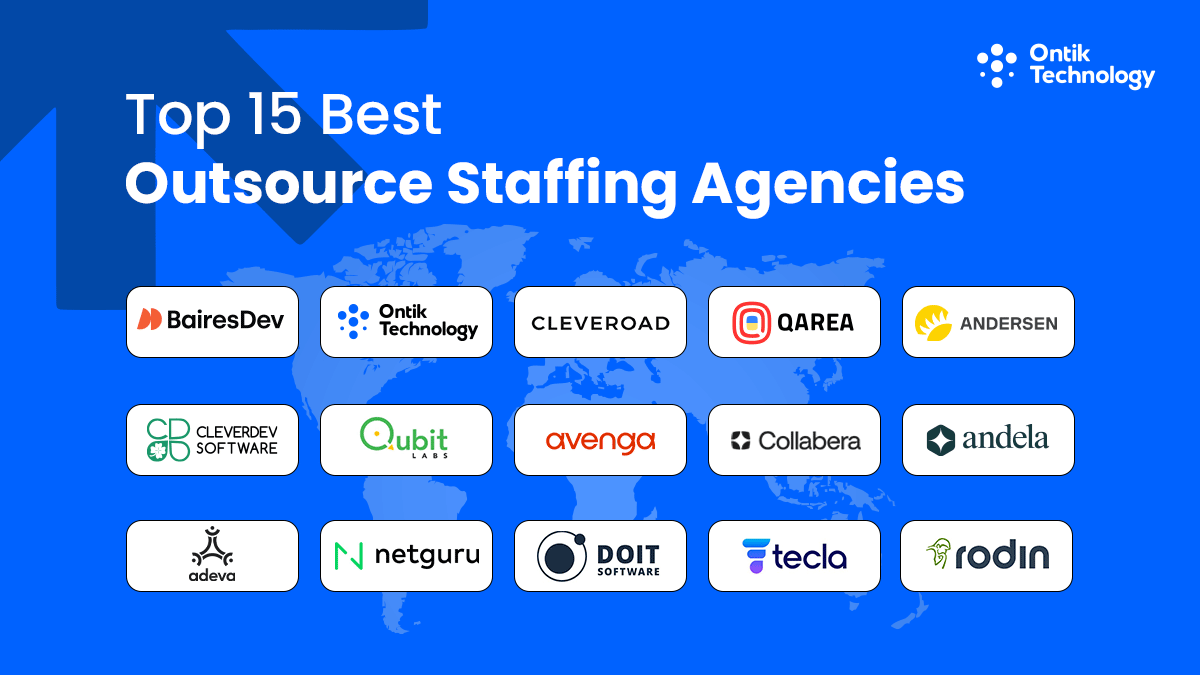
Before going into the details, let’s have a short glimpse at the Outsource Staffing Agency with their score strength to their pricing through this quick table. So here the list of of top 15 Outsource Staffing companies:
BairesDev
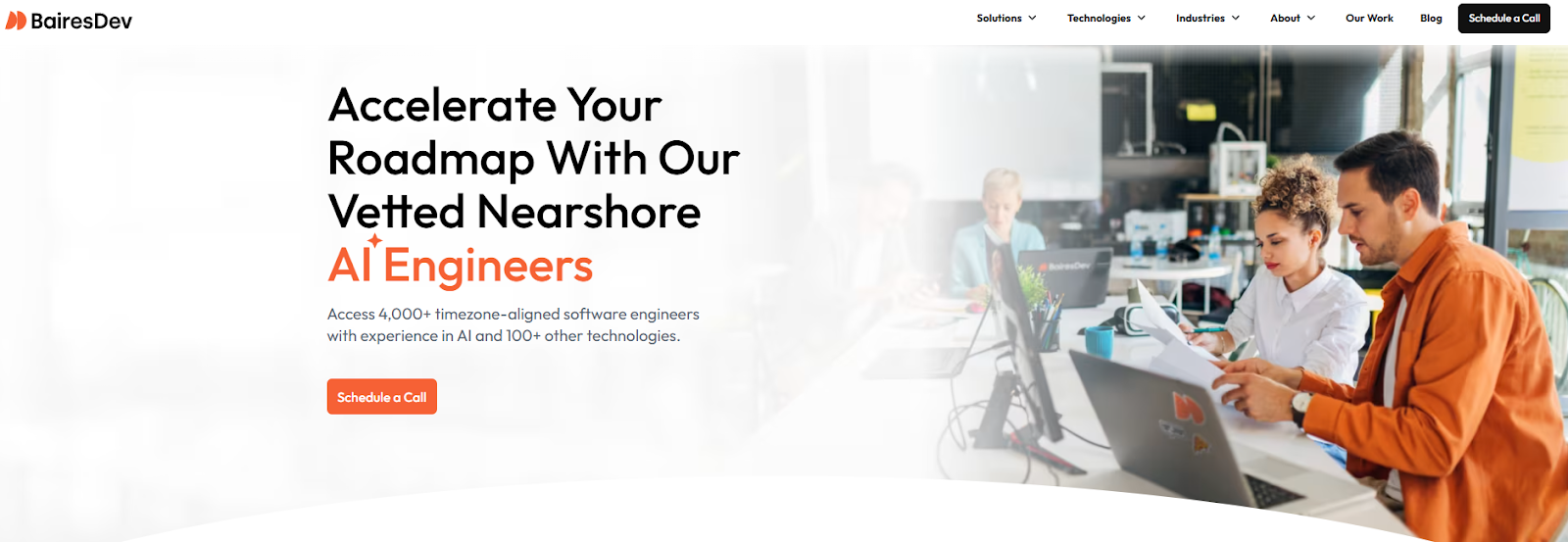
Website: https://www.bairesdev.com/
Category: Custom Software Development, IT Staff Augmentation
BairesDev is a globally recognized outsource staffing agency and one of the top IT staffing companies in the Americas. With a talent pool of 1,500+ vetted engineers, they deliver world-class solutions to Fortune 500s and growing enterprises. Their vast experience and strong client portfolio make them a go-to choice for companies seeking scalable and reliable staffing services. They offer an outstanding blend of technical excellence with a deep understanding of business needs. This ensures each project drives measurable impact. From specialized expertise to end-to-end development teams, BairesDev meets each client's unique requirements with precision and agility.
Core Services
- IT staff augmentation company solutions
- Custom software development
- Cloud & AI-based transformation
- Scalable dev teams and delivery centers
Who They Help
Trusted by industries like finance, healthcare, and e-commerce, BairesDev offers outsourced staffing solutions to enterprises seeking digital acceleration.
Why BairesDev Stands Out
- Hourly rates: $50–99/hr; Projects from $25K+
- Trusted by brands like Google, Rolls Royce & J&J
- Strong vetting and recruitment process
- Fast deployment of outsourced talent
- Multi timezone remote staffing services
Recognition
- 4.9 Google Rating
- Ranked among the best IT staff augmentation companies globally
- Recognized by Clutch and GoodFirms
Ontik Technology
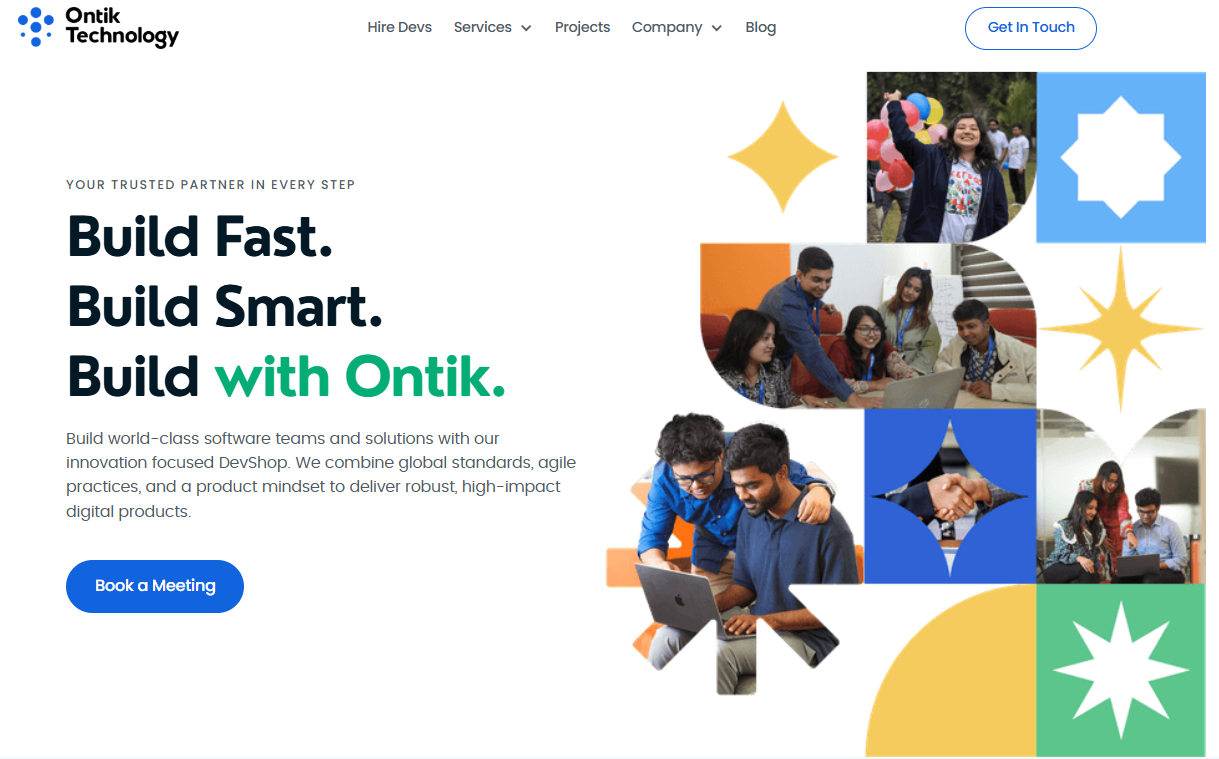
Website: https://ontiktechnology.com/
Category: Custom Software, MVP Design, AI/ML Services, Mobile App design & Development
Ontik Technology stands out as a highly capable staffing outsourcing services company with a strong reputation for developer quality and reliability. As a leading staff augmentation company, Ontik delivers flexible, cost-effective, and performance-driven development teams. With over 220+ successful projects, they’re trusted for outsourcing staffing solutions that go beyond code, they deliver results. They excel on their agile approach which ensures seamless integration with client teams. Thus accelerating delivery without compromising quality. Whether it's a startup or a global enterprise, Ontik fulfills diverse business needs with precision and commitment.
Core Services
- Dedicated dev teams
- MVP prototyping & scaling
- AI/ML app development
- UI/UX consulting
- Web & mobile Applications development
Who They Help
Ontik serves funded startups, fintech ventures, and fast scaling enterprises that require dependable remote staffing solutions tailored to real business needs.
Why Ontik Technology Stands Out
- 220+ projects delivered on time & on budget
- Developer-first hiring with multi-level technical screening
- Certified engineers (Scrum, AWS, GCP, Flutter)
- $25–50/hr rates; Minimum project size $10K
- Agile execution with sprint based delivery
- ISO-compliant security & IP protocols
Developer Credibility Highlights
- Strong in-house development team skilled in full-cycle product delivery
- Dedicated product development team focused on scalable architecture and clean code
- MVP development team experienced in rapid prototyping and market validation
- Specialized AI and ML team building smart, data driven applications
- Cross-functional units blending design, engineering, and strategy for optimal results
- Real-time collaboration with clients via Jira, Slack, GitLab
Recognition
- 4.6 Google Rating
- Featured in top Asian outsourced recruiting solutions lists
- Known for blending innovation with execution speed
- Preferred staffing partner by accelerators and tech incubators
Cleveroad
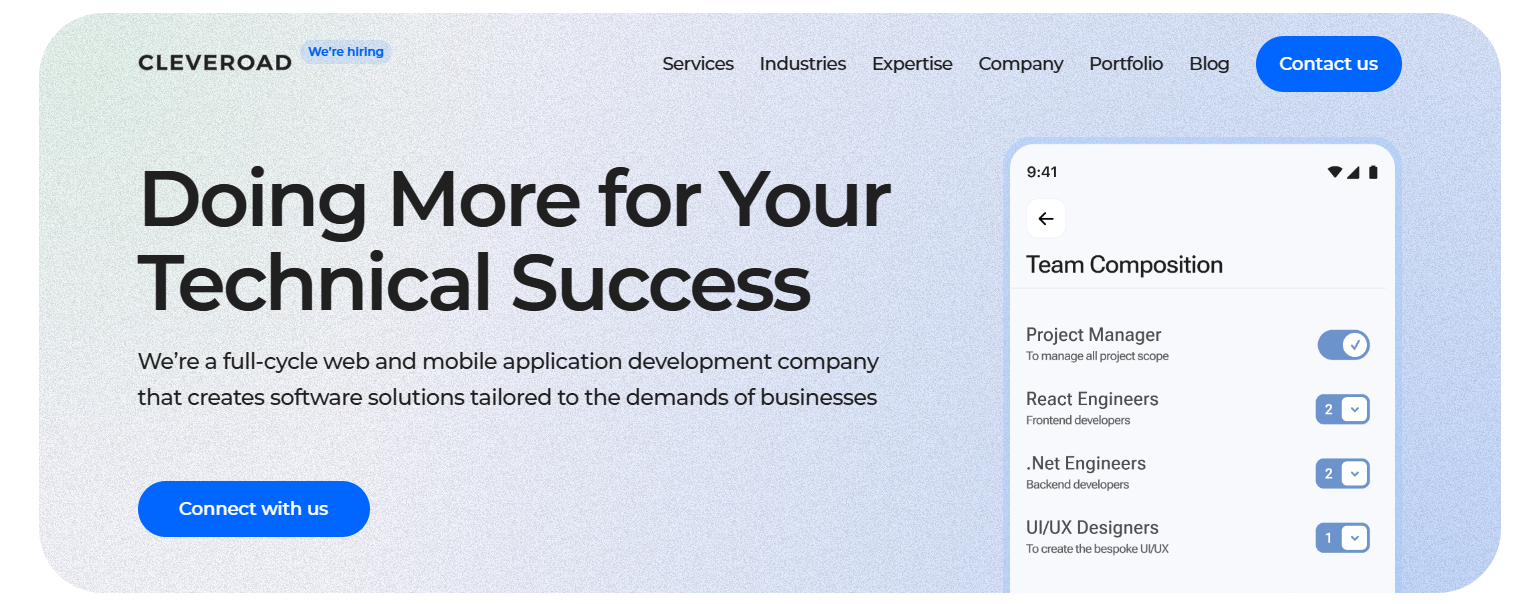
Website: https://www.cleveroad.com/
Category: Web & Mobile Apps, UI/UX, IoT, AR/VR
Cleveroad is a forward-thinking outsourcing staffing services company that builds digital experiences powered by user-first design and engineering precision. As one of the top IT staffing agencies, they excel in bridging the gap between vision and execution for growing brands and enterprises. They take pride in their multidisciplinary teams capable of bringing innovation, speed, and scalability to every project. This ensures that business goals are met with measurable success. Cleveroad has a client-centric approach, transforming complex challenges into seamless, high-performing digital solutions.
Core Services
- Cross-platform web & app development
- UI/UX design systems and audits
- IoT & immersive tech (AR/VR) solutions
- Product discovery & agile team setups
Who They Help
Retail, healthcare, and fintech clients value Cleveroad’s seamless onboarding and agile staff outsourcing capabilities. Whether scaling an MVP or launching a global app, their hybrid team structure adapts easily to evolving staffing needs.
Why Cleveroad Stands Out
- $25–49/hr; Projects from $10K+
- Agile, user-centered delivery processes
- Multi-industry expertise with strong design focus
- Reliable remote staffing company with European engineering base
Recognition
- 4.8 Google Rating
- Named among the Best Remote Staffing Companies in Eastern Europe
Recognized for excellence in mobile staffing solutions and UI/UX innovation
Qarea
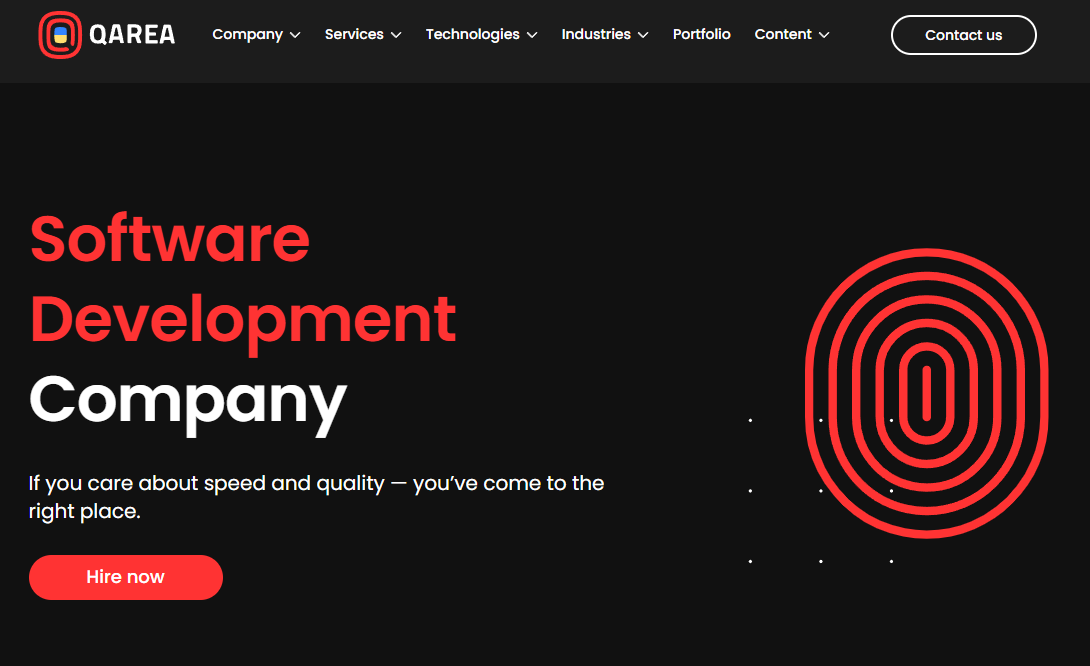
Website: https://qarea.com/
Category: Custom Software, QA, DevOps, Offshore Staffing
Qarea is a reliable offshore staffing agency and IT staff augmentation company offering flexible development models for global clients. With expertise in custom software, QA, DevOps, and dedicated development teams, they cater to startups and enterprises alike. They thrive on their commitment to transparency and efficiency. That’s how they maintain long-term partnerships which are built on trust and results.
Core Services
- Software QA and automation
- DevOps and cloud engineering
- Dedicated remote development teams
- Web and mobile application development
Who They Help
Media, finance, and eCommerce businesses benefit most from Qarea’s reliable remote staffing services. Their commitment to quality assurance and flexible engagement makes them ideal for clients needing scalable staffing solutions.
Why Qarea Stands Out
- Strong Eastern European presence
- Projects starting from $5K
- Hourly pricing from $25–49/hr
- Global delivery model with agile teams
- Trusted by leading mid-size brands
Recognition
- 4.7 Google Rating
- Recognized among remote staffing industry leaders
- Known for secure outsourced staffing solutions
Andersen Lab
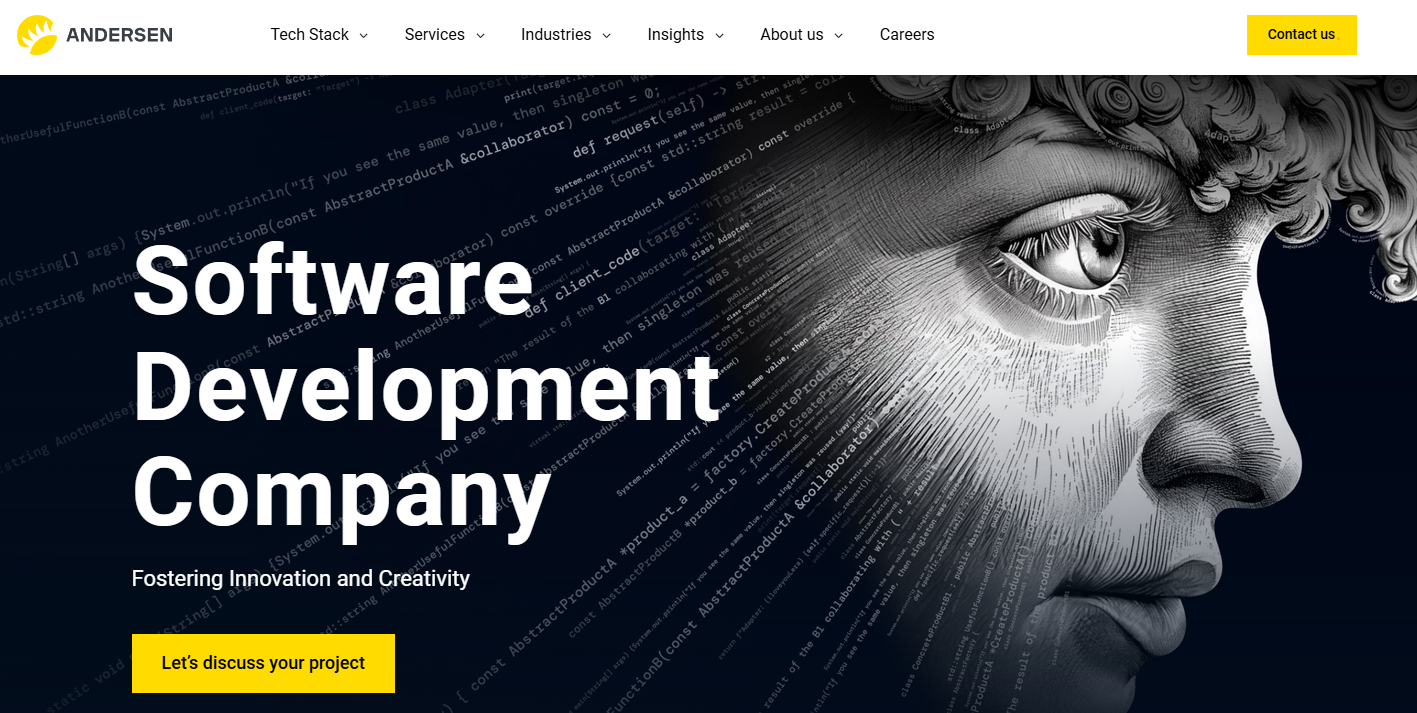
Website: https://andersenlab.com/
Category: Enterprise-level Software, AI, ML, Big Data
Andersen Lab is a globally recognized outsource staffing agency and top IT staffing company delivering enterprise-grade AI, ML, and data engineering services. With robust security and deep tech expertise, they help clients modernize infrastructure and scale faster. Their solutions give businesses the space to innovate confidently. And this is a huge advantage in a rapidly evolving digital landscape.
Core Services
- Enterprise software engineering
- AI/ML development
- Big Data platforms
- Cloud-native DevOps
Who They Help
Healthcare, logistics, and finance leaders seeking enterprise transformation. Ideal for long-term outsourced talent and complex digital products.
Why Andersen Lab Stands Out
- Hourly rates from $50–99/hr; Projects from $50K+
- Highly scalable project capacity
- World class recruitment process for developers
- Strong presence in Europe and North America
Recognition
- 4.9 Google Rating
- Listed as a Best IT Staff Augmentation Company by industry analysts
Cleverdev Software
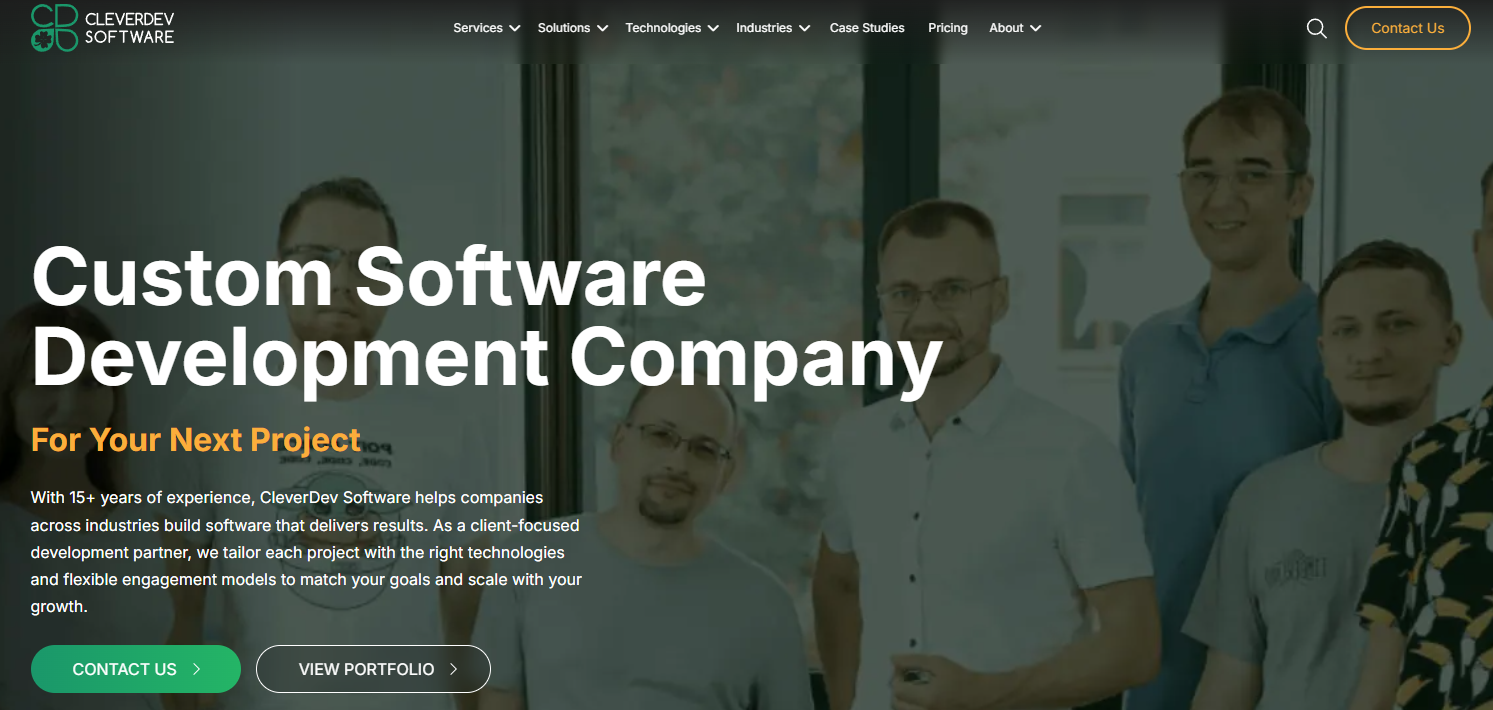
Website: https://cleverdevsoftware.com/
Category: Healthcare Software, FinTech, EHR Systems
Cleverdev Software is a specialized IT support staffing agency and remote staffing company catering to regulated industries. Their focus on healthcare and fintech makes them one of the best IT staffing agencies for domain-driven development. So, when they combine technical precision with strict compliance, they naturally meet the highest industry standards.
Core Services
- EHR and healthcare system development
- FinTech platforms
- HIPAA-compliant applications
- Cloud integrations
Who They Help
Healthcare providers, insurers, and fintech innovators in need of staff outsourcing services and secure technology platforms.
Why Cleverdev Stands Out
- Pricing from $50–99/hr; Projects from $25K+
- Regulatory knowledge + tech excellence
- Strong internal hr team and compliance expertise
Recognition
- 4.8 Google Rating
- Known for outsourced recruiting solutions in healthcare
Qubit-Labs
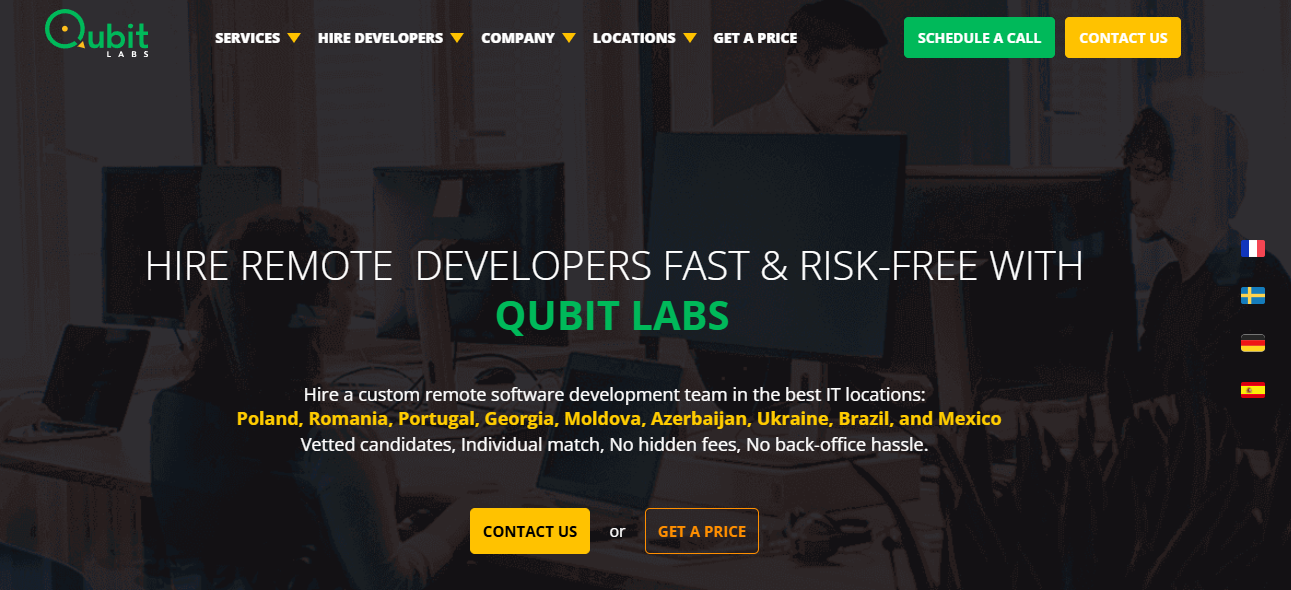
Website: https://qubit-labs.com/
Category: Remote Development, IT Staffing
Qubit-Labs is a trusted remote IT staffing and staffing outsourcing services company with global reach. They build dedicated offshore teams tailored to exact staffing needs. Comes with flexible hiring models that ensure cost efficiency without sacrificing quality. Clients who are focused on long-term collaboration, Qubit-Labs can become a seamless extension for them.
Core Services
- Dedicated developers
- Remote IT teams for startups and SMEs
- Tech stack consulting
Who They Help
Tech startups and SMEs seeking to outsource staff for front-end, back-end, or full-stack projects.
Why Qubit-Labs Stands Out
- Project pricing based on needs (starting at $25/hr)
- Global sourcing strategy
- Smooth recruiting services and onboarding
Recognition
- 4.6 Google Rating
- Widely regarded as Top Staff Solutions Provider
Avenga

Website: https://www.avenga.com/
Category: Outsource Staffing, Cloud, Engineering
Avenga is a leading staff augmentation company with strengths in digital transformation and enterprise cloud adoption. They help scale operations via outsourced staffing services. Their work approach combines technical expertise with industry-specific insights, capable of delivering solutions that drive sustainable growth. They have a global talent network that ensures agility and speed in meeting evolving business demands.
Core Services
- Outsourced software teams
- Cloud engineering
- Digital transformation strategy
Who They Help
Automotive, finance, and insurance industries needing high-volume staffing and recruiting support.
Why Avenga Stands Out
- $50–99/hr; Projects from $50K+
- Fast time to delivery
- Known for secure staff outsourcing solutions
Recognition
- 4.7 Google Rating
- Trusted outsource agency for large digital builds
Collabera

Website: https://www.collabera.com/
Category: Staffing, Managed Services
Collabera is one of the big staffing agencies known for contract staffing, tech solutions, and managed workforce deployments. Their U.S. and APAC presence enables fast workforce solutions globally. While focusing on innovation and talent development, they equip businesses with the skills needed to stay competitive. To ensure tailored solutions they have a client-first approach that aligns with unique business goals.
Core Services
- Contract and temporary staffing
- Tech team outsourcing
- R&D support services
Who They Help
Enterprises and financial institutions looking for external staffing or in-house staffing vs outsourcing strategies.
Why Collabera Stands Out
- $25–50/hr, custom project pricing
- Decades of experience in large-scale delivery
- Compliance-ready hiring models
Recognition
- 4.5 Google Rating
- Regarded as a staffing partner by Fortune 500s
Andela
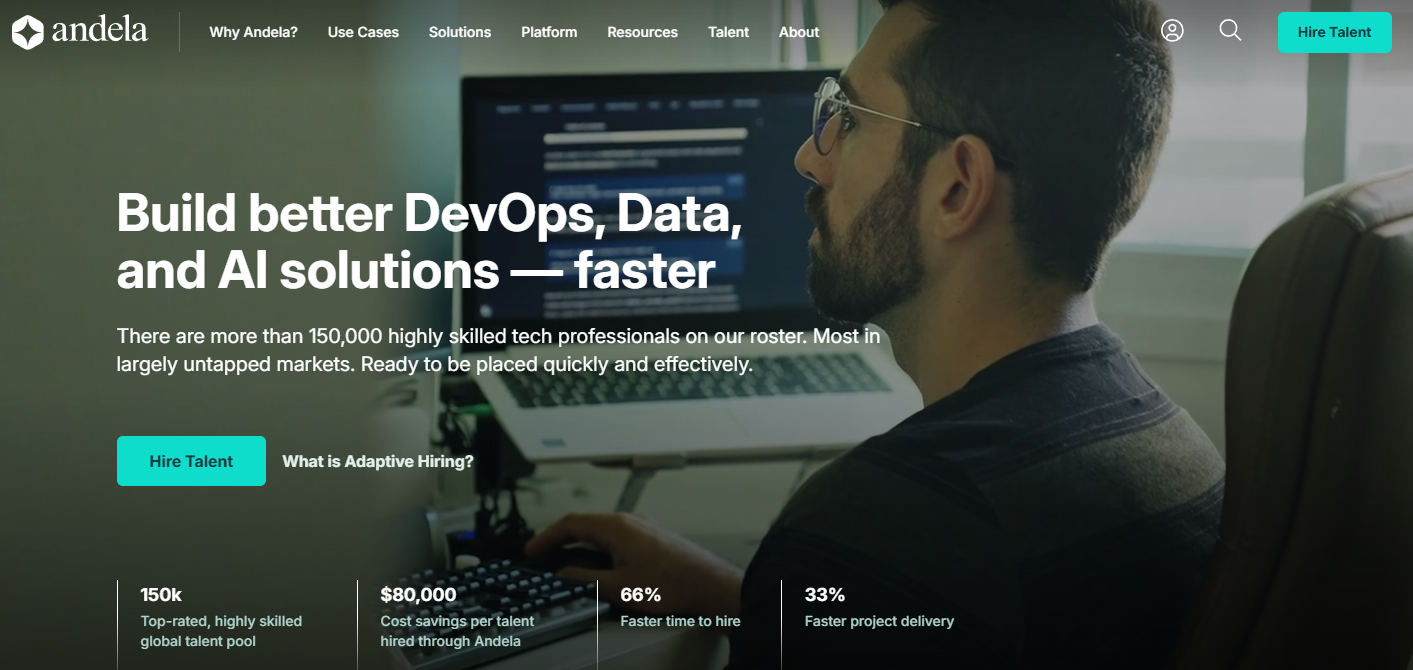
Website: https://andela.com/
Category: Remote Engineering, Talent Vetting
Andela connects top talent from emerging markets with global tech firms. As a remote staffing company, their fully vetted developers are deployed for agile product delivery. Matching the right expertise to the right project to ensure maximum impact is one of their best offerings. They focus on diversity and inclusion to drive innovation across industries.
Core Services
- Remote engineering teams
- Staff augmentation
- Agile delivery support
Who They Help
Tech startups, scaleups, and product companies needing rapid staffing services.
Why Andela Stands Out
- $50–99/hr; Projects from $25K+
- Vetted engineers with specialized experience
- High retention & engagement rates
Recognition
- 4.8 Google Rating
- A global leader in outsourcing staffing solutions
Adeva
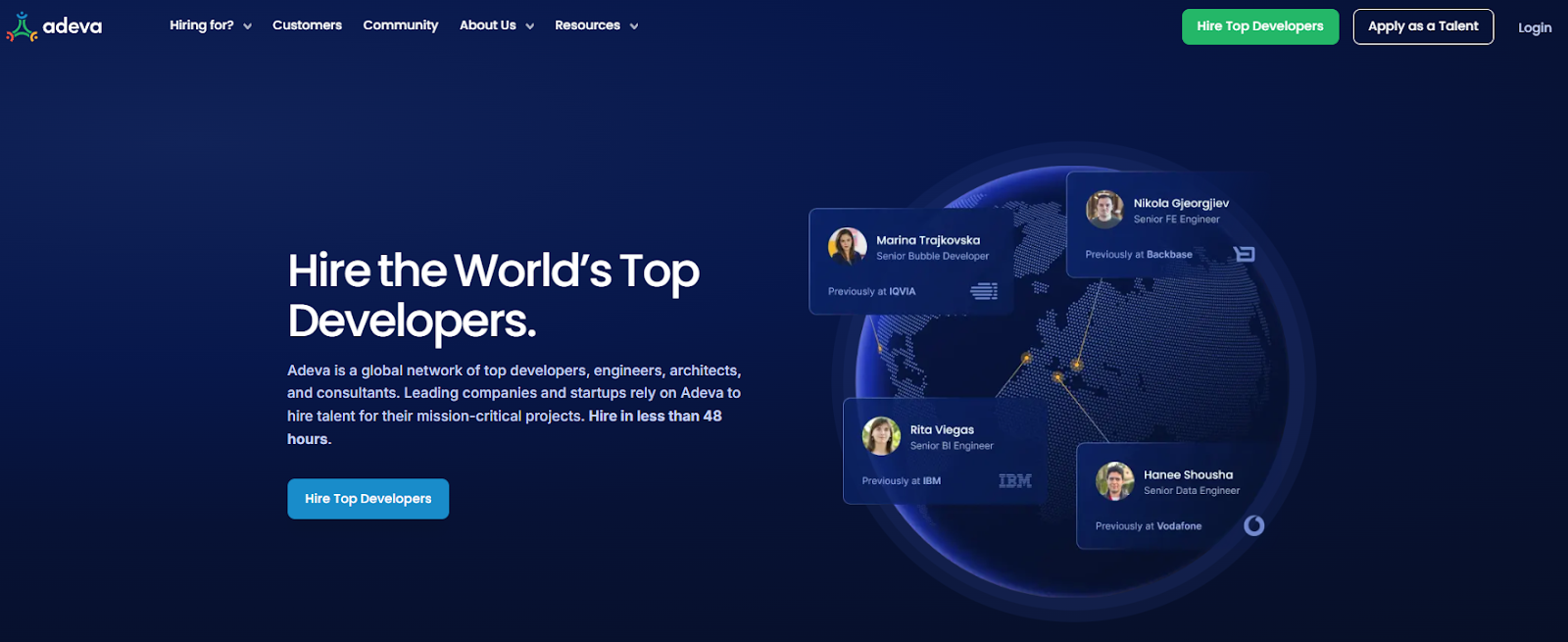
Website: https://adevait.com/
Category: Team Augmentation, Startup-Focused Solutions
Adeva offers access to elite global tech talent through their outsource recruitment agency model. Their approach is ideal for startups needing fast team scaling. By combining rigorous vetting with flexible engagement models they ensure the right fit for every project. Adeva’s teams rely on seamless integration, helping businesses accelerate delivery and achieve measurable results.
Core Services
- Remote team augmentation
- Tech recruitment for startups
- SaaS product support
Who They Help
SaaS companies, startups, and agile enterprises seeking quick staffing process setup.
Why Adeva Stands Out
- $40–80/hr; Projects from $10K+
- Quick deployment of temporary or full-time staff
- Flexible onboarding & budget options
Recognition
- 4.7 Google Rating
- Featured in global lists of Best Remote Staffing Companies
Netguru

Website: https://www.netguru.com/
Category: Product Design, Full-Stack Development
Netguru is a top IT staffing agency that blends product thinking with engineering scalability. Their creative culture supports design-centric builds for modern companies. Their methods include leveraging cross-functional teams to deliver innovative solutions that drive business growth. And with a global talent network, Netguru ensures agility and expertise for every project.
Core Services
- Full-stack development
- UI/UX design
- Product ideation and consulting
Who They Help
Retail, finance, education sectors requiring outsourced staffing with a creative edge.
Why Netguru Stands Out
- $50–99/hr; Projects from $25K+
- Human-centered design principles
- Delivery of high-end digital products
Recognition
- 4.9 Google Rating
- Recognized for top staff solutions in creative development
DOIT Software
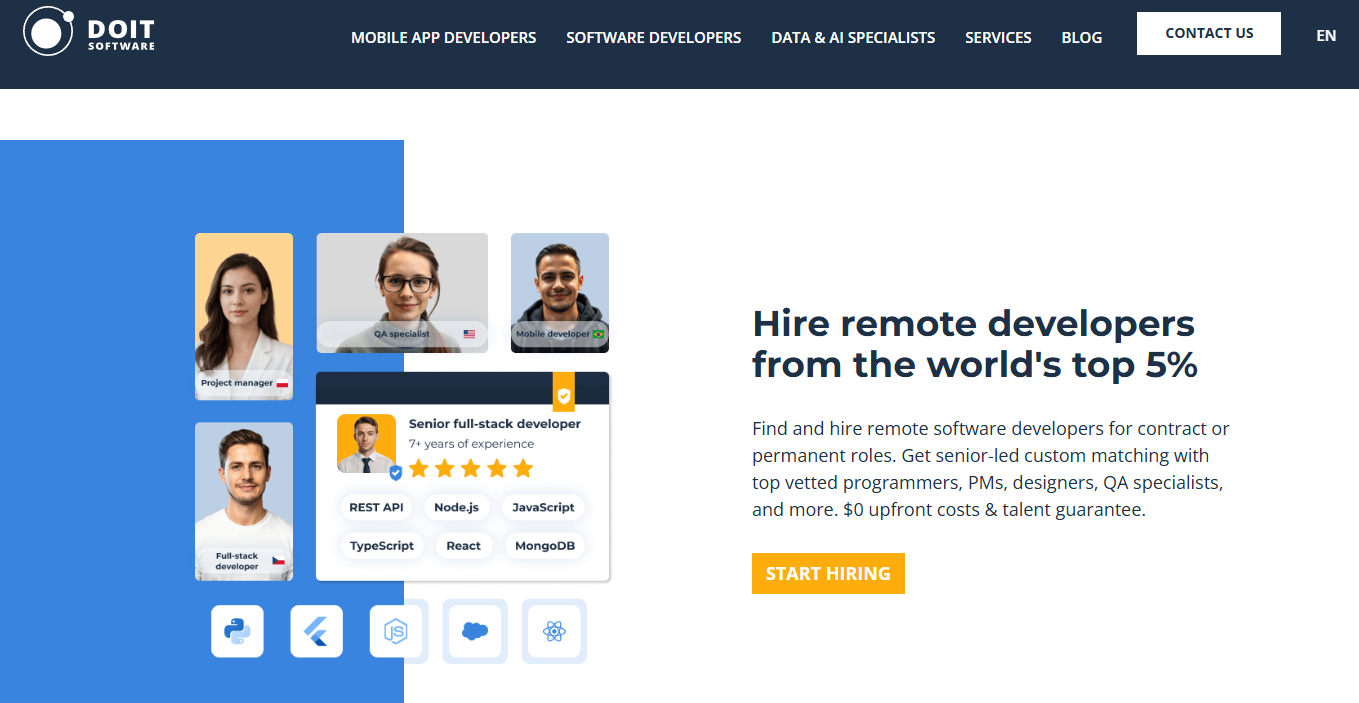
Website: https://doit.software/
Category: Team Augmentation, MVP Development
DOIT Software is a staffing firm that offers specialized team setups for MVPs and product pilots. Their lean engagement style supports quick launches. Their flexible, scalable teams are tailored to meet the needs of evolving projects. DOIT Software helps its clients bring their products to market faster by focusing on efficiency and quality.
Core Services
- MVP design & launch
- Dedicated development teams
- Product scaling support
Who They Help
Startups, retail, and healthcare companies with iterative product goals.
Why DOIT Software Stands Out
- $25–49/hr; Projects from $10K+
- Agile and transparent development
- Flexible team sizes & duration
Recognition
- 4.6 Google Rating
- Known for outsourcing staffing services for startup MVPs
TECLA
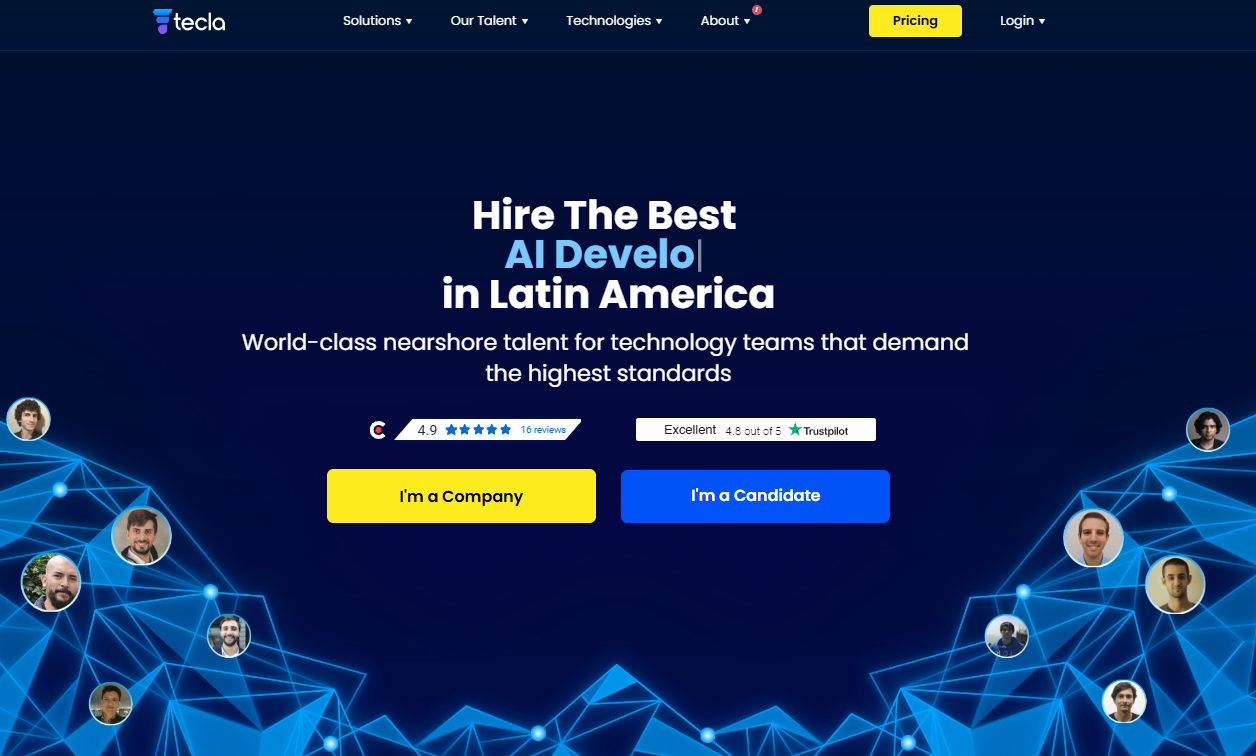
Website: https://tecla.io/
Category: Tech Talent Marketplace, Remote IT Staffing
TECLA is a vetted remote staffing services platform offering outsourced recruitment services to connect Latin American tech talent with global firms. Top-tier developers are matched with the right projects through rigorous screening. TECLA helps companies scale teams quickly and maintain high performance standards with flexible engagement models.
Core Services
- Tech talent sourcing
- Remote IT team placements
- Nearshore outsourcing support
Who They Help
SaaS companies and startups in North America and Europe looking for outsourced staffing services.
Why TECLA Stands Out
- $40–80/hr; Projects from $15K+
- Fast, regional hiring model
- Reliable cultural and time zone fit
Recognition
- 4.7 Google Rating
- Regarded for staffing allows flexible, remote growth
Rodin AU

Website: https://rodin.com.au/
Category: Enterprise Software, Staff Augmentation
Rodin AU is a reputable Australian IT staff augmentation company that offers scalable enterprise solutions through outsourcing staff models. In order to meet complex business requirements, they provide highly skilled teams. By focusing on efficiency and reliability, Rodin AU helps clients accelerate their growth.
Core Services
- Custom enterprise software
- Technical staff augmentation
- System modernization services
Who They Help
Finance, health, logistics enterprises seeking local and offshore outsource staffing solutions.
Why Rodin AU Stands Out
- $50–99/hr; Projects from $25K+
- Deep integration with enterprise ecosystems
- Trusted by leading Australian firms
Recognition
- 4.8 Google Rating
- Recognized for strategic staffing outsourcing in ANZ
Are Staffing Agencies Worth It?
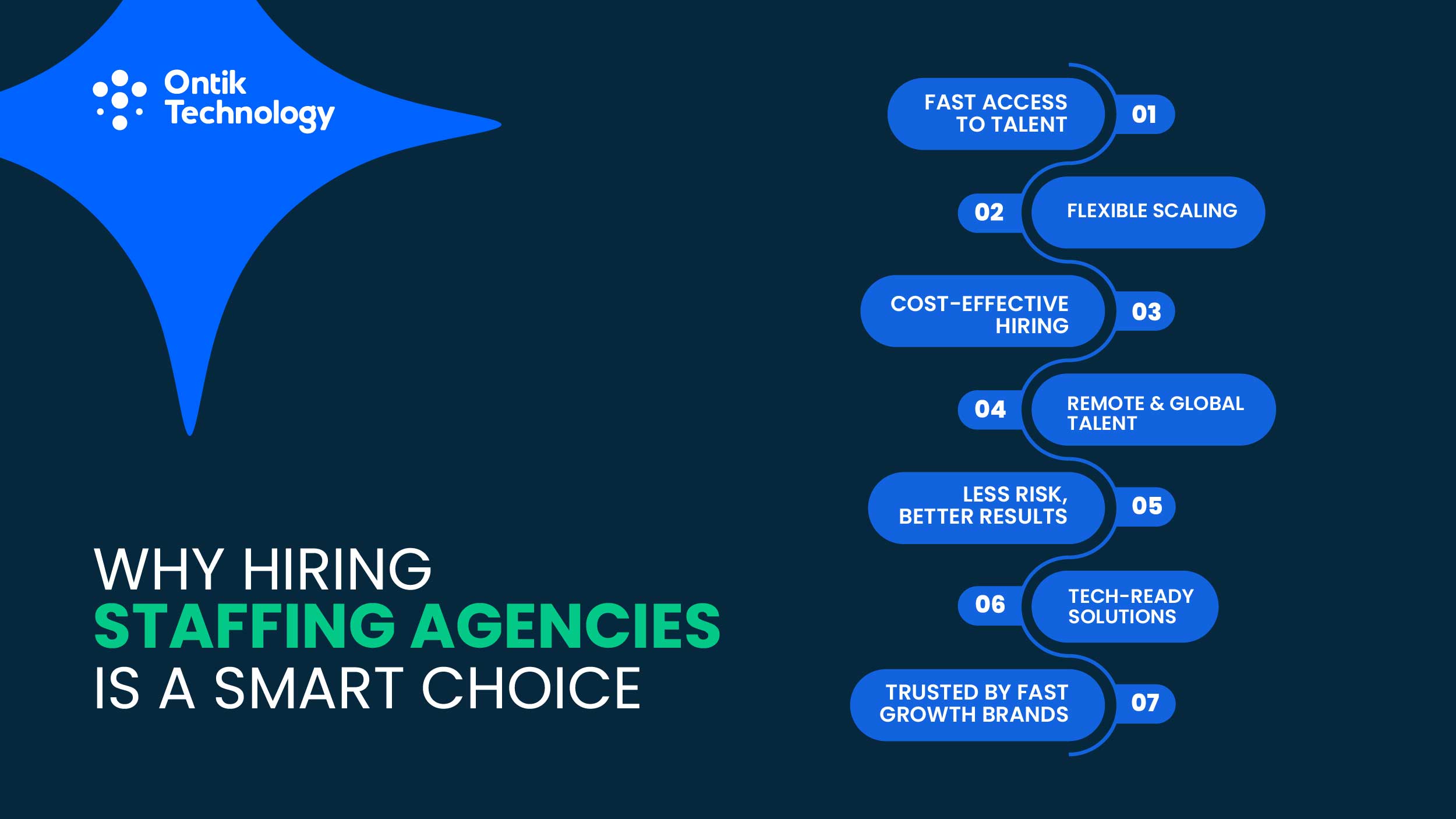
The simple answer is Yes, hire staffing is worth it. Here's Why:
- Fast Access to Talent
An Outsource Staffing Agency helps you hire skilled professionals quickly no long hiring cycles. - Flexible Scaling
A top IT staff augmentation company lets you scale your team on-demand, perfect for startups or agile projects. - Cost-Effective Hiring
Cut costs on recruitment and overhead with outsourced staffing solutions and reliable offshore staffing services. - Remote & Global Talent
Tap into remote staffing services, offshore staffing agencies, and remote IT staffing for global expansion without the office. - Less Risk, Better Results
Outsourced recruiting solutions provide pre-vetted, high-performing talent—risk-free, with fast replacements if needed. - Tech-Ready Solutions
Whether it's mobile staffing solutions or data outsourcing services, agencies offer custom fit tech support fast. - Trusted by Fast-Growth Brands
Top IT staffing agencies are the backbone of many scaling companies needing speed, skill, and flexibility.
Why Your Company Should Outsource Staffing and Recruitment
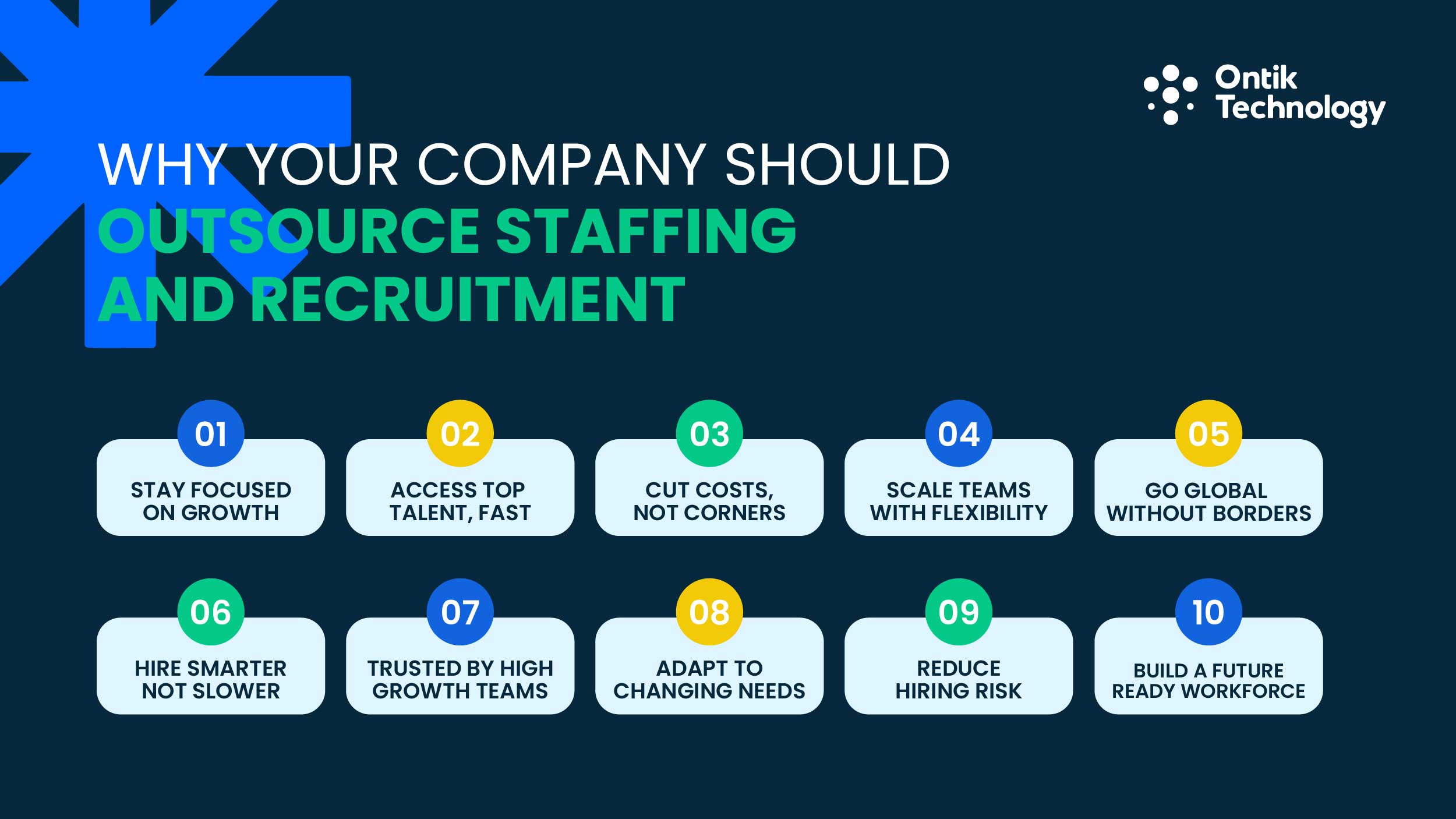
- Stay Focused on Growth
Managing recruitment in-house takes time, resources, and attention. By using an outsource staffing agency, you stay focused on your core business—while experts handle hiring. - Access Top Talent, Fast
IT staff augmentation companies and remote staffing companies offer access to pre-vetted talent across the globe. No delays. No guesswork. Just the right skills, right when you need them. - Cut Costs, Not Corners
Traditional hiring is expensive. Outsourced staffing solutions reduce costs tied to job ads, interviews, onboarding, and HR infrastructure—while maintaining high standards. - Scale Teams with Flexibility
Whether it’s a short-term project or long-term support, staffing outsourcing services allow you to scale up or down without contracts tying you down. Agile teams, on demand. - Go Global Without Borders
With a trusted offshore staffing agency, you can hire remote talent anywhere—no need for physical offices or complex setups. You get global reach with local insight. - Hire Smarter, Not Slower
Outsourced recruitment services come with streamlined hiring processes—technical screening, cultural fit checks, and fast onboarding—so you hire faster, with confidence. - Trusted by High-Growth Teams
From SaaS startups to enterprise tech, top IT staffing agencies are behind some of the world’s fastest growing companies. They know what great hiring looks like. - Adapt to Changing Needs
Whether launching a new product, entering new markets, or handling peak demand, strategic staffing outsourcing gives you flexible support that fits your business flow. - Reduce Hiring Risk
With outsourced recruitment solutions, you're protected—thanks to trial periods, quality guarantees, and legal compliance handled by the agency. - Build a Future-Ready Workforce
Working with a leading staff augmentation company means you’re not just filling roles you’re building a high performing team ready to meet future challenges.
Why Ontik Technology Is the Best Outsource Staffing Agency
- Skilled Developers with a Proven Track Record
Ontik’s developer teams are carefully selected through a 3-layer technical process, ensuring every engineer is project ready from day one. Their talent pool includes React, Flutter, Node.js, Python, and AI/ML specialists—each with hands-on experience in real-world projects, not just code tests. - Over 220+ Successful Projects Delivered Globally
From agile MVPs to enterprise systems, Ontik has completed 220+ software development projects for startups, fintechs, and global brands. This experience translates into reliability, speed, and deep technical know how across industries. - Real Staff Augmentation Success Stories
Ontik has helped fintech startups scale their platforms with dedicated full-stack teams, supported AI-driven analytics tools for healthcare, and deployed remote teams for SaaS companies needing fast releases—delivering on time and within budget. - Developer-First Mindset, Client-Driven Results
At Ontik, engineers are more than coders—they’re product thinkers. Their remote staffing solutions don’t just fill roles; they embed committed team members who understand product lifecycles, business goals, and agile workflows. - Flexible, Transparent Partnership Model
Ontik’s staff augmentation services are built on clarity—hourly rates from $25–$50, sprint based delivery, and scalable team structures. Whether you need one developer or an entire cross-functional team, the model grows with your needs. - Global Reliability, Local Sensibility
As a South Asia–based leading staff augmentation company, Ontik balances global quality standards with local affordability. Their offshore staffing model offers 24/7 development cycles and seamless integration with your in-house team. - Partnership That Pays Off
Companies partnering with Ontik aren’t just outsourcing—they’re building futureproof teams. With ISO-aligned security, agile delivery, and a collaborative approach, Ontik becomes a true extension of your business, not just a vendor.
Final Thoughts
In 2025, IT staff augmentation is no longer just a quick fix it’s a smart way for businesses to grow faster. By working with skilled IT staff augmentation companies, companies can quickly bring in expert developers from around the world. This helps them build products faster, stay on schedule, and still keep full control of their projects. Whether you need extra help for a few months or want to grow your team long-term, staff augmentation lets you stay flexible without going over budget or lowering quality. It’s a win-win for smart, modern teams.
Outsourcing staffing and recruitment is not just efficient, it's essential in today’s fast-paced world. Whether you need remote developers, IT support, or project teams, partnering with a reliable outsource staffing solution gives you the speed, quality, and flexibility to grow with confidence.
Ontik Technology combines world-class talent, hands-on experience, and flexible delivery to be the best outsource staffing agency for businesses that want fast, reliable, and scalable development support.
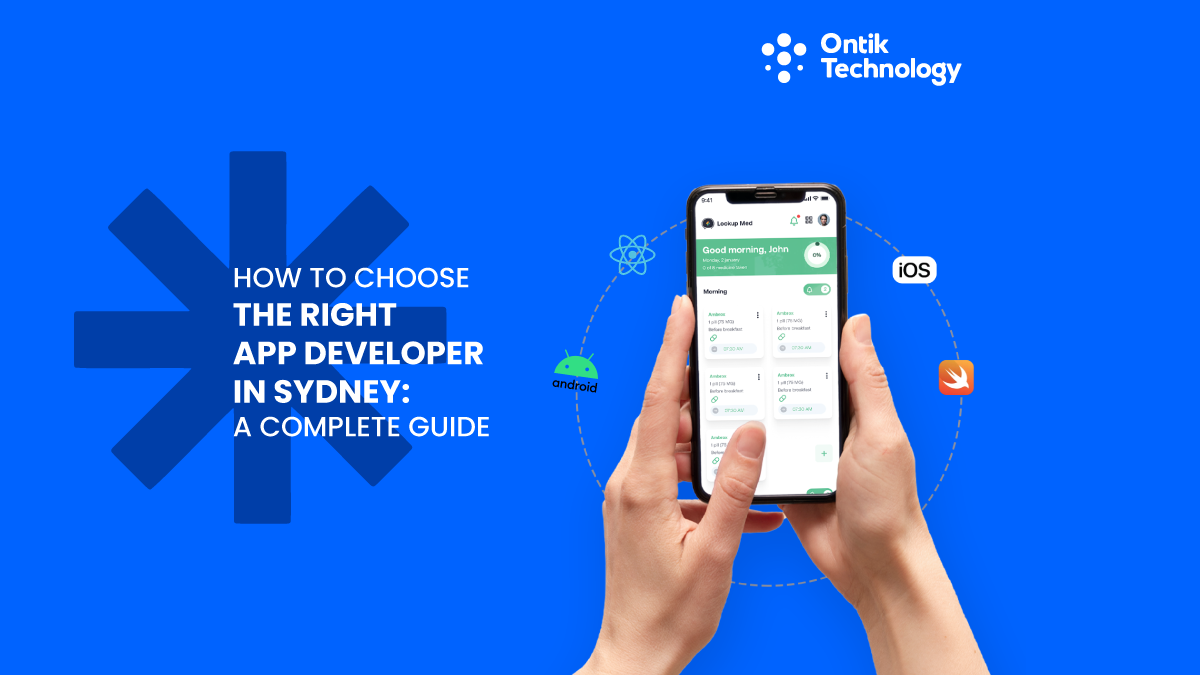

Key Takeaways
- The Australian mobile app market will reach $2.28 billion by 2025, creating massive opportunities
- App development costs in Sydney range from AUD $25,000 for basic apps to over AUD $300,000 for complex projects
- Choose developers with proven track records in your industry - companies like PixelForce have generated over $1.5 billion in client revenue
- Local Sydney app developers understand Australian privacy laws and market needs better than offshore teams
- Agile development methodologies reduce time-to-market and catch issues early
- Post-launch maintenance costs 15-20% of initial development annually
- Timeline for app development ranges from 6 weeks for MVPs to 6 months for full-featured apps
- Most Sydney agencies charge between AUD $100-$150 per hour
You have a great app idea, and now you want to work with the best app developers in Sydney to make it real. The problem is that choosing the right app development company is more important than you might think.
In today's world where people use their phones constantly, this choice will decide if your idea becomes successful or gets forgotten. This is why getting it right matters so much. More people in Australia and Sydney are using mobile apps every day, so you need quality development work. Whether you run a new startup or work for a big company, choosing skilled expert app developers in Sydney means getting custom mobile apps that actually help your business grow.
This comprehensive breakdown gives you the inside track on selecting the perfect development partner for your app development project with complete confidence.
Why Choosing the Right Mobile App Development Company is Crucial?
The mobile app development partner you pick today will affect your business for many years ahead. That's why this choice needs your full attention and careful thinking. First, let's look at the numbers. The Australian mobile app market is growing fast. By 2025, it should reach $2.28 billion in revenue. This shows just how big the opportunity is for businesses that get their apps right.
What's more, certain areas are doing especially well. For example, fintech apps are changing how people handle money. Digital wallet use jumped 44% in early 2025. The fintech sector now has over 800 companies managing $150 billion in transactions. At the same time, healthcare is also going digital. About 90% of healthcare leaders plan to use more digital technology in their work.
This means both fintech and healthcare businesses need great app developers more than ever. Many Sydney app developers specialize in diverse industries including healthcare, fintech, retail, education, logistics, and government sectors. Because of all this growth and change, choosing the right development partner has become even more important for your success.
It's More Than Just Code - You're Picking a Business Partner
Finding the right team for your mobile app development services is one of the most important steps for your project. You're not just hiring someone to write code—you need a partner who will work with you through the exciting and challenging process of turning your app idea into something people love to use.
When it comes to mobile app developers in Sydney, they can really make or break your project. Choosing the right team is like finding great teammates who will support you when challenges come up and celebrate your successes with you. Strong communication, collaboration, and problem-solving abilities are critical for smooth project execution.
But if you screw this up and choose badly, man, you're in for it. You risk budget overruns, missed timelines, and compromised quality. Deadlines that just keep moving further away, and the kind of headaches that make you want to throw your laptop out the window.
Your App Is Your Digital Shopfront
Your mobile application is often the first real interaction customers have with your brand. When someone downloads your app and it crashes on its first use, or they can't figure out how to do something basic, they're gone. And they're probably not coming back.
The critical takeaway is: Research shows that if users have a bad experience, most won't give you a second chance. Your app developer needs to nail both the technical stuff and the user experience. A smooth, intuitive mobile app builds trust and keeps people engaged through strong user engagement strategies. A buggy, confusing one? That's a direct path to customer attrition.
Also, to see how the top mobile app development companies in the USA are tackling these challenges, check out this detailed breakdown.
The Real Cost of Getting It Wrong
Let's talk about money for a minute. Choosing the wrong mobile app developer in Sydney can seriously hurt your wallet. There's nothing worse than having to rebuild something because the first attempt was a disaster.
Here's something that might surprise you: fixing problems after your app goes live costs exponentially more than catching them early. That's why working with a solid app development company Sydney team matters. They use proven approaches like Agile development to catch issues before they become expensive problems.
That said, good developers are upfront about the app development cost from day one. App development costs in Sydney typically range from AUD $25,000 for basic apps to over AUD $300,000 for complex projects. MVPs for startups can land closer to AUD $40,000, while enterprise-grade apps can push into the six-figure territory. No unexpected expenses, no hidden fees, just honest projections that help you plan your custom software investment properly.
Why Going Local Makes Sense
There's tangible advantages in working with people who understand the Australian market. Local application developers Sydney know how Aussies use their phones, what they expect from apps, and what drives user engagement.
Sydney app developers know the Australian market well. Android has over half the market share here. Meanwhile, iOS and Android platforms both perform well with certain groups of users. When you build apps for people in Australia, this knowledge really helps your success. Sydney's app development industry is characterized by strong local expertise in various verticals, influenced by the unique business ecosystem of the region.
This matters whether your needs are big or small. You might need a developer using React Native or Flutter for cross-platform apps to build a quick startup MVP. Or you might be a large company working on complex application development. Either way, choosing expert app developers in Sydney who know the local market gives you a clear advantage.
The facts speak for themselves. Choosing a cheap development partner is too risky for your business. Instead, pick your partner carefully. This smart choice will help your project succeed for years in Australia's busy digital market.
6 Key Factors to Evaluate When Choosing a Mobile App Developer
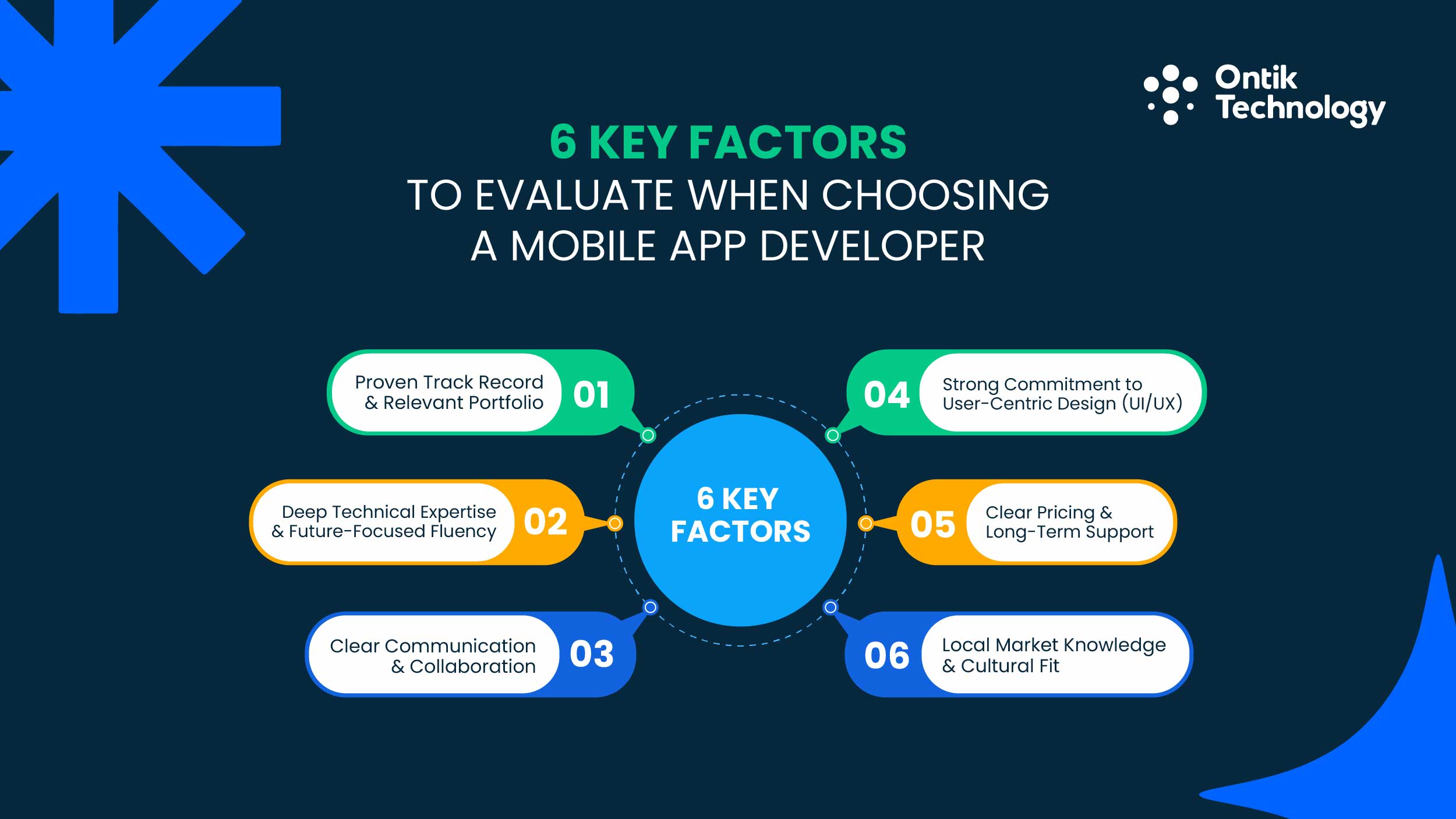
Trying to pick the right mobile app development companies in Sydney can feel overwhelming. Your app development project is only going to be as good as the people you team up with, and you need way more than smooth-talking sales pitches.
You've got to dig deeper when you're checking out app developers in Sydney. There are some real deal-breakers you need to watch out for if you want to find the best mobile app development team that'll deliver.
I'm going to walk you through six things that matter most—this stuff will help you cut through all the marketing fluff and find an app developer who can actually make your app vision happen. Also, if you're thinking about going overseas, there's a solid guide on offshore mobile application development that covers what you're getting into.
Here are the six key factors to evaluate when choosing an application development company in Sydney:
1. A Proven Track Record and a Relevant Portfolio
A company's portfolio is its resume - the most direct evidence of its capabilities. Don't be swayed by slick designs alone; dig deeper to assess the quality and relevance of their past work. An award-winning app development agency will showcase not just what they built, but the problems they solve.
Assess Industry Expertise: Look for expert app developers in Sydney who have experience in your industry. Companies like PixelForce have spent over a decade transforming ambitious ideas from Sydney startups and enterprises into market-leading mobile applications. If you're building a fintech mobile app or healthcare software development apps, a partner with a proven track record of securing financial and healthcare app solutions is invaluable.
Clients should review developers' portfolios and case studies to assess quality and experience with similar projects. Whether you need business app developers Sydney or a talented team experienced in consumer-facing mobile apps, their past work should align with your goals.
Check for Measurable Success: Don't be afraid to ask for case studies with performance metrics. A study by Clutch found that 72% of businesses attribute app success to the right development team. Look at companies like PixelForce, which has generated over $1.5 billion in combined client revenue, or TekRevol with its 85% user retention rate and over $100 million raised in client funding. Appetiser has helped clients achieve valuations of $10 million with their prototypes.
Ask how their custom mobile apps in Sydney have impacted clients' businesses. Look for evidence of increased user engagement, revenue growth, or operational efficiency that demonstrates client success.
Test Their Apps: If possible, download and use the mobile applications in their portfolio. Is the user experience intuitive? Is the performance smooth and bug-free? This first-hand experience is an excellent quality check on the work of any mobile app developer in Sydney.
2. Deep Technical Expertise and Future-Focused Fluency
Look, the software development and tech stack that underpins your app idea is more than simply dull technical stuff; it determines whether your app functions, remains secure, and can grow alongside you. Your app developer must have deep technical expertise in modern frameworks, rather than just talking the talk.
Platform Know-How: Developers should be skilled in relevant technologies such as Swift or Objective-C for native iOS, and Kotlin or Java for Android app development. These guys should have solid experience building for both iOS and Android platforms. Don't just take their word for it. Ask them about actual iOS and Android development projects they've done.
Experienced developers use cross-platform frameworks like Flutter and React Native for cost-effective and efficient simultaneous iOS and Android app development. Also check if they're skilled in hybrid app development for apps that work on both platforms, and get their honest take on what's best for what you're building.
Built to Grow: A decent app isn't just about today, it's about what happens when you get popular. Your development team has to build your web and mobile app so it doesn't fall over when more people start using it or you want to add new features later. Creating apps with scalability in mind ensures seamless integration as your business expands.
Keeping Things Safe: Here in the Australian market, you can't mess around with people's data. Make sure these developers actually understand security and know the Australian Privacy Principles inside out when they're building your custom software solutions. Sydney app developers ensure full compliance with Australian privacy laws such as the Privacy Act 1988, and they follow data privacy laws while implementing security measures and security updates to protect user data.
3. Clear Communication and Working Together
You're getting a collaborator for the entirety of your mobile application development process, not just someone to create code. Your app development agency should keep you updated at every stage of the development process, so it feels like a collaborative build.
How They Work Matters: Find a company that actually uses Agile development methodologies, not just claims to. App developers in Sydney utilize agile development to enhance collaboration and efficiency throughout the app development process. This way of working means you can make changes as you go and give feedback regularly through a structured process, so you don't end up with something you hate. It's honestly one of the smartest tips for hiring app developers Sydney you'll get.
Clarity is Key: The team should explain technical concepts in simple terms. You should feel comfortable asking questions and confident that you understand the project's progress. Effective mobile consulting services are a green flag. Effective communication and collaboration are vital throughout the app development process to ensure project success.
Project Management: Ask what project management tools (like Jira or Trello) they use to track progress and facilitate communication. Strong project management skills indicate a structured and organized workflow.
4. A Strong Commitment to User-Centric Design (UI/UX)
A mobile application can be technically perfect, but if it's difficult to use, it will fail. Superior app design is what separates successful apps from those that get deleted. The best mobile app development companies place the user at the heart of the process, delivering user centric solutions.
User-First Philosophy: A great development team will demonstrate a deep commitment to understanding your target audience. A study by Adobe shows that 38% of people will stop engaging with a website if the layout is unattractive; this principle holds true for mobile apps. Their process should include user research and wireframing during the design phase to create an intuitive and engaging iOS app or Android app.
Knowledge of design systems like Apple's Human Interface Guidelines and Google's Material Design is important for UI/UX design. Mobile app development services include mobile UX and UI design, backend development, and app integration and testing.
Design and Functionality: Beautiful design must be paired with seamless functionality. The flow of the app should be logical, and every interaction should feel natural to the user. Many app development companies in Sydney emphasize the importance of user feedback during the development process to improve app functionality and user experience.
5. Clear Pricing Structures and Long-Term Support
The cost of mobile app development in Sydney is a significant investment. It's crucial to have a clear understanding of all costs involved, from the initial build to ongoing maintenance and development services.
Detailed Proposals: Beware of vague quotes. A professional app development Sydney company will provide a detailed proposal that breaks down all costs, timelines, and deliverables for application development. Most Sydney-based app development agencies charge between AUD $100 – $150 per hour. End-to-end native builds typically range from AUD $60,000 – $250,000, depending on scope, platforms, and integrations. The cost of the design and discovery phase is decided closer to the start of collaboration.
Value Over Price: The cheapest option is rarely the best. Consider the overall value, expertise, quality, and the level of mobile app development services provided, not just the initial price tag. Expertly developed web and mobile apps come at a premium due to the involvement of teams of designers, strategists, and managers.
Post-Launch Partnership: App development doesn't end at launch. Ask about their post-launch support and ongoing maintenance packages. Post-launch maintenance can cost 15-20% of the initial development cost annually. A reliable partner will be there to handle updates and help your app evolve. Post-launch support is crucial for maintaining the app's performance and implementing updates based on user feedback.
6. Local Market Knowledge and Cultural Fit
An app developer based in Sydney offers a distinct advantage: they understand the Australian market. This local knowledge from app developers in Sydney Australia can be a powerful asset to your app stands out and succeeds.
They Get Aussie Users: Local developers actually understand how people here use their phones and what they expect from apps. They know the little things that matter to Australian users. Collaboration with local app developers in Sydney allows for real-time communication and understanding of local market needs.
Real Meetings, Real Results: Being able to sit down face-to-face with your app developers in Sydney makes a huge difference. There's something about talking things through in person that yields more effective outcomes. Sydney-based app development firms frequently pilot features with user groups at nearby universities like UTS and UNSW.
They Know the Rules: A Sydney team already knows all the Australian regulations inside out, so your app won't run into compliance headaches later on.
Bonus Tip: Key Questions for Your Consultation
- Have you built mobile apps in our industry before?
- Can you show me measurable success from past projects?
- How do you handle feature changes during the development process?
- What kind of post-launch mobile app development services in Sydney do you offer?
- Who owns the final source code and intellectual property (IP)?
Red Flags and ‘Too Good to Be True’ Traps to Avoid
Finding the right app developer in Sydney should be exciting, but watch out for red flags that could sink your app development project. We've all seen those "amazing" deals from mobile app development companies that make you do a double-take. Here's the thing about software development – if something sounds too good to be true, it probably is.
Being able to spot these red flags is one of the most important tips for hiring app developers Sydney. This will save you time, money, and immense frustration. Keep an eye out for these warning signs.
Vague or Unbelievably Low Pricing
- If someone gives you a quote without breaking down the costs, that's a massive red flag.
- A professional Sydney app development company will show you exactly where your money goes – cost of mobile app development in Sydney broken down by app design, the development process, testing, and launch.
- Those suspiciously cheap prices? They often indicate underlying quality issues. These bargain-basement rates from cut-price app developers almost always mean corners get cut – you'll end up with cookie-cutter templates instead of genuine custom mobile apps Sydney, or they'll hit you with surprise fees halfway through your mobile application development journey.
A Lacklustre or Irrelevant Portfolio
- If an app developer can't show you their work, that's a problem.
- Just as telling is a portfolio filled with outdated or irrelevant projects.
- You need to see evidence that their dedicated development team has successfully built and launched high-quality mobile apps with complexity similar to yours.
- If their portfolio is thin or they are cagey about providing references from past clients, it’s a clear sign of inexperience.
- Whether you need iOS app developers Sydney or an Android app development Sydney expert, you need a partner with a proven track record, not one who will be learning on your dime.
- The best mobile app development companies are proud to showcase their work.
Guarantee of Overnight Success and Unrealistic Timelines
- Good application development doesn't happen overnight.
- If a development team swears they can build your complex, feature-packed app in just a few weeks, run the other way.
- Business leader Aamir Qutub puts it perfectly: "If your developer promises a four-week build for a complex platform, you're probably buying disappointment."
- This mad rush usually means they're skipping the important stuff – proper testing, security checks, and making sure your iOS app or Android app actually works well.
- And if any mobile app developer in Sydney promises you'll hit #1 on the app store? That's an unrealistic claim, cause app rankings depend on way more than they can control.
Poor Communication from the Start
- How do they treat you when you first meet them? That is precisely how the entire endeavor will proceed.
- You should leave an app development company if they take a long time to respond, avoid answering your inquiries, or use technical jargon that you don't understand.
- Great mobile app development Sydney needs you and your team to work together – and that starts with actually talking to each other. If a potential application development company in Sydney can't be straight with you before you've even signed anything, do not expect improved communication once they have your web and mobile app contract.
What to Ask (and Listen To) During an Initial Consultation
Your first meeting with app developers in Sydney is your chance to assess if they’re the right fit. Treat it as an interview to see how they think, communicate, and whether they’ll be a true partner.
Go prepared with the right questions and listen carefully, not just to what they say, but how they say it. Here’s what to ask to separate technicians from strategic partners for your web and mobile app:
1. “Can you walk me through your entire development process, from discovery to post-launch?”
What to listen for: A structured, transparent methodology. Top mobile app developers never jump straight to coding. They should highlight a dedicated discovery phase to understand your business goals and app ideas, followed by ideation, wireframing, prototyping, user testing, development, testing, and launch. A detailed roadmap with technical requirements is a must. Vague answers are a red flag for any application development company in Sydney.
2. “Who will be on my project team, and where are they based?”
What to listen for: Clear team structure and transparency. You want a dedicated project manager and in-house expert app developers. Vagueness often signals reliance on freelancers, which risks communication and quality issues in your app development project. The best mobile app development companies keep everything in-house.
3. “How do you handle scope changes and new features mid-project?”
What to listen for: A defined change-management process. Good teams using Agile methodology will explain how they assess impact on timeline and cost of mobile app development in Sydney, then present clear options. This shows professionalism and flexibility.
4. “What is your approach to quality assurance for both iOS and Android?”
What to listen for: Proactive, integrated testing, not just “we fix bugs.” They should detail security, cross-device testing, and performance checks throughout development to deliver a stable, secure mobile application.
5. “What kind of post-launch development services do you offer?”
What to listen for: A clear long-term support plan. Reliable app developers in Sydney treat launch as the start. They should outline bug fixes, OS updates, performance monitoring, and ongoing app development services. This reveals genuine investment in your mobile app’s future success.
Ask these five questions. Strong, specific answers with enthusiasm signal a strategic partner; hesitation or generic responses mean keep looking.
Notable App Development Companies in Sydney
Sydney's mobile app development market features several established players worth considering for your project. Here are some award-winning agencies that have made their mark:
EB Pearls is an award-winning agency known for its human-centered design approach and technical expertise in iOS, Android, and cross-platform solutions. Their focus on user-centric design makes them a strong choice for apps requiring exceptional UX.
Appello Software is well-regarded for providing full-service web and mobile software development, creating award-winning apps for enterprise and startup clients in Australia. They offer comprehensive services across multiple industries.
PixelForce has spent over a decade transforming ambitious ideas from Sydney startups and enterprises into market-leading mobile applications. Their extensive experience and impressive client revenue generation demonstrate their capability in developing apps that drive real business results.
Appetiser stands out with their unique approach that includes startup coaches and mentors who guide clients through the development process. They've helped clients achieve significant valuations with their prototypes, making them ideal for entrepreneurs and startups.
TekRevol boasts an impressive 85% user retention rate and has raised over $100 million in client funding, showcasing their ability to create engaging, successful apps.
SupportSoft Technologies brings over a decade of experience in mobile application development, offering reliable expertise across various project types.
Utility is an award-winning agency with a focus on AI expertise in mobile design and development, delivering high-quality custom mobile apps for both iPhone and Android platforms.
TheAD is a full-service digital agency that provides custom Android and iOS development with a focus on product design and user behavior.
Designpluz offers over 17 years of experience in mobile app development, web design, and software solutions, bringing extensive industry knowledge to every project.
Winklix specializes in creating both native and hybrid iOS and Android apps using agile methodologies, offering flexibility in development approaches.
Software Co focuses on mobile app development, AI solutions, and UX/UI design, combining technical prowess with design excellence.
Sydney app developers provide mobile consulting and end-to-end development services, from concept to launch, specializing in native and progressive web apps.
Why Choose Ontik Technology as Your Mobile App Development Company in Sydney?
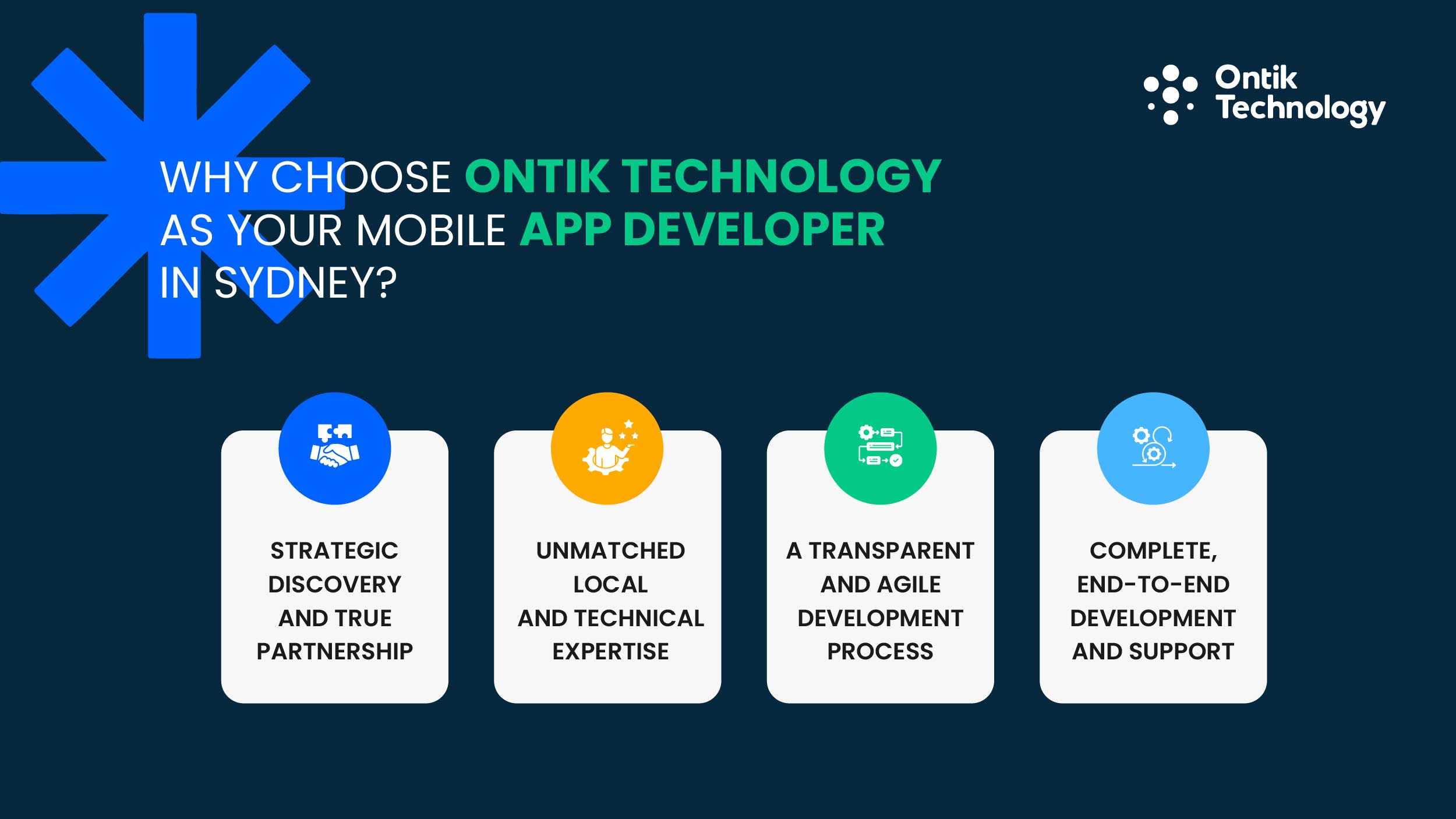
Choosing the right Sydney app developer means finding a partner who champions your vision. We're a dedicated mobile app development company that commits to making your app powerful in the market, not just writing code and leaving.
Among the top mobile app developers in Sydney, we do things differently. We operate as your dedicated digital product partner, committed to a collaborative journey that ensures your app isn't just built well, it's built to win.
Here's why businesses and startups across Australia choose Ontik Technology as their go-to mobile app developer in Sydney:
Strategic Discovery and True Partnership
Great software doesn't happen by accident; it comes from really understanding what you're trying to achieve. We move way beyond the typical client-vendor relationship to become genuine strategic partners.
In-Depth Discovery Workshops: Our mobile app consulting in Sydney begins with a Discovery Workshop to align your vision, target audience, and KPIs. This ensures the custom mobile apps we build are strategically planned for measurable success and ROI.
Ideal for Business & Startups: This strategic-first approach makes us perfect business app developers in Sydney, capable of handling complex ideas while also guiding new ventures as trusted startup app developers in Sydney.
Unmatched Local and Technical Expertise
As a premier Sydney app development company, we bring together local market insight with world-class technical skills, and that's a powerful combination.
Elite In-House Team: You can work directly with our in-house team of expert app developers in Sydney, who are masters of their craft across all major platforms for developing apps that stand out.
Full-Stack Proficiency: Whether you need dedicated iOS app developers Sydney for a polished native iOS app, skilled Android app development Sydney specialists for secure apps, or a versatile developer in Sydney working with Flutter or React Native to create high-performance cross-platform apps, our team has the expertise.
AI-Powered Innovation: We're riding the AI wave hard, integrating smart features like AI-powered recommendations, intelligent automation, and machine learning capabilities that make apps truly next-generation.
Robust Custom Solutions: We excel in building high-performance web app and mobile app solutions backed by powerful, secure, and scalable custom software. We also create progressive web apps and native app development solutions for diverse industries.
A Transparent and Agile Development Process
Here's what drives us crazy about this industry: too many developers keep their clients in the dark. We flip that completely around with full transparency at every step.
Certified Agile Methodology: We employ the true Agile development methodology, which keeps you in the loop with regular sprints and feedback sessions. This iterative process can significantly reduce time-to-market compared to traditional models.
End-to-End Clarity: You get a clear view of the entire development process, from initial app design and wireframing through to final testing and deployment, with absolutely no surprises.
Complete, End-to-End Development and Support
When you develop an app with Ontik, you're not just getting a product, you're gaining a partner for the entire mobile application development lifecycle.
Comprehensive In-House Services: Our expert mobile app developers handle design, development, UI/UX consulting, supporting web development (e.g., e-commerce), and quality assurance testing.
Dedicated Post-Launch Care: Our robust post-launch app development services in Sydney include ongoing maintenance, critical OS updates, and performance monitoring to keep your mobile app competitive. We ensure all essential legal aspects, including a contract covering Intellectual Property ownership, confidentiality, and data privacy, are covered.
Ontik Technology is the premier choice in Sydney, Australia, for businesses and startups needing professional, AI-enhanced mobile app development. We build successful apps that stand out.
Wrapping It All Up
Choosing the right app developers in Sydney isn't just another business choice. It's the decision that will make or break your entire app development project.
We've covered everything you need to know. How to judge a Sydney app development company by its real work and development process. Plus, the smart questions to ask in meetings. What you're really looking for isn't just someone to hire. You want a true partner who understands the Australian market and cares if you succeed.
The mobile app development industry in Sydney is experiencing growth due to the increasing demand for innovative solutions. Don't settle for teams that leave you guessing. Instead, look for clear communication in their mobile app development services. Find a solid history with Agile app development in Sydney. Most importantly, make sure they build custom mobile apps that actually work.
Companies like Ontik Technology show what this looks like. They work as a leading mobile app development company for the long term, not just for quick sales. Now you have your roadmap. Time to find an app developer in Sydney who'll turn your app idea into a mobile application that thrives in the real world.
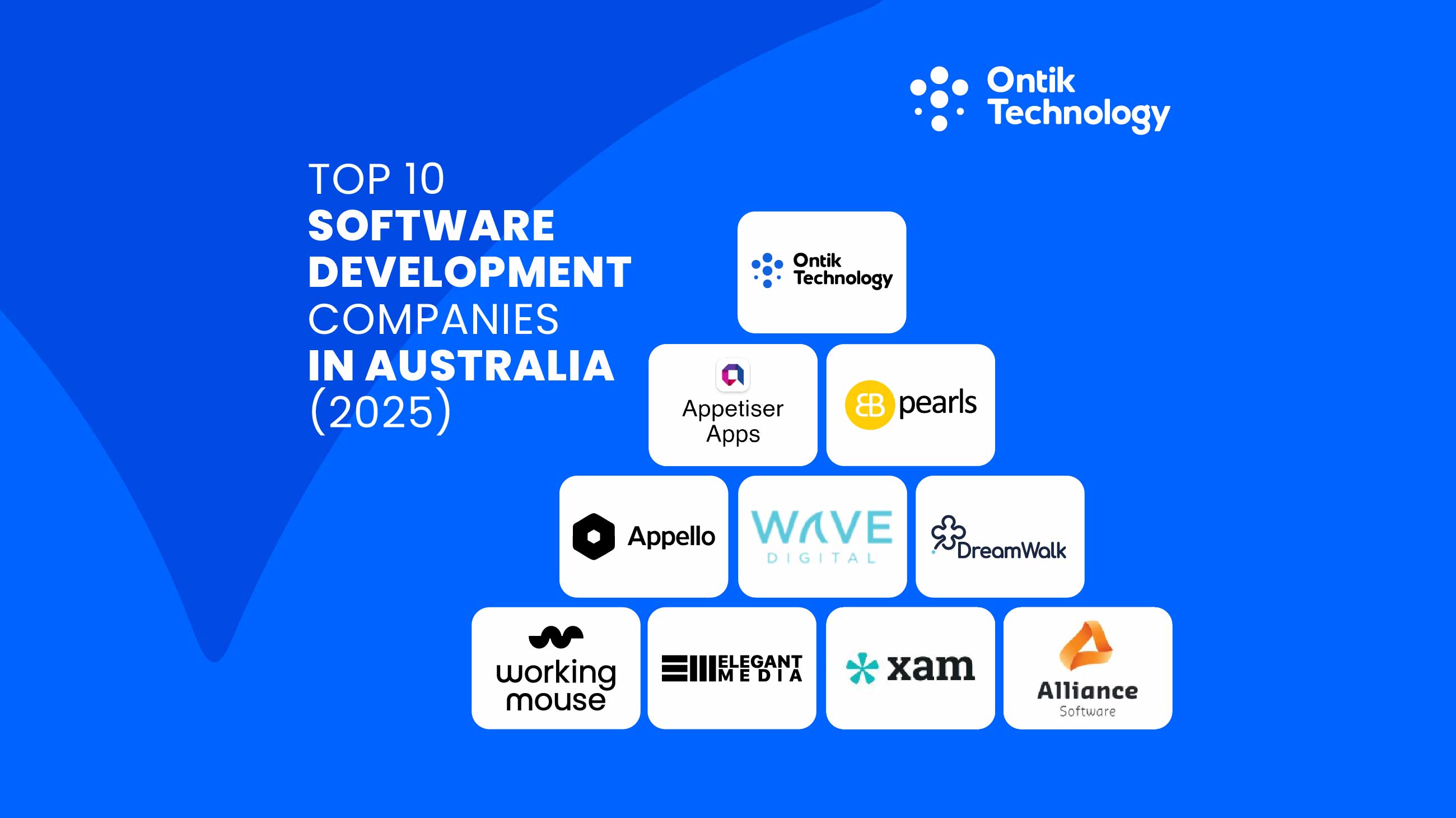

Selecting a software development company in Australia is far from child's play. It’s not merely about finding one that ticks all the boxes on paper. The partner you pick can genuinely make or break your business trajectory, determining whether your vision soars or crashes and burns. Australia’s tech ecosystem is absolutely thriving, packed with cutting-edge talent, battle-hardened developers, and world-class infrastructure that serves everyone from scrappy startups to Fortune 500 giants.
Whether you’re hunting for MVP wizardry or seeking digital transformation magic, there’s a perfect match waiting. I’ve handpicked 10 standout contenders, zeroing in on those who excel with emerging ventures, heavyweight enterprises, or showcase jaw-dropping expertise and knockout portfolios.
That said, here’s our list of the top software development services in Australia for 2025, ideal for launching new products, scaling platforms, or boosting your development team.
At a Glance: Top-Ranked Software Development Companies in Australia
Before jumping into the full list, here’s a quick look at some of the top software engineering companies in Australia.
Ontik Technology
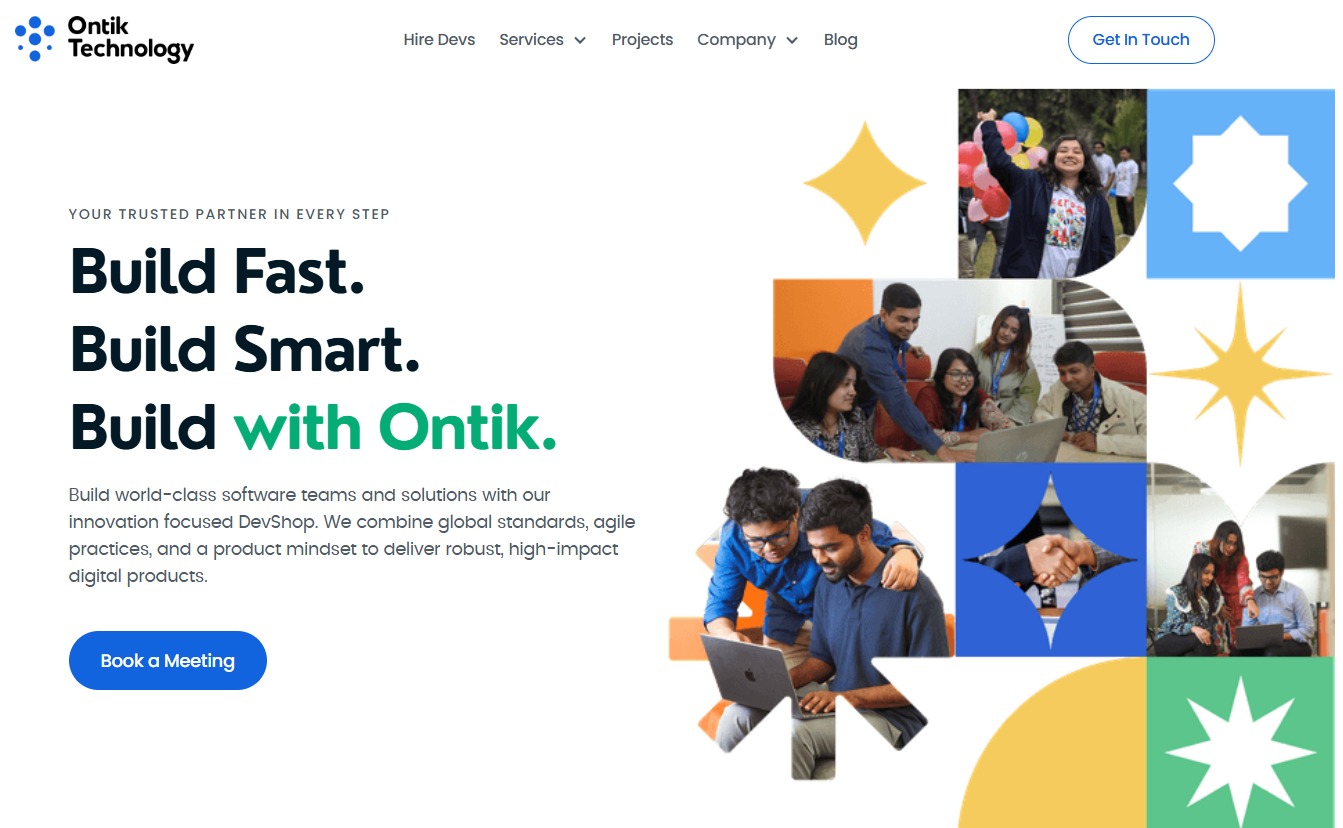
Ontik Technology’s developers excel at building scalable and secure mobile apps and web platforms. We provide end-to-end development services along with reliable offshore software support. Our team has also contributed to the development of SaaS products that have evolved into AI-powered solutions, always prioritizing performance and user experience.
Here are some of our Core Services:
- Scalable mobile app development for iOS and Android
- Secure web platform architecture and deployment
- End-to-end software development lifecycle management
- Reliable offshore development and ongoing support
- SaaS product development with modern cloud integration
- AI-powered solution implementation and optimization
- Performance-focused engineering with user-centric design
Comprehensive Service Offerings
App Development & Consulting
A trusted Australian software development company for startups and SMEs, we deliver scalable, user-friendly mobile apps with strong backend support, offering full-cycle mobile and web solutions from product decisions to post-launch support.
Team Augmentation
Need extra expertise on your side? We seamlessly integrate our developers with your in-house team, providing flexible, cost-effective support in cloud software development in Australia and app development to help you move faster.
Custom Software Development
We build custom web and cloud-based enterprise software with small, agile teams that deliver results fast, often launching basic products in under 8 weeks.
MVP Development
Transform your innovative concept into a market-ready product with our strategic MVP development services. We help startups and businesses build lean, workable versions of their digital products to validate ideas without spending excessive time or money.
Our comprehensive MVP solutions cover the entire development lifecycle, from initial research and wireframing through backend development, database setup, and quality assurance testing. We deliver MVPs within 8-12 weeks for most projects, allowing you to test your concept in the real market quickly and efficiently.
With MVP development costs typically ranging between $15,000 and $50,000, this makes it one of the most startup-friendly approaches to bring your vision to life efficiently.
Dedicated Development Team
For more control and consistency, we build dedicated teams tailored to your tech stack and work style, so you can scale your business with confidence under your own project management.
Who We Work With
- Agile startups that need fast MVPs or mobile app prototypes
- Small and mid-size businesses (SMEs) investing in SaaS or digital products
- Teams looking to hire software developers from Australia, working under an offshore development model
- Growing SaaS companies need cloud integrations, APIs, and scalable backend builds
- Forward-thinking businesses exploring AI integration - from chatbots and automation to machine learning analytics
Why We Stand Out
- 220+ projects delivered (apps to SaaS) across industries, including AI-powered solutions
- Affordable rates (~$25–50/hr) for quality cloud software and intelligent systems
- Local insight + offshore flexibility = go-to Australian offshore software company for startups
- AI expertise: natural language processing, predictive analytics, and smart automation workflows
- Partnership mentality: we're invested in your success, not just project completion
- Agile process: faster delivery, iterative improvements, regular updates
- Balanced skill set: full-stack, mobile, backend, SaaS architecture, machine learning integration
- We listen and adapt; practical solutions, no hard-selling - your goals become our mission
Recognition
● Highly regarded in startup and forum circles as a reliable Australian software development company.
● Average client rating of 4.3 stars with consistent referrals.
● Considered a practical MVP partner and easy-scale offshore support.
● Known for simple, effective software development in Australia.
Appetiser
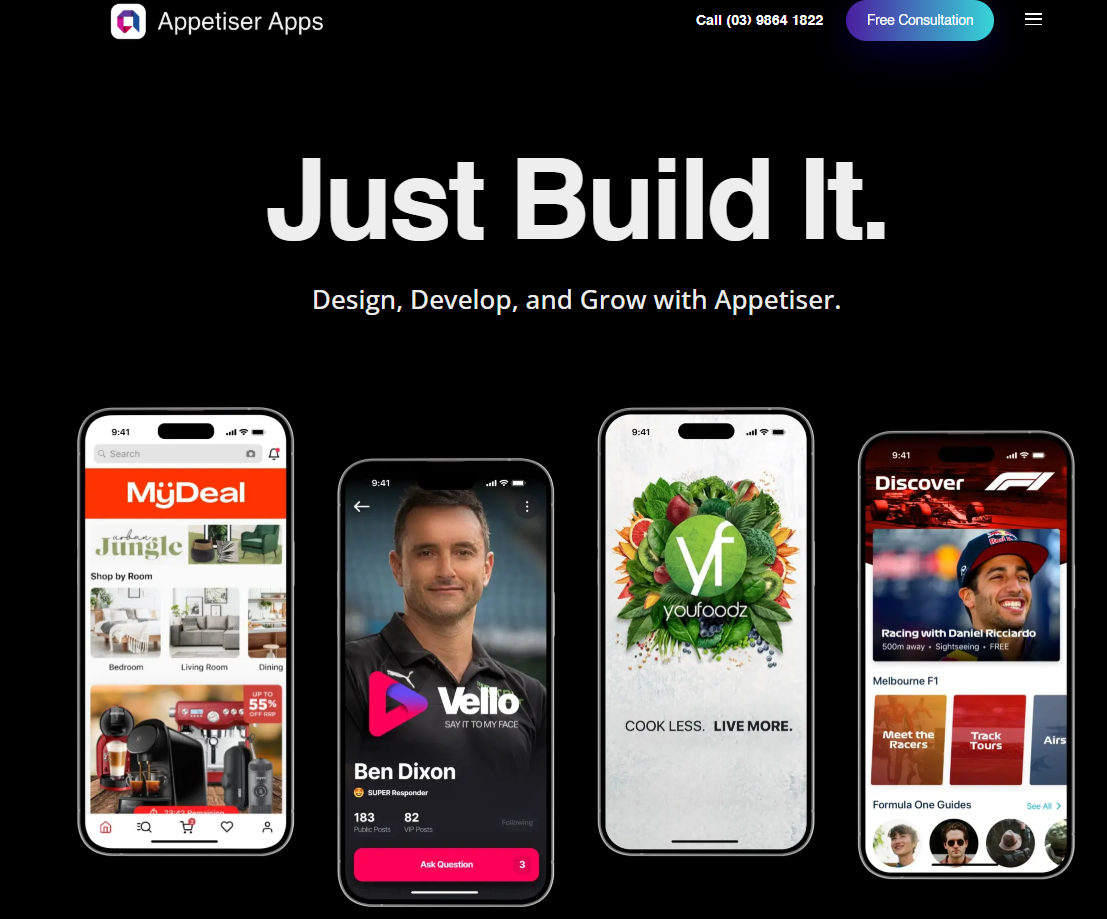
Website: appetiser.com.au
Category: Mobile App Development & Digital Strategy
Appetiser stands out among Australian software development firms with its design-first approach, focusing on apps that look as good as they function. Unlike typical dev shops, they work closely with clients from concept to prototype and stay involved post-launch for continued support.
Core Services:
● Mobile app development (iOS, Android, hybrid)
● UX/UI design and product strategy
● Web and SaaS development
● MVP and prototype launches
● Post-launch updates and support
Who They Help:
● Startups looking to build MVPs and scale quickly
● Mid-sized businesses wanting clean, polished apps
● Established brands need user-first digital products
Why They Stand Out:
● Achieved 8M+ app downloads and A$100M+ client revenue.
● Recognized as Australia’s fastest-growing app agency, reaching A$1.83M revenue in one year.
● Utilizes 6-week sprint cycles for rapid prototyping and updates.
● Multi-award-winning firm, including Deloitte Fast Starters and Young Entrepreneur honors.
Recognition:
● Deloitte Technology Fast 50 Rising Star (2019)
● SmartCompany 30 Under 30 (2019)
● Australian Financial Review Fast Starters (2020)
● Clutch’s Top Mobile App Developer in Australia (2019, 2020)
EB Pearls
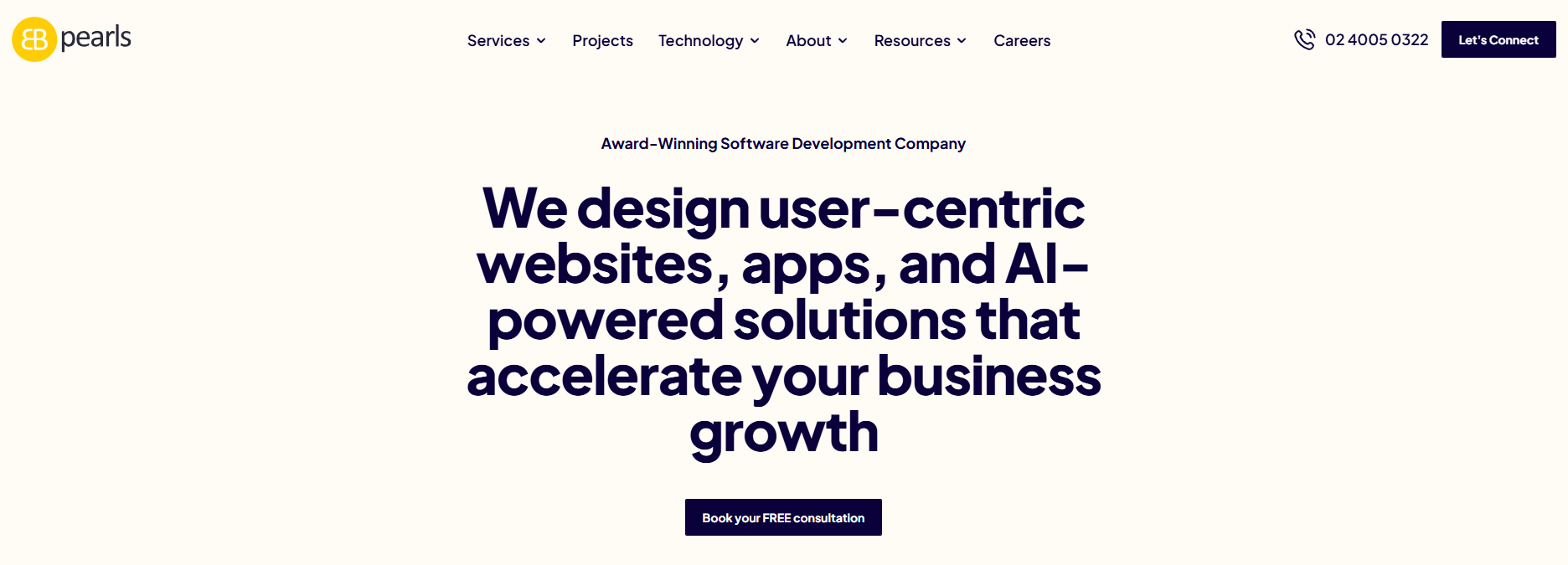
Website: ebpearls.com.au
Category: Custom Software & Digital Transformation
EB Pearls is an Australian software development company with 17+ years of experience, specializing in custom software, mobile apps, cloud projects, and digital transformation for enterprises and government. They use an agile approach for transparent, steady progress.
Core Services:
● Mobile App Development
● Web & eCommerce Development
● UX/UI Design & Prototyping
● Custom Software Solutions
● Staff Augmentation
● Digital Marketing & SEO
● DevOps & Maintenance
Who They Help:
● Startups looking for MVP builds and rapid prototyping
● Mid-to-large enterprises needing digital transformation
● Government & education clients such as the NSW Department of Education
● Health, finance, property tech, and retail sectors
Their client base includes notable organizations like WWF, NewsCorp, UNSW, NSW Health, Commonwealth Bank, Vodafone Fiji, and Westpac.
Why They Stand Out:
● Strong presence in health, fintech, education, and retail.
● Agile development with clear communication.
● ISO-certified for security and quality.
● Offers flexible pricing and team models.
● High client satisfaction and repeat business.
● Recognized with 72+ global awards.
Recognition:
● Clutch Best Mobile App Developer in Australia
● 72 International Awards for UX, design, innovation
● Featured by Good Design Awards, Techreviewer, DesignRush
Appello Software
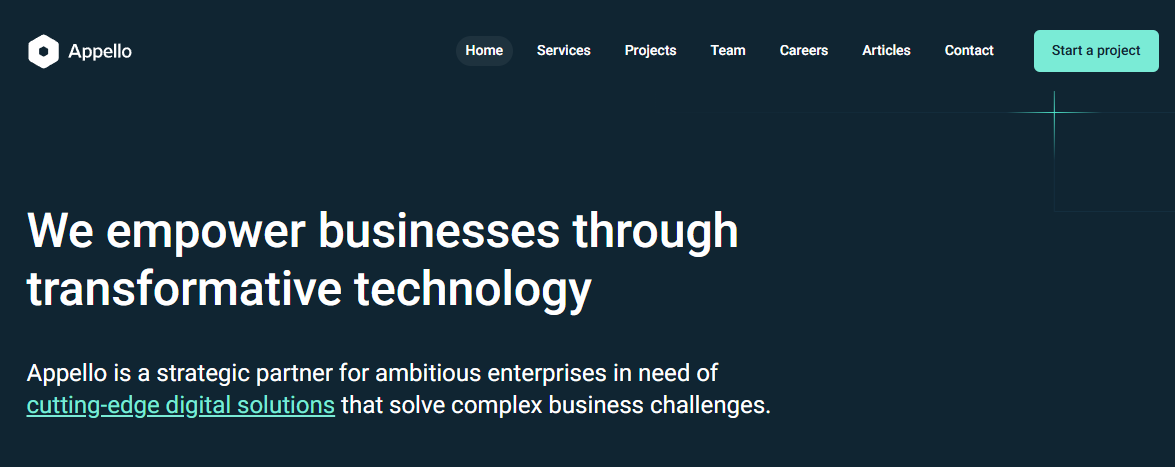
Website: https://appello.com.au/
Category: Mobile & Web App Development
Appello Software is a leading software development company in Australian development firm with offices in Sydney, Brisbane, and Melbourne. Known for its skilled team and client-focused approach, it delivers custom digital solutions across finance, healthcare, real estate, and government, making it a trusted partner.
Core Services:
● Custom Software Development
● Mobile App Development
● Web Development
● Digital Product Design
● Digital Advisory & Project Support
Who They Help:
● SMEs and startups needing MVPs, product design, or platform build
● Mid-to-large enterprises seeking full-scale digital transformation
● Vertical industries served include finance, healthcare, education, real estate, logistics, aviation, and retail
Projects include Valte (real estate), Hansen (fleet logistics), Boon (fundraising marketplace), and Carbonix (drone mission control).
Why They Stand Out:
● End-to-end digital product development, from strategy to post-launch.
● Specializes in custom software for ERP, mobile, web, and enterprise apps.
● Cross-industry expertise: finance, healthcare, education, logistics, real estate, and retail.
● Integrates AI, AR/VR, and wearable tech.
● Agile in-house team known for communication, transparent planning, and efficient delivery.
● Clients praise quality, adaptability, and proactive support.
Recognition:
● Top Software Developers in Australia – Clutch
● Featured in The Manifest’s Top App Developers
● GoodFirms Recommended Mobile App Development Company
● Listed in AppFutura’s Top App Developers Australia
● Recognized for Excellence in UX/UI Design and Custom Software Solutions
● ISO 9001 & ISO 27001 certified for quality management and data security standards
Wave Digital
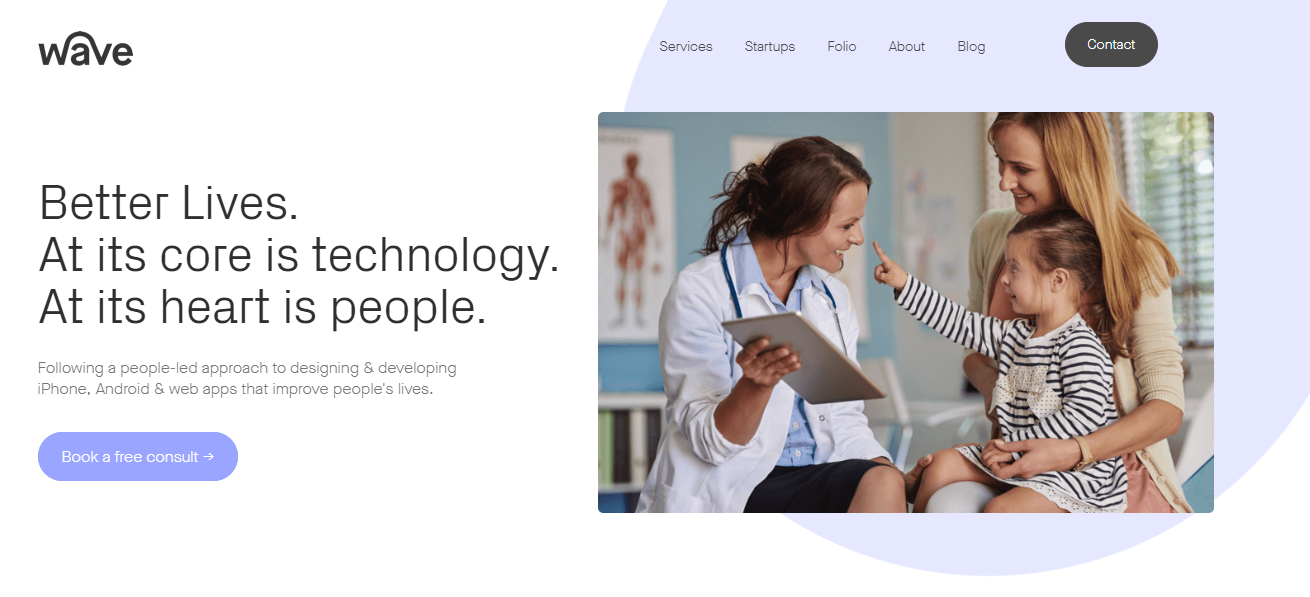
Website: wavedigital.com.au
Category: Full-Service Software & App Development
Wave Digital is a boutique software development company in Australia with 10+ years of experience. They build custom mobile apps and web platforms for startups, healthcare, and government, focusing on a user-first approach and agile delivery of functional, well-designed digital products.
Core Services:
● Mobile App Development
● Web App & Custom Software
● UX/UI Design & Prototyping
● Product Strategy & Consulting
● Support & Maintenance
Who They Help:
● Startups seeking MVP, prototype, or full product development support
● Government and non-profits, delivering healthcare and public service apps (e.g. Telemedhub, VicTraffic, GoShare Healthcare)
● Corporate clients including PeterMac, VicRoads, South East Water, and Chisholm Institute
Why They Stand Out:
● Entire design and development team works in-house.
● Delivers high-quality digital products for startups, government, and enterprises.
● Ranked top app developer in Melbourne by Clutch multiple years.
● Specializes in mobile-first apps, user-centered design, and open-source technologies.
● Strong track record in health tech, edutech, logistics, and public services.
● Highly rated on Clutch and Google with consistent five-star client reviews.
Recognition:
● Featured by The Manifest as a Leading Boutique App Development Company
● Listed among Top App Developers in Clutch
● Recognized by GoodFirms for Excellence in Mobile App Development
● Named in AppFutura’s Top Australian App Developers
● Known for Award-Winning UX/UI Design and Custom HealthTech Solutions
● Trusted by Government and Enterprise Clients for Quality and Reliability
DreamWalk
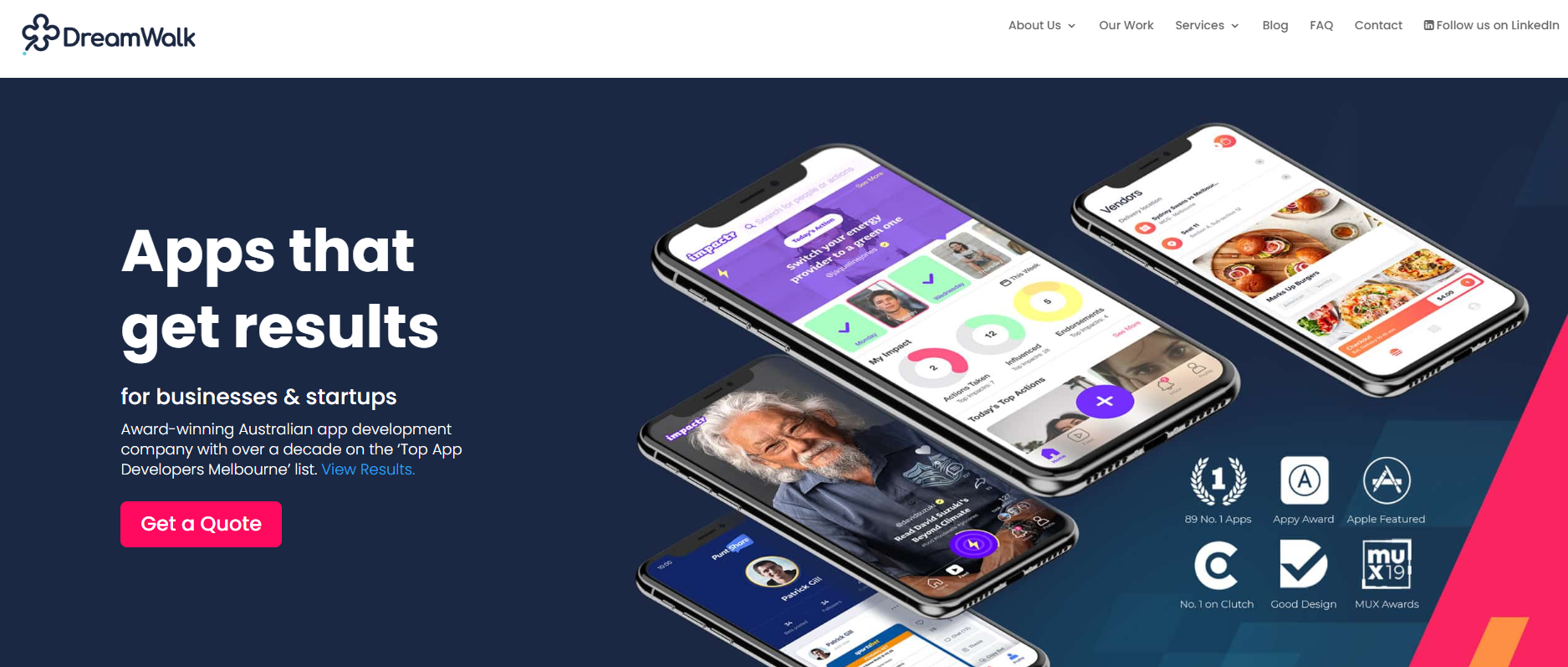
Website: dreamwalk.com.au
Category: Mobile App Development & UX Design
DreamWalk is a top Australian app studio known for award-winning, high-performance mobile apps. They partner with startups and enterprises alike, blending innovative design with solid development to create standout user experiences and successful digital products.
Core Services:
● Mobile App Development
● UX/UI Design & Prototyping
● Web Application & Custom Software
● Product Strategy & Ethical Consulting
● Support & Maintenance
Who They Help:
Mobile/web product development for: startups/growth-stage companies; government, education, and nonprofit organizations (e.g., University of Melbourne, Victoria state government); and large enterprises (e.g., Porsche, Dulux Group, Easy Weddings, Mosaic, The Secret).
Why They Stand Out:
● Held more App Store #1 rankings than any other Australian developer.
● More than 100 Apple features across their apps.
● Known for ethical, transparent development guided by their unique charter.
● Trusted by enterprise clients, government bodies, and startups alike.
● Their top apps achieve global reach from lifestyle hits to high-impact government tools.
Recognition:
● Top App Developers in Clutch
● Featured by The Manifest and Business of Apps
● AppFutura Top Mobile App Development Company
● Recognized by GoodFirms for Innovation in App Design
● Multiple award-winning apps featured on the App Store
● Trusted by major brands like Coca-Cola and Melbourne University
WorkingMouse
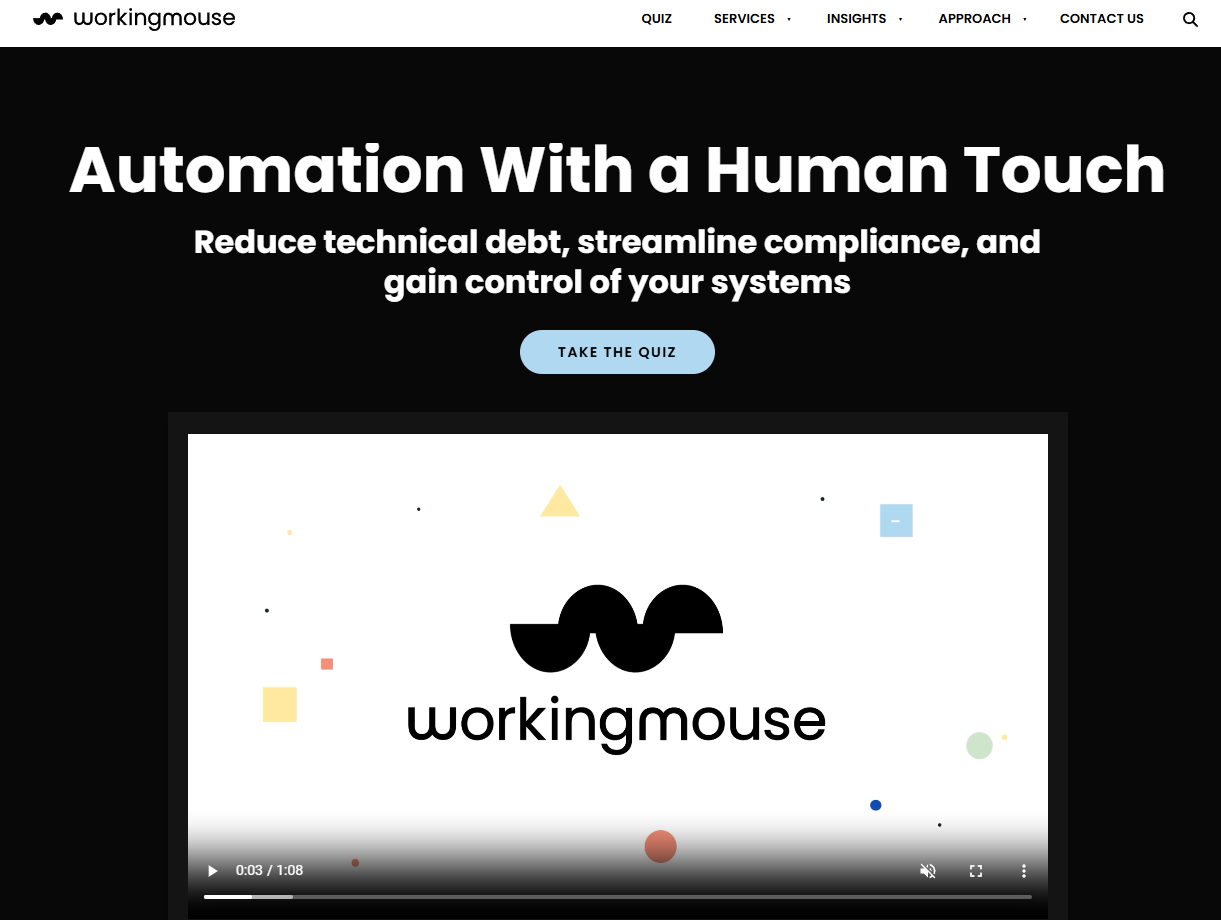
Website: workingmouse.com.au
Category: Custom Software & Digital Transformation
Sydney-based Working Mouse is an award-winning software company. They use design-led strategy and agile development to create scalable, user-friendly solutions for startups and enterprises, helping businesses overcome challenges and leverage new tech.
Core Services:
● Custom Software Development Australia
● Digital Product Design & Development
● Agile Software Consulting
● Mobile & Web Application Development
● Cloud-Native Software Solutions
● Product Strategy & MVP Delivery
● Software Quality Assurance & Testing
● DevOps & Continuous Delivery
Who They Help:
Serving a global client base, from startups to enterprises, they specialize in digital product innovation across fintech, healthtech, education, and logistics. Their rapid prototyping and MVP development expertise helps businesses validate ideas and quickly launch high-quality software.
Why They Stand Out:
● Leader in agile software development & digital product innovation.
● Award-winning design thinking & engineering excellence.
● Strong client collaboration, iterative delivery & continuous feedback.
● Expertise in AWS & Azure cloud platforms.
● Proven track record of on-time, on-budget complex software projects.
● Focus on maintainable, scalable, secure applications.
● Trusted partner for startup MVP development & enterprise digital transformation.
Recognition:
● Awarded Best Software Development Company Australia by local industry bodies
● Featured by GoodFirms and Clutch for outstanding client satisfaction
● Accredited for cybersecurity best practices and software quality
Elegant Media
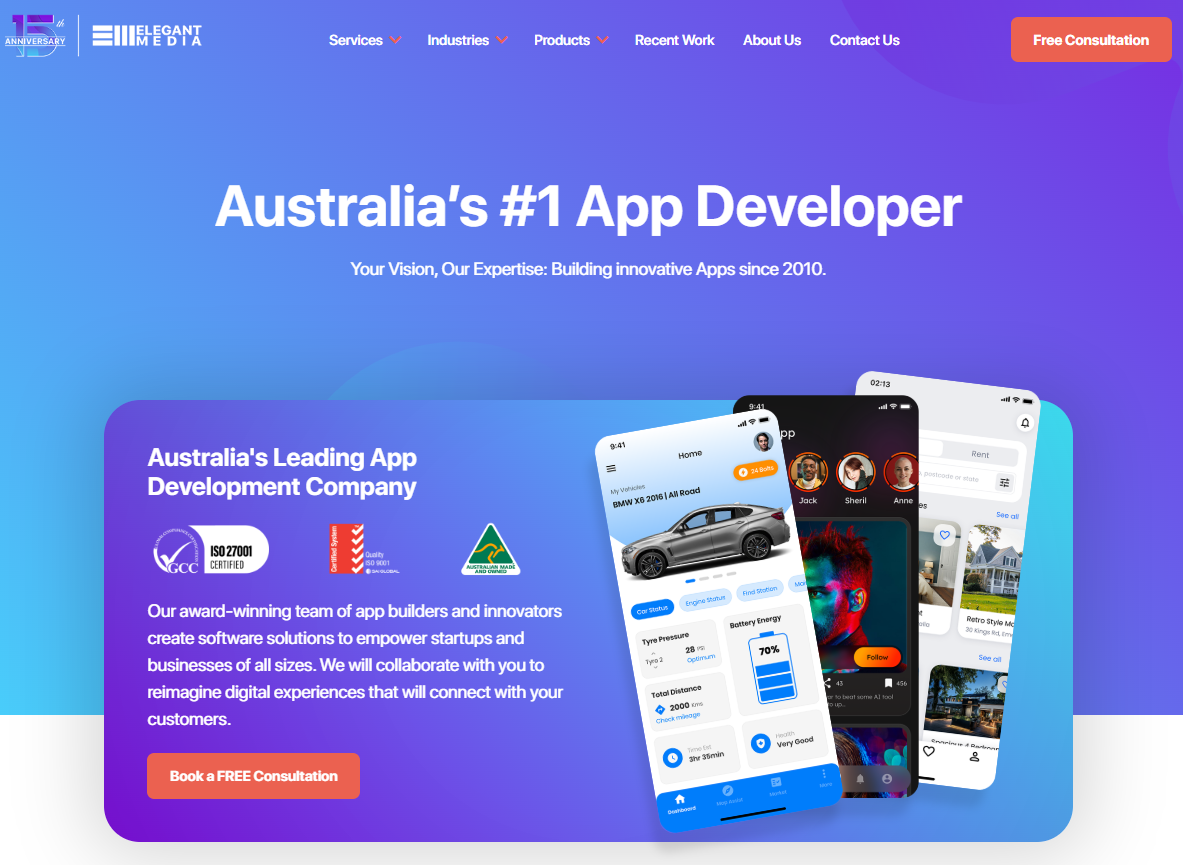
Website: elegantmedia.com.au
Category: Digital Agency & Software Development
Elegant Media, a leading Australian software company, excels in custom development and digital transformation. Their agile team builds scalable, high-quality web and mobile apps, blending creativity with technical expertise to streamline business operations.
Core Services:
● Custom Software Development Australia
● Mobile & Web Application Development
● Digital Media Solutions
● Software Consulting & Strategy
● Cloud Software Development & Integration
● UI/UX Design & Prototyping
● Software Testing, Maintenance & Support
● Agile Development & DevOps
Who They Help:
Elegant Media collaborates with diverse clients—startups, SMEs, and large enterprises—across Australian industries like media, entertainment, education, and retail. They efficiently bring digital ideas to life, developing interactive apps, content management systems, or custom media platforms.
Why They Stand Out:
● Top Australian custom software developer, specializing in media.
● Blends creative design with advanced software engineering for engaging digital products.
● Offers flexible engagement models and agile processes focused on collaboration and rapid iteration.
● Deep expertise in media technologies, streaming, and content platforms.
● Delivers secure, scalable, high-performance software; committed to innovation and customer satisfaction.
Recognition:
● Clutch & GoodFirms: Leading Australian software development company.
● Excellence in digital media software solutions & customer satisfaction.
● ISO certified for quality management & information security.
XAM

Website: xam.com.au
Category: Mobile App Development & IoT Solutions
XAM, a top software development company in Australia, offers secure, user-focused solutions for startups and enterprises. They specialize in custom apps, cloud services, and digital transformation, providing fast, high-quality results through agile development.
Core Services:
● Custom Software Development Australia
● Mobile & Web Application Development
● Enterprise Software Solutions
● Cloud Application Development & Migration
● API Development & Integration
● Software Testing, Maintenance & Support
● Agile Software Consulting & Delivery
● Digital Transformation Services
Who They Help:
XAM Australia partners with businesses in finance, healthcare, retail, and government, supporting startups with MVPs and enterprises modernizing legacy systems and optimizing processes with software solutions.
Why They Stand Out:
● Top-ranked Australian software developer (Clutch & GoodFirms).
● Expertise in custom, scalable, secure, and high-performance software.
● Proven track record with enterprise and cloud projects.
● Agile, collaborative approach for fast delivery.
● Flexible engagement models (dedicated teams, project-based).
● Trusted by Australian businesses for digital innovation.
Recognition:
● Featured among Australia’s leading custom software development firms
● Accredited for quality management and information security standards
● Known for outstanding client satisfaction and project delivery
Alliance Software

Website: alliancesoftware.com.au
Category: Custom Software & Enterprise Solutions
Alliance Software is a trusted software development company in Australia known for custom enterprise solutions and agile delivery. Their expert team builds secure, scalable apps that boost efficiency, serving industries like finance, healthcare, logistics, and government.
Core Services:
● Custom Software Development Australia
● Enterprise Application Development
● Mobile & Web Application Development
● Cloud Software Solutions & Migration
● API Development & System Integration
● Software Maintenance, Support & Testing
● Agile Project Management & Delivery
● Digital Transformation Consulting
Who They Help:
Alliance Software partners with Australian startups, SMEs, and enterprises to deliver goal-aligned software, accelerate growth, and provide digital transformation, operational automation, and innovative technology solutions.
Why They Stand Out:
● Recognized for excellence in custom software development in Australia
● Expertise in enterprise-grade solutions with a focus on scalability and security
● Agile and collaborative approach ensuring transparency and on-time delivery
● Flexible engagement models to fit diverse client needs and project sizes
● Proven success delivering projects across finance, healthcare, logistics, and government
● Strong commitment to quality, innovation, and customer satisfaction
● Trusted partner for businesses undergoing digital transformation
Recognition
● Recognized by Clutch & GoodFirms as a top custom software development company in Australia.
● Certified for quality management and security compliance.
● High client retention and successful project outcomes.
These companies represent the cream of the crop in Australia's thriving software development landscape, each bringing its unique strengths to the table. From AI pioneers to mobile app specialists, they've all earned their stripes through consistent delivery and client satisfaction.
What sets them apart isn't just technical prowess—it's their ability to translate complex business needs into elegant, scalable solutions.
Why Choose an Australian Software Development Company?
Teaming up with an Australian software development company could be the ace up your sleeve for your next digital venture or system overhaul. Australian dev teams have earned their stripes on the global stage, consistently delivering the goods for high-stakes projects across the board.
What sets them apart? You're getting seasoned professionals who've cut their teeth building robust systems for companies of all shapes and sizes. These folks don't just write code—they craft enterprise-grade solutions that stand the test of time. Their track record speaks volumes about maintaining clean, maintainable codebases that won't come back to bite you down the road.
Here's where things get interesting: most Australian development houses have truly embraced the agile philosophy, and they're not just paying lip service to it. This means you'll see steady progress week after week, with regular check-ins that keep everyone on the same page. When your business needs pivot—and let's face it, they always do—these teams can roll with the punches and adapt without missing a beat.
The bottom line? Partnering with an Australian software company isn't just about getting the job done—it's about working with professionals who understand that great software is a marathon, not a sprint.
Here's what makes them stand out:
● Skilled developers - People with real experience from successful companies
● Clear processes - You know what's happening and when things will be ready
● Good timing - Easy communication whether you're in America, Europe, or Asia
● Smart design - They build things that work well and feel good to use
● Strong security - Your data stays safe with international compliance standards
● Innovation support - Government programs help them stay ahead of trends
● Flexible deals - Work arrangements that fit your budget and schedule
The software development services in Australia are supported by strong collaborations. Universities, tech companies, and the government work together, creating an environment full of innovation and high standards.
When you choose these services, you're not just getting skilled coders—you’re partnering with dedicated, business-savvy experts who truly understand your needs.
Benefits of Choosing Australian Software Development Companies

- Rock-Solid Software That Lasts
Australian software development companies take great care to ensure quality. They follow strict standards that make sure your software stays reliable exactly when you need it most. Whether you're serving 100 users or 100,000, you can trust that your systems are built to grow with you.
- Smart People Who Love Problem-Solving
Australian tech developers love their work, solving problems with the latest tech to benefit your business.
- They Actually Listen to You
Software development companies in Australia are renowned for their close collaboration with clients. They don't just collect your requirements and then go silent for months. Instead, you’ll experience regular check-ins, honest feedback, and solutions tailored to your unique needs.
- Perfect Timing for Global Business
Australia's timezone is ideal for global coordination. Developers from a software development company in Australia can easily engage with Asian markets in the morning and US teams in the evening, leading to faster decisions and smoother projects.
- Great Value Without the Compromises
You don't have to choose between quality and cost. Software companies in Australia offer competitive rates while maintaining high standards. Plus, you can easily adjust team size based on your project needs without long-term commitments.
- Global Experience, Local Service
Developers from a software development company in Australia are experienced in international projects, understand global business requirements, compliance, and market expectations, enabling software products for worldwide use.
- Cost of Software Development in Australia
Building software in Australia comes with different price tags depending on what you're creating and who you hire. The software development services Australia market offers various pricing models, so you can find something that fits your budget.
Here's what you can expect to pay:
● Hourly rates - AUD $90-$180 per hour (depends on experience and city)
● Simple MVP - AUD $30,000-$60,000 for basic products (8-12 weeks)
● Custom web apps - AUD $70,000-$150,000 for full-featured platforms
● Enterprise systems - Start at AUD $150,000, can reach AUD $500,000+
● AI and cloud solutions - AUD $100,000-$300,000 based on complexity
Sydney and Melbourne, as major tech hubs, command premium rates. Brisbane, Adelaide, and Perth provide quality at better value.
Remember extras: testing and project management add 15-25% to costs, plus software licenses, premium APIs, hosting, and ongoing maintenance.
Key Criteria for Selecting a Software Development Company
Portfolio Deep Dive: Don't just browse—dig into their past work. You want proof they've tackled projects in your wheelhouse - whether that's web platforms, mobile apps, or cutting-edge AI solutions Australia's known for. Check they're riding the wave with current tech stacks like React, Node.js, or Flutter.
Industry Street Smarts: Hunt down a custom software outfit that speaks your language. Healthcare, fintech, and education all come with their own minefield of regulations. Teams who've been there, done that won't get blindsided by compliance curveballs you might overlook.
Real Talk from Real Clients: Skip the glossy brochures—reviews tell the true tale. Platforms like Clutch serve up verified feedback that cuts through the marketing noise. Seek out case studies packed with hard numbers, not just feel-good fluff.
Communication That Clicks: Aussie dev teams worth their salt keep you in the loop consistently. Whether it's Slack pings, Jira updates, or good old face-to-face chats—find your rhythm. You shouldn't be left guessing where your investment's headed.
Clear Process & Honest Pricing: Agile isn't just buzzword bingo—it actually delivers. Defined milestones, regular check-ins, and flexibility for pivots. Demand upfront transparency from software houses with zero hidden nasties. Know exactly what you're getting from the get-go.
Post-Launch Partnership: Your software's journey doesn't end at deployment. Bug squashing, feature updates, performance fine-tuning—ensure they're committed for the long haul. Australia's robust privacy legislation works in your favor, offering solid protection down the track.
How to Choose the Right Partner for Your Project
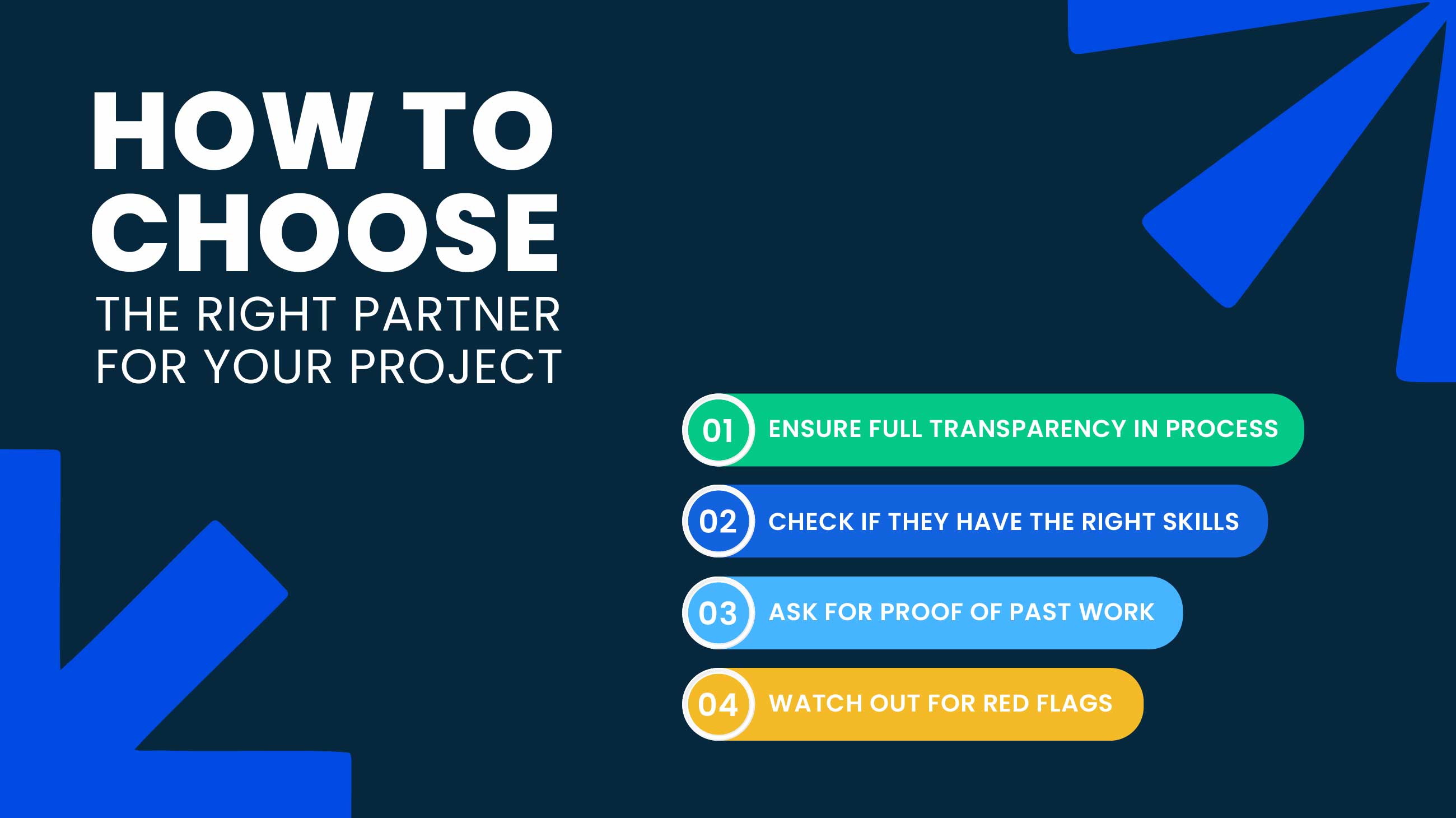
Choosing the right development partner isn’t just about ticking technical boxes it’s about finding someone who truly gets your industry, communicates clearly, and delivers real results, not just promises.
Technical Sweet Spot: They've got to have walked the walk with your tech requirements. Whether you're diving into AI waters, navigating cloud infrastructure, or building mobile experiences, your Australian dev partner should have battle-tested expertise. Sector savvy counts big time too - fintech veterans know banking compliance inside out, while healthcare pros get the privacy maze by heart.
Track Record That Speaks: When vetting software teams Down Under, give the slick pitch decks a miss. Hunt for genuine case studies packed with hard metrics and real outcomes. Client reviews on trusted platforms reveal the nitty-gritty of what it's actually like working with them day in, day out.
Crystal Clear Operations: Your chosen Australian software house should run a tight ship with transparent communication channels and proven agile practices. Expect regular progress reports, meaningful feedback sessions, and realistic timelines. Quality Australian developers won't keep you in the dark about milestones or budget burns.
Red flags to dodge: pushy upfront payment demands, dodgy references, or wishy-washy project outlines. These spell trouble from the get-go.
Conclusion
Getting your software development partner choice right in Australia can be the difference between business breakthrough and costly setbacks. The Land Down Under boasts plenty of solid outfits delivering expert solutions across diverse sectors.
Ontik Technology brings genuine value to the table through robust technical chops and fair pricing, backing clients from initial blueprints right through to market launch. Their commitment to quality craftsmanship and intuitive design translates into scalable, dependable software that fuels business growth and sparks innovation.


Business success depends on a proper strategy. Many startups and mid level software development companies, or many digital products, face a loss in their business because they don’t have a proper business strategy and lack a growth strategy for their business. Scaling means smoothly handling that growth, without problems or losing quality.
A Business Growth Strategist is someone who helps you grow in the right way. They give you easy steps and smart ideas so your business can grow safely and strongly.
At Ontik Technology, along with our other concern, Ontik Advisory, we specialize in helping businesses grow with purpose. If you're a startup or mid level company, we are ready to guide you as your Business Growth Strategist partner and give the right support with strategies to help you succeed now and in the future.
What Is a Business Growth Strategist?
A business growth strategist for entrepreneurs is someone who helps businesses grow in a smart and steady way. They are experts who give advice and focus on helping business owners or companies understand how they can scale their business, increase their sales, and grow gradually while working smarter and becoming stronger leaders. If you are a business growth strategist for small businesses or running a startup, software development company, or marketing agency, they can guide you in every step to increase sales, reach more customers, achieve high ROI, and fix things that slow you down.
An online business growth strategist is also helpful if you work mainly on the internet. They show you how to grow online without getting lost or overwhelmed. A good business development growth strategist knows how to spot new opportunities and help your team improve. If you’re looking for a new path or want to grow faster, being a business growth strategist opportunity could also be the right career for you.
Why Growing Your Business Requires a Business Growth Strategist
Growing or scaling your business is not only about earning profit but also hiring the right people so that in the long term the company can sustain itself.
It’s about solving many challenges, like:
- Reaching more customers but still keeping your old ones happy
- Making your daily work smoother as the business gets bigger
- Planning your budget to match your business goals
This is where a business growth strategist for entrepreneurs or a business growth strategist for small businesses becomes important. They look at the problems you face and give you simple, smart solutions. A good business development growth strategist or online business growth strategist helps you grow at a pace your business can handle — without stress or confusion.
At Ontik Technology and our concern Ontik Advisory, we act as your business growth partner. Whether you’re starting out or already running a small business, we help with planning, fixing problems, and reaching more customers. We understand what it takes to grow in today’s digital world.
As your digital growth strategist, we don’t just give advice. We work with you step by step to build the right strategy for your business growth, bring in the right tools, and guide your team. From growth marketing tactics to building the right business growth plan services, we help in every part of the journey.
Key Services from a Business Growth Strategist
A Business Growth Strategist helps businesses grow in smart and steady ways. They offer support and advice that fits exactly what a growing business needs. Their job is to guide business owners and teams with clear steps to make better profits, work more efficiently, and grow without stress.
Difference Between: Business Growth Vs Business Scaling
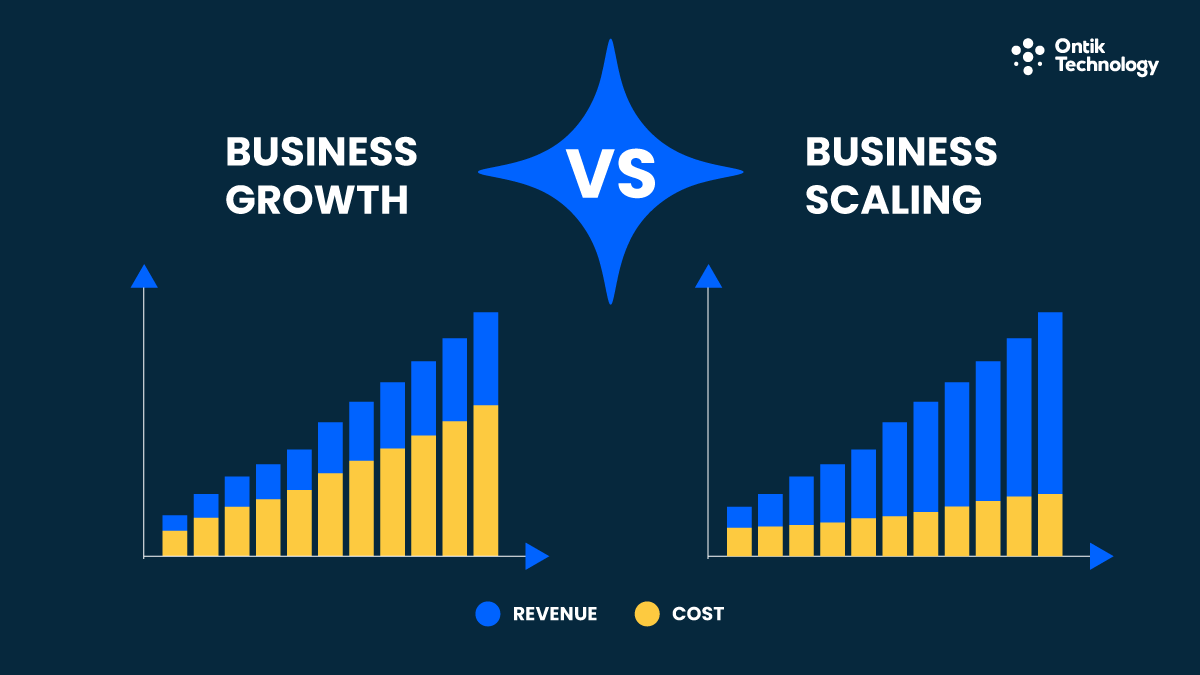
Many startup founders and business owners think that growing and scaling a business mean the same, but that is not right to some extent, and they are not the same. With help from a business growth strategist for entrepreneurs, you can grow your business step by step and get ready to scale in the future.
What Is Business Growth?
A Business Growth Strategist is someone who helps you grow in the right way. They give you easy steps and smart ideas so your business can grow safely and strongly.
What Is Business Scaling?
Scaling a business is different. It means growing your business without spending a lot more money. With scaling, you increase your output without increasing your costs too much. For example, using software or automation to serve more clients without hiring more people is a way to scale.
This is where a business development growth strategist can help. They create strategies that allow your business to handle more customers, orders, or projects without needing a lot more resources.
Why the Difference Matters
If you don’t know the difference between growing and scaling, you might spend too much money trying to grow and end up with low profits. Or you might try to scale too fast without being ready and lose control. That’s why having a business growth strategy consultant is so important. They help you avoid common mistakes.
Software Companies and Scaling
For software development companies, scaling is very important. You may get more clients suddenly, and without good systems, you may fail to deliver on time. A digital growth strategist helps you use automation, cloud tools, and the right hiring model to grow without increasing costs.
10 Key Benefits: Strategic Benefits of Working with a Business Growth Strategist
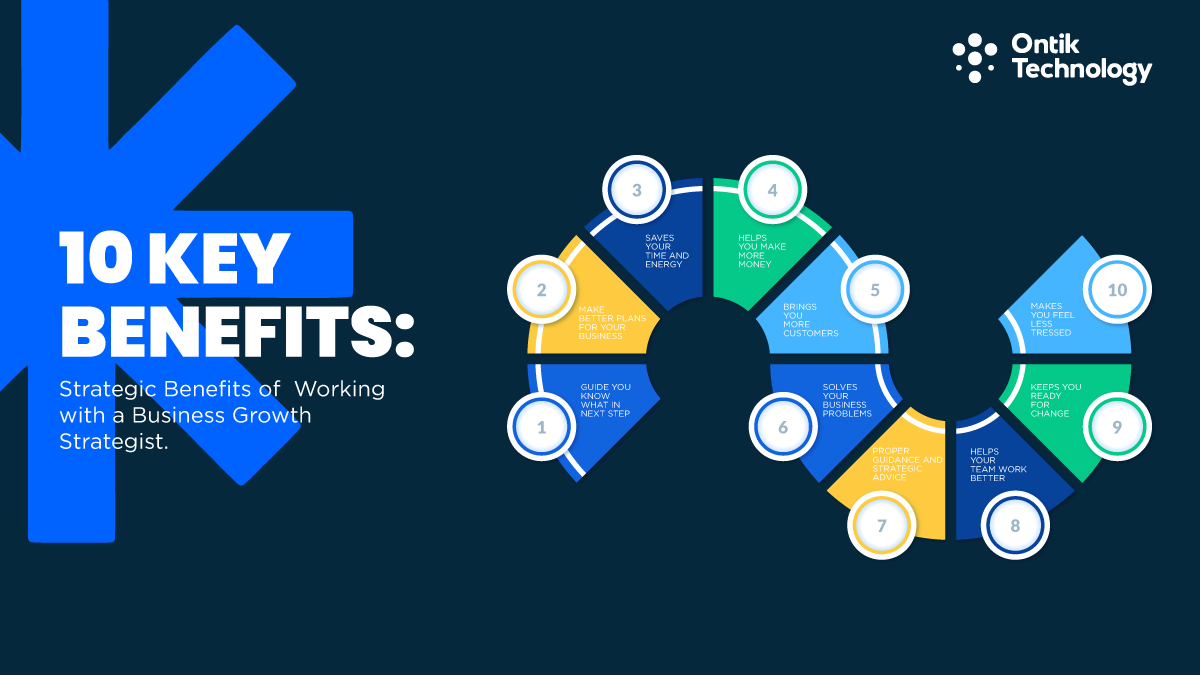
Here are the key points if you work with a Business Growth Strategist or business growth consultant:
- Guide you know what in next step
A business growth strategist shows you the right steps to grow your business, so you're not just guessing what to do next. - Make Better Plans for Your Business
They help you make easy and smart plans, so your business grows in the right way — not too fast, not too slow. - Saves Your Time and Energy
Instead of trying everything on your own, the strategist gives you ideas that work. So, you don’t waste time or energy. - Helps You Make More Money
They guide you on how to sell better, reach the right people, and earn more without spending too much. - Brings You More Customers
A strategist helps you find new customers who are looking for what you offer. You can grow your business faster. - Solves Your Business Problems If something is not working or feels confusing, they help fix it. They give simple answers to hard problems.
- Proper guidance and strategic advice
If you work with a strategist, you will get honest feedback and proper advice, and your business will scale because of his or her help, and you will feel more confident to make better decisions - Helps Your Team Work Better
They guide you to build a team that gets along and does good work together, so your business can grow smoothly. - Keeps You Ready for Change
Things change all the time in business. They help you stay ready and adjust quickly when something new happens. - Makes You Feel Less Stressed
When someone is there to help, you feel calmer. You can pay attention to what really matters in your business. - Helps You Not Make Big Mistakes
They’ve seen what works and what doesn’t, so they help you stay away from the common problems that can slow you down. - Supports You Like a Partner
A strategist doesn’t just give advice and leave. They stick with you and support your goals like a real business friend.
Easy Steps to Grow Your Business with a Strategist
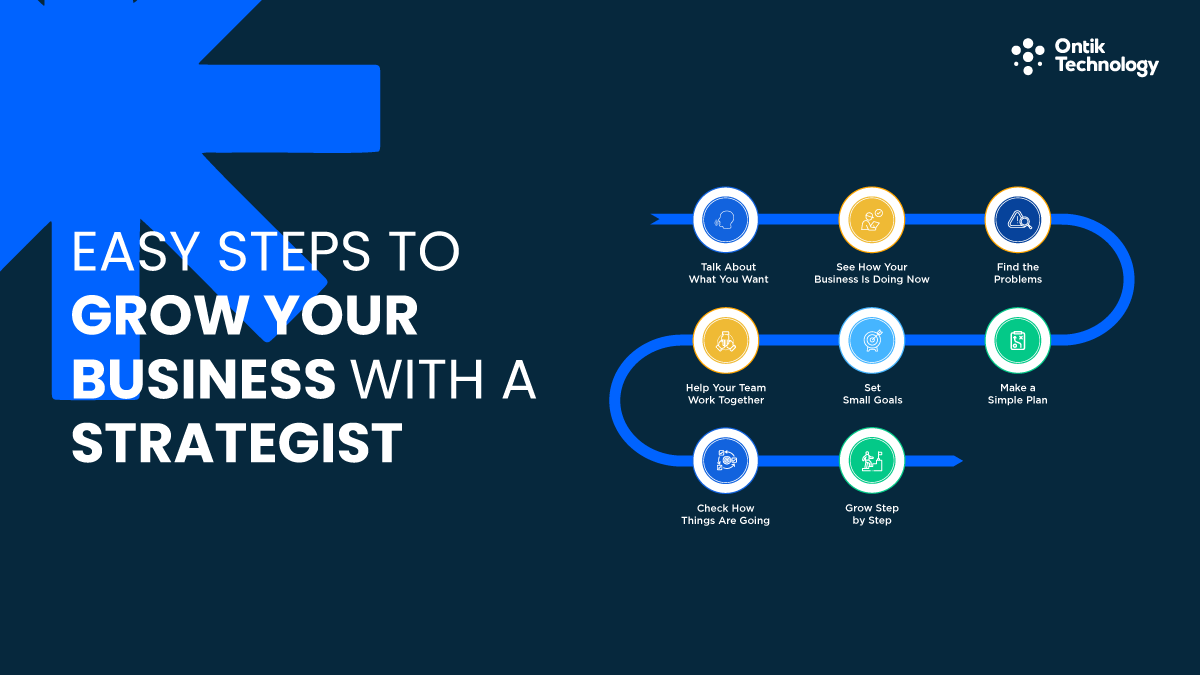
1. Talk About What You Want
Tell the strategist what you want to do. Maybe you want more customers, make more money, or grow your team. They will listen and help you.
2. See How Your Business Is Doing Now
The strategist will look at how your business is working now. They find out what’s good and what’s not working well.
3. Find the Problems
They help you find what is stopping your business from growing. Maybe you’re spending too much or not getting enough sales.
4. Make a Simple Plan
They will give you an easy plan to follow. No big words, just clear steps to help your business grow.
5. Set Small Goals
Instead of big goals, they help you make small ones, like getting 5 new customers this week.
6. Help Your Team Work Together
They show your team how to work better together. This helps your business run more smoothly.
7. Check How Things Are Going
They keep checking your progress. If something is not working, they fix it and try a better way.
8. Grow Step by Step
Growing a business takes time. The strategist stays with you and helps you take one small step at a time.
Choose the Right Growth Strategist for Your Business
Choosing the right growth strategist is very crucial because in this era, there are lots of growth consultancy firms available, and the right firms can help your business move in the right direction. It is important to find someone who is very expert and aligned with your business goal. A good growth strategist will guide you, help solve problems, and support your business journey.
Start by looking at their past work. Have they helped other businesses grow?
Check out their latest and past work history, client feedback, and testimonials. See what kind of businesses they have worked with, how they manage business challenges, and how they support their clients. All these things will give you a clear idea about their firm. One important thing you must know is how well they understand different industries and the challenges that come with them.
It’s also important to see how well they understand your business. A great business growth strategist for small businesses will listen to you carefully. They’ll ask the right questions about what you want to achieve. They should not jump to quick solutions. Instead, they should take time to know your business and suggest plans that match your goals.
Ask about their way of working. Do they provide regular updates? Will they sit with your team and help you solve daily issues? A good online business growth strategist will be easy to reach and give you helpful advice on time. They should make your work easier, not harder.
Look for someone who thinks long term. A digital growth strategist should help you grow now and also plan for the future. They will help you stay strong when the market changes. That means your business can keep going even when things get tough.
The best business development growth strategist will help your whole team. Price also matters. You don’t always need the most expensive strategist. Look for someone who gives good value for money. Before starting work, ask about their price plan, as it can help you with your cost calculations and prepare your budget.
Trust is key. You will share important business details with them. So, pick someone who makes you feel comfortable. A good business growth strategy consultant will respect your ideas and work with you as a partner, not just a service provider.
How Ontik Technology Can Help
At Ontik Technology, we help companies grow and scale the right way. Whether you need a business growth strategist for small businesses or a full team to guide your growth, we are here. We understand the different needs of startups, agencies, and product companies. We help you:
- Get more customers
- Improve how your team works
- Use smarter tools
- Grow your revenue without increasing costs too much
Finding the Right Business Growth Partner
Choosing the right partner is key to success. Many people offer advice, but not all of them understand your unique business. A real business growth strategist is someone who takes the time to know your goals and works closely with you.
At Ontik Advisory, our team of business growth strategy consultants and digital growth strategists provides easy to scalable solutions and plans that match your needs to get higher ROI in your business. Whether you are just starting or ready to scale your business, we help you take the next step without risk.
Final Thought
Growing a business is not just about making more money, it's about having the right plan, the right people, and the right support. A business growth strategist helps you grow step by step, solve problems, and avoid mistakes. In the whole article, we can sum up with an overall business growth strategy that may help you to boost your business, and we will guide you with updates and unique information from choosing the right strategic partners to the roles of technology in Growing Businesses. At Ontik Technology and Ontik Advisory, they can guide your startups and growing companies with smart strategies and tools that truly work.
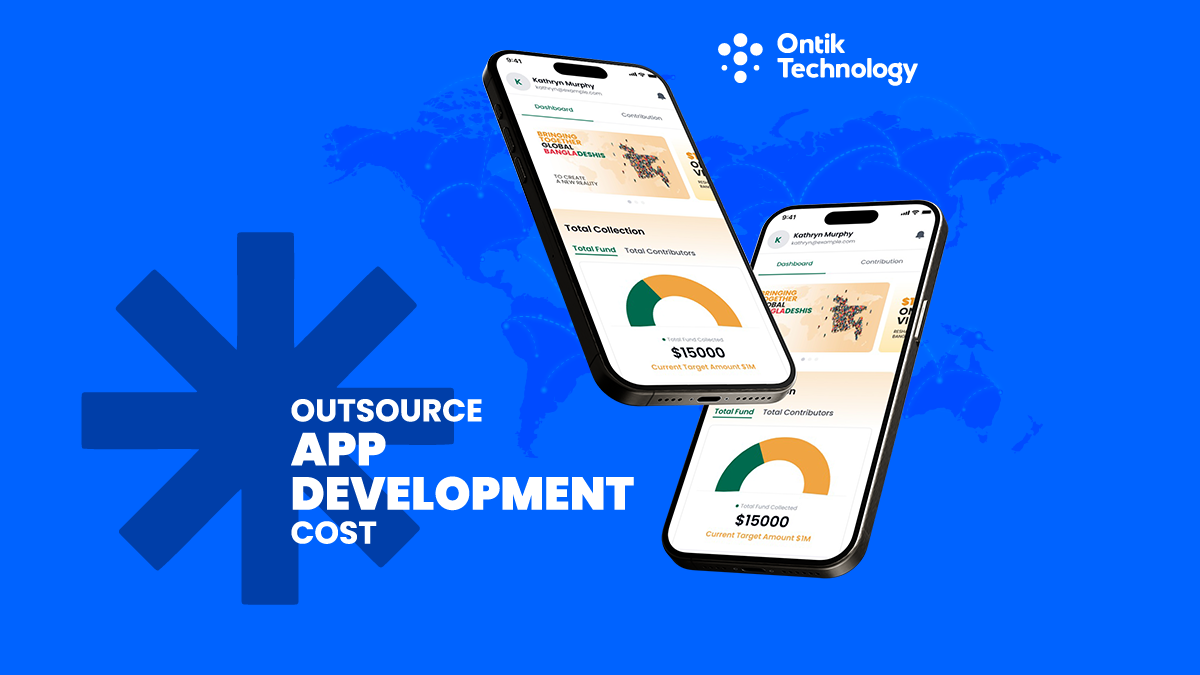

If you’ve been searching online for “how much does it cost to outsource app development?” or “outsource mobile application development”, chances are you've seen a lot of numbers but not enough clear answers.
As a startup, you don’t just want a price you want to understand why it costs that much, what affects the cost, and how to make the smartest decision for your business. That’s where this guide comes in.
We won’t just throw random figures at you. Instead, we’ll break down the real costs of application development outsourcing, show you how application outsourcing works for startups, and explain the difference between hiring a full outsourcing application development team vs. adding a few developers to your team through outstaffing.
If you’re a startup with a big idea, mobile application development outsourcing can help you build it fast without spending too much. And if your goal is to grow quickly, software application outsourcing lets you do more without hiring a full inhouse team. In this article, we’ll help you make smart and budget friendly decisions. No more confusion we’ll show you what works best for your startup.
This guide explains everything in simple terms. You’ll learn what affects the cost of outsourcing application development, how prices change in different countries, and the types of outsourcing models you can choose. We’ll also explain why Ontik Technology is a great partner in 2025, offering the right mix of low cost, fast work, and great quality.
How IT Companies Handle Outsourced App Development.
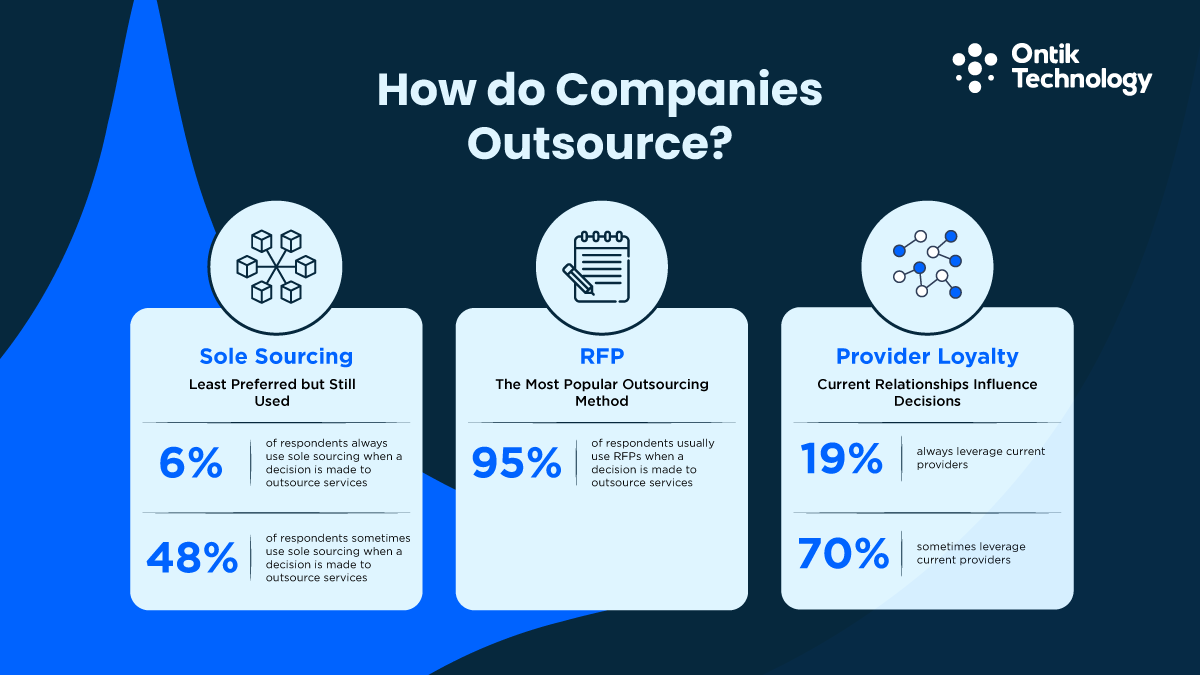
Before jumping into the details, first, you should understand what application development outsourcing means. In short, it’s when anyone can hire or work with another company or tech service provider to manage and handle their specific tasks and build different types of apps instead of doing it in house.
In 2025, many industries will try to save money or time by outsourcing to other companies. They rely on application outsourcing to some extent. From startups to mid and large companies, many founders prefer or suggest outsourcing application development because it saves money. Without burning too much cost, any startup or company can scale very quickly. At a low cost, they can hire expert resources through outsourcing.
For example, a startup or mid level company may outsource mobile application development teams to fulfill their tasks based on their requirements. They can handle everything from design to deployment. This is the ordinary framework in mobile application development outsourcing startups or mid level companies move faster without hiring a full tech team.
There are lots of companies that do not have the capability to build high quality apps due to lack of skilled team members and funding. That’s why they choose software application outsourcing or application software outsourcing to solve complex app problems and build high quality apps, especially when they need more advanced tech or AI features. The whole service from design to build time is overseen step by step when more advanced tech or AI features are required.
Choosing the right pricing model helps avoid surprises in your app development cost estimator. Whether you’re building for Android or iOS, your cost of Android app development or iOS app development cost will depend on the model you pick.
Startup companies may benefit from application outsourcing solutions because they can build high quality mobile applications at a low cost and receive high quality service from the outsourced team. This happens when you choose the right application outsourcing services provider, which makes it easier to scale with less risk.
What are the Factors That Influence App Development Outsourcing Costs
Cost to Outsource App Development by Regions
Outsource App Development Cost by Industry
Note: Ontik developers use the best technology to build mobile applications, and they have very hard skills to build any type of complex app within a few months. They build various types of mobile applications that show their credibility, so startups to large organizations can easily trust Ontik technology.
How to Choose an App Development Outsourcing Company
AI Expertise Is a Must
Choose teams experienced in AI app development and automation. Startups want smart features from day one.
Experience with MVPs
Many startups start small. Pick a company skilled in MVP development to launch fast and scale later. Before choosing an outsourcing MVP development company, find out how many skilled developers they have and Is they fulfill your requirements or not.
Low-Code/No-Code Familiarity
Look for partners who can handle low-code tools—they speed up development and cut early costs. Find out the partner who has to capability to build your mobile app first without doing any coding. And having knowledge of Low-Code/No-Code approaches and familiarity with retools and Bubble to build MVP products or MVP mobile apps quickly.
Proven Remote Collaboration
Companies with good remote work culture and tools like Slack, Notion, and Jira are now preferred.
Mobile First Development
Focus on agencies with strong mobile application development outsourcing experience mobile is still king.
Transparent Pricing Models
Choose providers who clearly explain cost breakdowns many now use cost estimators or calculators on their websites.
Security & Data Compliance
As apps handle more sensitive data, pick teams that follow strict security and GDPR compliance rules.
Skills in Building Cross Platform Apps
Teams that offer iOS, Android, and web app support under one roof are trending high.
Bangladesh & Eastern Europe on the Rise
Offshore app development hubs like Bangladesh are booming for quality work at low cost.
Outsourcing App Developers vs. In-House Teams: What’s Best for Building a Mobile App?
When any small company or startup founders who do not have a big team or skilled developers, they think that there is a big question startups and companies face: Should they hire in house developers or outsource the mobile application developers from another company? Both models have their advantages and disadvantages depending on their business goals and other elements of the business.
Average Costs of Outsourcing Mobile App Development
To give you an idea of the typical costs involved, here’s a rough breakdown of what you can expect when outsourcing mobile app development and Affordable Solutions: We know startups need to be careful with money. That's why we offer cost effective options without compromising quality. You can start by building a mobile application to test your idea without spending too much. Plus, we save your time by assembling a development team, so you can focus on other important tasks.
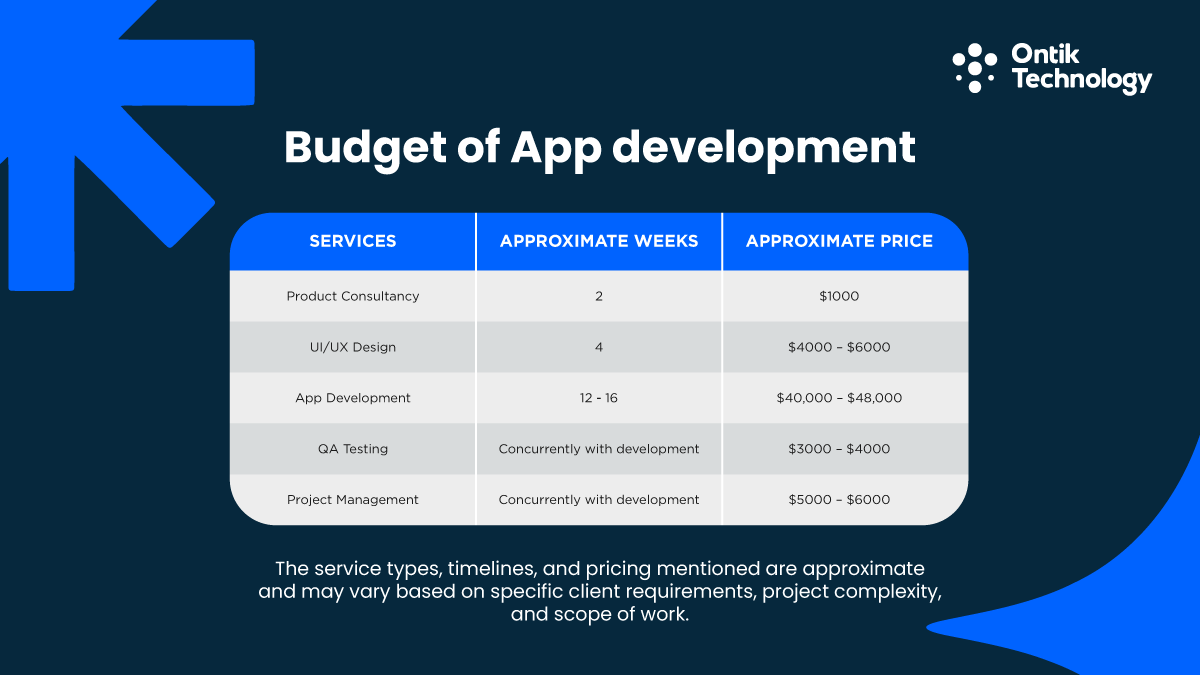
Why Outsource App Development to Ontik Technology?
Ontik Technology is a top choice when you want to hire offshore remote mobile app developers. With years of experience in mobile application development and a strong portfolio of successful offshore mobile app development projects, Ontik ensures that your app is built with the best quality. Whether you're looking for offshore iOS mobile app development services or offshore mobile app development services, Ontik is your trusted partner for creating high quality mobile apps.
1. Smart Development for Fast Results
Ontik Technology specializes in delivering high-quality applications quickly and efficiently. We follow agile methods and use the latest tech to build results driven apps tailored to your business goals.
2. MVP First Approach for Startups
We help businesses launch faster by focusing on Minimum Viable Products (MVPs). This lean approach saves cost, reduces risk, and validates your idea early, perfect for startups and scaling teams.
3. Flexible Team, Scalable Solutions
Outsource confidently with our flexible team structure offering both dedicated developers and full project teams. You can scale up or down based on your project needs.
4. Built In Efficiency with Modern Tools
We use modern frameworks and cloud technologies to build apps that are secure, scalable, and future ready. Our toolset ensures faster delivery with optimized performance.
5. AI Enhanced Workflows Where It Matters
While not all apps need AI, we integrate smart features like automation, personalization, or chatbots when it adds real value to your product. Our team can guide you on where AI fits best.
6. End-to-End Support From Concept to Launch
From idea validation and design to full-stack development and launch, Ontik offers full cycle development support. We act as your extended team throughout the journey.
7. Proven Results Across Multiple Industries
We’ve worked with clients in e-commerce, healthcare, logistics, SaaS, and more. Our apps are designed to meet industry specific challenges while maintaining speed, quality, and flexibility.
Final Thought
The outsourcing model is not just about saving money it’s a smarter and more effective move for any business to reach its goals. Startups and many companies solve their problems and tackle difficult challenges through outsourcing, allowing them to launch apps quickly, work with expert developers, and reduce hiring costs.
Whether you need a simple app or a full featured product, outsourcing app development helps you focus on your business while expert developers handle the tech work for you. Ontik Technology is a great choice for this. They have experience, skilled developers, and they understand what startups need. They can build your app fast and at a good price.
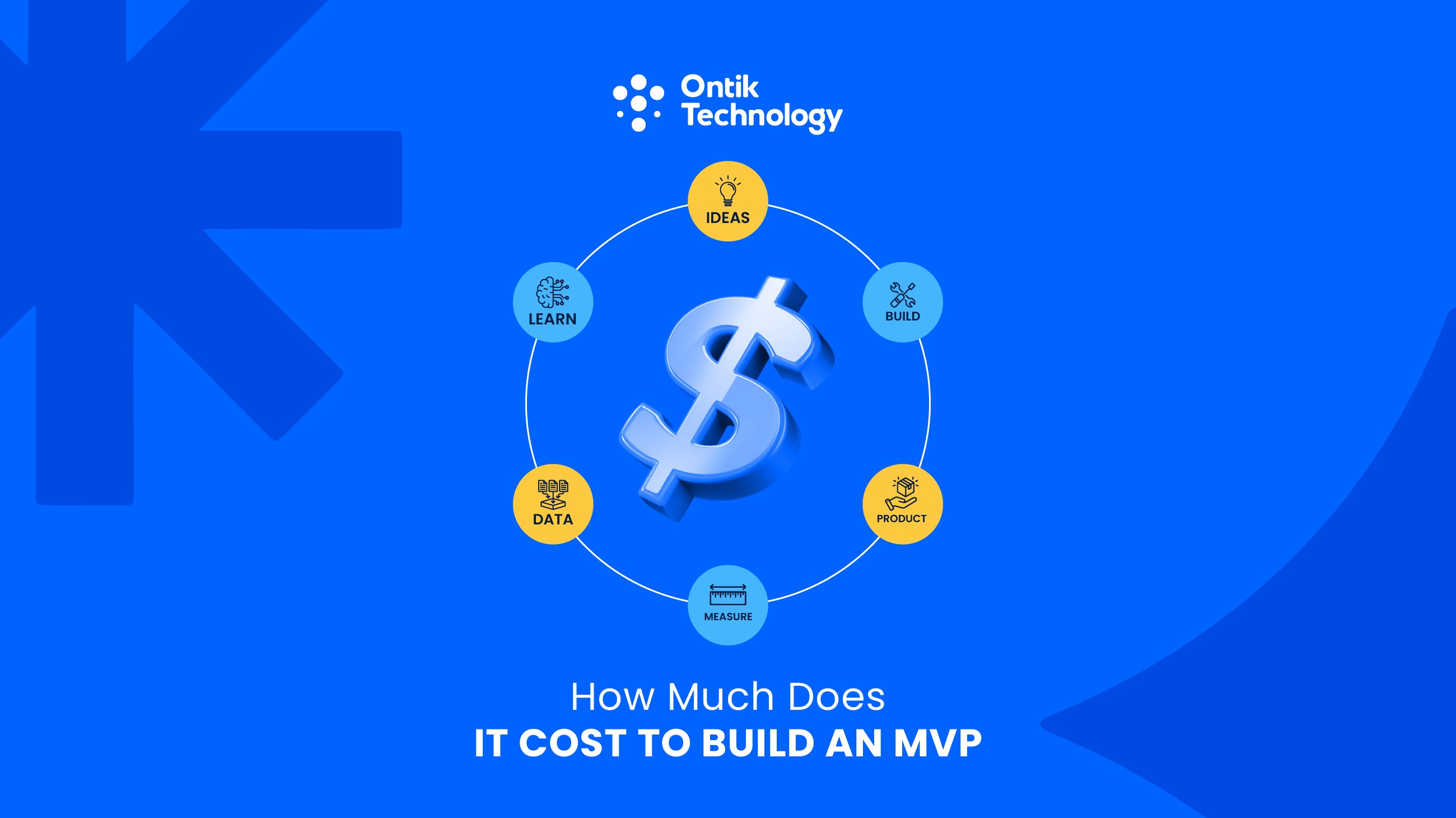

An MVP (Minimum Viable Product) is a simplified version of a product designed for easy customer use. It allows users to help themselves, discover the product on their own, and start using it with minimal guidance.
If you’re building a new product, launching a startup, or testing a fresh idea, you’ve probably heard the term MVP (Minimum Viable Product). It’s a smart way to launch fast, learn what works, and avoid wasting time or money.
Turning your idea into a real product feels amazing, and making money from it is even better.
Building an MVP is the smartest way to turn your startup idea into a real product without wasting time or money. This guide explains how much it costs to build an MVP, what factors affect the budget, and how Ontik Technology helps founders launch fast with clarity and confidence.
At Ontik Technology, we work with startups across every stage of the MVP journey. Whether you’re just validating an idea, upgrading a rough prototype, or preparing to scale your product, this guide shows exactly how we help you get there.
Why is Budget Planning Essential for MVP Development?
An MVP (Minimum Viable Product) a is the first step for startup founders, and businesses to test a new idea. It allows them to build a lean, workable version of their digital product to check if it works without spending too much time or money.
This approach is ideal for new businesses still shaping their core idea or for teams looking to add new features but unsure how users will respond.
With an MVP startups, founders, and businesses can get real feedback early, fix issues before they grow, and avoid wasting money and time on something people don’t want. Before you build your digital product or MVP, you need to plan or calculate how much it costs to build an MVP.
Many people ask, "How much does an MVP cost?" The answer depends on your idea, features, design, and the team you choose. If you are building a software business, understanding the SaaS MVP development cost is important. Even if you use low code tools, you still need to know the low code MVP development cost. Planning your budget helps you pick only the most needed features. This way, you can reduce MVP development costs and launch your product faster. It also helps you understand the MVP app development cost, MVP prototype cost, and the full cost of MVP development.
Knowing the cost of developing an MVP is an indication that you're serious and well prepared when speaking with investors. That's why you should have a well defined plan in place, whether you are discussing how much does MVP cost or how much does MVP software development cost.
Ontik Technology focuses on helping visionary founders, early stage teams, and startup builders bring their ideas to life through meaningful MVP solutions. Our services are ideal for:
How Much Does It Cost To Build An MVP (Minimum Viable Product)
Here’s a simple breakdown of the cost to build an MVP based on real startup situations. From idea research to support after launch, every step has its own cost and matters a lot. If you know the early stages, that can help you plan and avoid burning money.
Various elements or factors can affect MVP development cost as in how complex your app is, how skilled your developers and team members are, and how much time it takes to launch your MVP product. There are lots of parts involved here, like frontend design, backend work, third party tools, and product testing costs, which can increase your MVP cost. If you want something quicker and more affordable, low code MVP development cost options are available, but they may not scale well in the future.
If you're wondering how much does it cost to develop an MVP, the usual cost is between $15,000 and $50,000, based on how advanced your idea is. But it’s not just about the price, it’s about smart planning. Startups should try to reduce MVP development costs by choosing the right team.
🟢 Note: Ontik Technology is one of the top choices for MVP product development. They offer clear pricing, fast delivery, and trusted MVP development services for startup companies. Whether you’re building a mobile app or an SaaS MVP, Ontik helps you build an MVP quickly and efficiently.
Core Cost Component of MVP products Development
Workflow Breakdown of MVP Development
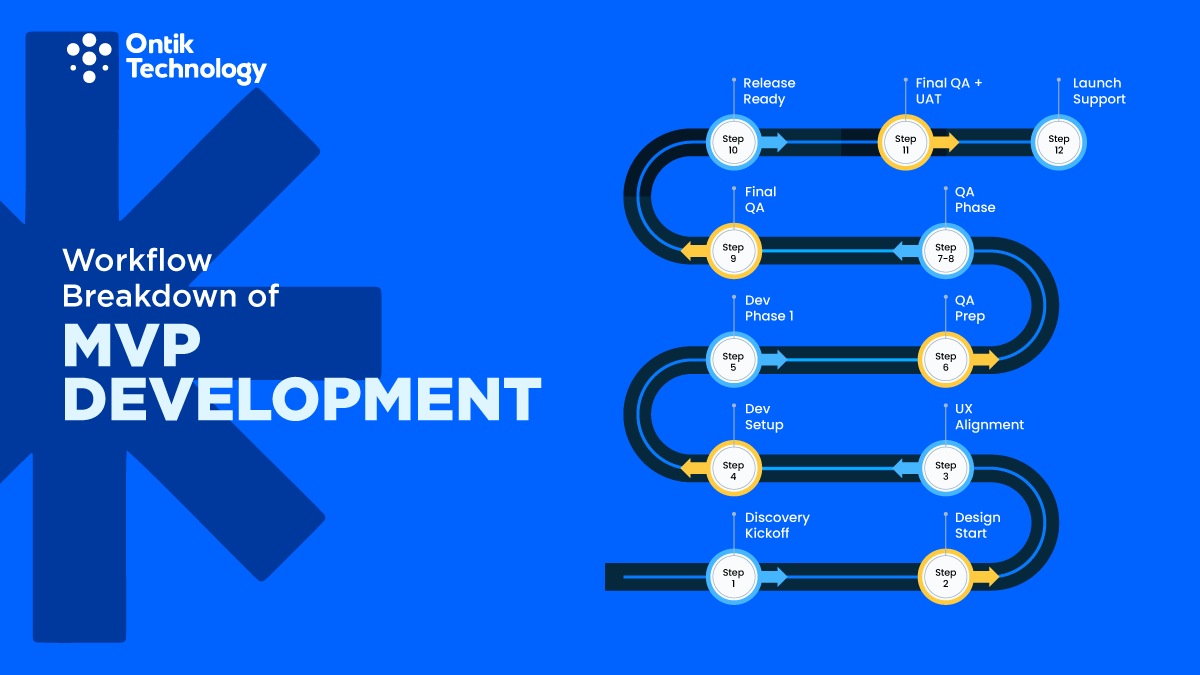
Here is the workflow breakdown of MVP product development:
Step 1: Discovery Kickoff
- Stakeholder session to understand the vision
- Define product goals and user needs
- Finalize scope and roadmap
Step 2: Design Start
- Deliver Figma flows and user stories
- Set up task board in Jira or ClickUp
- Begin user experience design
Step 3: UX Alignment
- Review feedback on designs
- Refine UI and UX scope
- Lock core user journeys
Step 4: Dev Setup
- Start with user management module
- Prepare base architecture
- Deliver first internal demo
Step 5: Dev Phase 1
- Build core product features
- Create 2nd demo with flows working
- Track progress with weekly updates
Step 6: QA Prep
- Reach 50% code completion
- Start writing test cases
- Prepare for functional testing
Steps 7–8: QA Phase
- Run regression testing
- Fix bugs and improve usability
- Handle minor scope additions
Step 9: Final QA
- Freeze the code
- Polish the product experience
- Prepare for deployment
Step 10: Release Ready
- MVP is now deployable
- Complete all documentation
- Handoff for internal review
Step 11: Final QA + UAT
- User Acceptance Testing with 90–100% test case coverage
- Create a user guide and support docs
Step 12: Launch Support
- Sign off from team or client
- Final code handoff
- Internal training and post-launch prep
Hour and Time Cost Breakdown of MVP
Ontik follows a structured timeline approach for MVP delivery based on your startup stage.
- For idea stage founders, the process takes around 4 to 6 weeks
- For startups building or upgrading an MVP, it takes 8 to 12 weeks
- For launch ready startups needing scale or polish, it takes 6 to 16 weeks
There's also a sample 12-week breakdown showing each weekly activity like discovery kickoff, design, development, testing, QA, and launch support. This makes it easier to track time spent across different phases and align resources at each step.
People and Developer Cost Breakdown of MVP
Each stage of MVP development involves different experts to keep quality high and delivery fast. Ontik assigns dedicated professionals depending on your MVP type:
Idea Stage MVP
- Product Strategist
- UI UX Designer
- No Code Developer (if needed)
- Business Analyst
MVP Builder or Upgrader
- Product Manager
- UI UX Designer
- Frontend and Backend Developers
- QA Engineer
- DevOps (if needed)
Launch Ready MVP
- Senior Developer or Architect
- DevOps Engineer
- QA Lead
- Automation Specialist
- Technical Project Manager
This team setup shows the human cost involved in combining strategy, design, development, and QA to deliver a complete MVP.
Cloud Hosting Options for MVPs
Choosing the right cloud hosting is very important when building an MVP. It helps your product run well, grow easily, and stay within budget. Cloud hosting gives you flexibility, saves money, and lets you launch faster without spending too much. Here in this table, we can show the three most renowned cloud provider and their overviews, processes, pricing rates, and key features:
Factors Influencing the MVP Development Cost
If you're a startup founder planning to build your first minimum viable product (MVP), one big question is: How much does it cost to build an MVP? The answer depends on many things from your product idea to your team setup. Here’s a detailed look at the real factors that influence the MVP development cost, especially for startups.
- Project Complexity & Features
The more features you want in your minimum viable product, the higher the MVP development cost. A simple MVP with core functions is cheaper, while advanced AI or SaaS features increase the cost of MVP development.
- Team Location & Hiring Model
Team location matters for building MVP products. The cost to develop MVP can vary based on which country the developers are in, how skilled they are, and where your development team is located. There are 3 hiring models: offshore, nearshore, and onshore. Hiring offshore developers from Asian countries helps reduce MVP development cost while still delivering high quality products and services at a much lower price than U.S. based options.
- Three Development Approaches: No-code, Low-code, or Custom
There are three approaches available. If you're wondering how much does it cost to develop an MVP, it can vary based on your approach. No-code tools like Retool and Bubble can lower costs, rather than preparing custom coded MVP products. Low-code MVP development costs are usually lower, but they may not be scalable. Custom software development costs more but allows more control and growth.
- Different Platform Types: Web, iOS, Android
MVP cost can vary based on different factors, and it depends on your requirements, like whether you’re building for a single platform or multiple ones. A web app is more budget friendly, whereas developing for iOS and Android increases your MVP app cost.
- Design Needs: UI/UX Simplicity vs. Detail
Sleek and modern UI/UX design can improve user retention, but it adds to the cost to build MVP. Custom visuals, animations, and prototypes raise the MVP prototype cost.
- Technology Stack
Your chosen tools and frameworks affect the development cost of MVP. Some tech stacks take more time to consume, which increases both development time and the overall MVP cost.
- Team Structure: In-house vs. Outsourced
Having an in-house development team gives full control but raises the MVP development budget due to salaries and overheads. Outsourcing to MVP development services or agencies offers flexibility and a lower average cost.
- Post Launch Support
The cost of MVP software development isn’t just about building it. It includes support, updates, and improvements. Make sure your MVP development process includes post Launch maintenance in the cost estimate.
Convert Your Business Idea into Reality with Ontik Technology’s MVP Development Services
1. From Idea to Impact Start with an MVP
Building a complete app at once takes time and money. Ontik helps you start small with a clear MVP that lets you test real users early. This lowers your mvp development cost while proving your idea fast.
2. Clear and Honest Pricing
Not sure how much does it cost to develop an MVP? We offer fixed pricing and transparent scope, so you get clarity from day one from mvp prototype cost to a full launch plan.
3. Fast Delivery Without Quality Loss
Our team focuses on fast delivery. You get your MVP within 9 to 12 weeks so you can move forward quickly without sacrificing quality.
4. Full MVP App Development Support
From planning to launch, we handle the entire process. Whether it's a mobile app, SaaS MVP, or low-code MVP, our roadmap shows you exactly what to do and when to do it.
5. Scalable and Future Ready Solutions
We help you build an MVP that grows with your users. Our post MVP support and scaling lets you improve and expand without starting over keeping your long term costs low.
6. Skilled In-House and Offshore Teams
You choose how to work with our dedicated product and tech team or a flexible offshore setup. Either way, we give you quality, control, and cost balance.
7. Trusted SaaS MVP Development Cost Models
For SaaS founders, our SaaS MVP development cost plans are built to match your product roadmap and business goals.
8. Maximize Efficiency, Minimize MVP Costs
Our strong UX and dev execution means we use smart tools, reusable code, and automation to build fast and reduce waste keeping your MVP development costs down.
9. Industry Trusted MVP Development Services
We are trusted by real startups who choose us for MVP development services. From design to launch, we give you solid results with a clear timeline and proven delivery.
10. Partner with a Proven MVP Expert
Ontik is not just a builder we are your partner. We help you design, budget, and deliver your MVP with confidence and support your growth from day one.
Why Founders Choose Ontik To Build an MVP
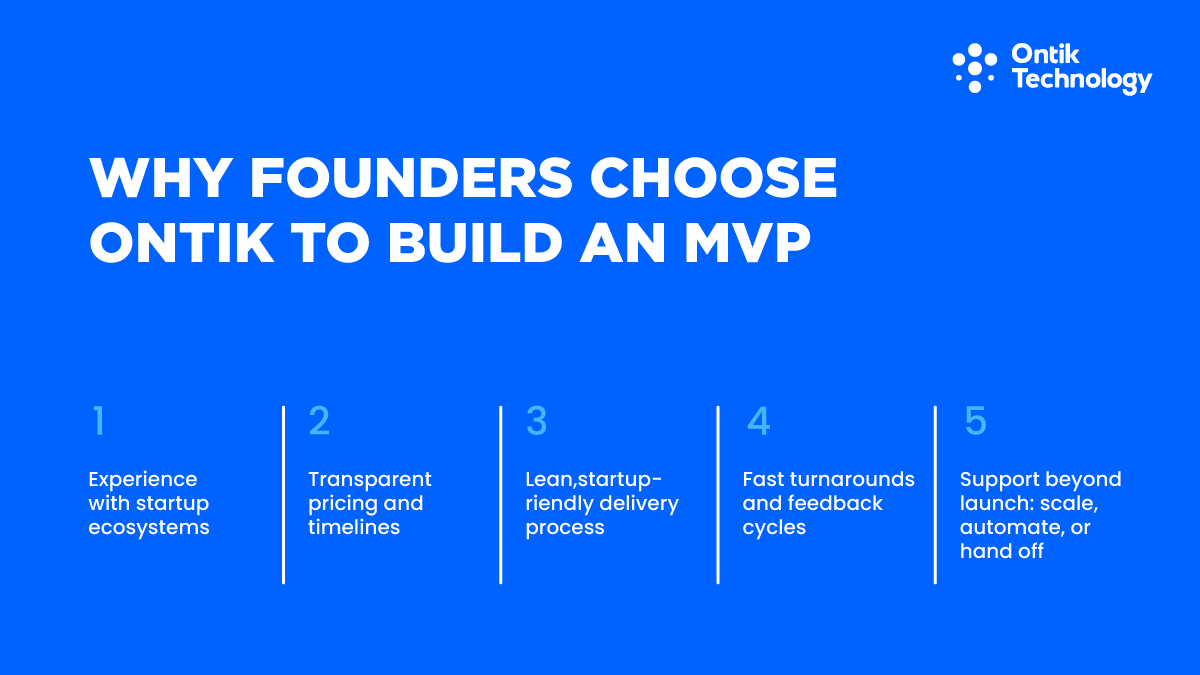
Why Founders Choose Ontik To Build an MVP Product
- Experience with startup ecosystems
- Transparent pricing and timelines
- Lean, startup-friendly delivery process
- Fast turnarounds and feedback cycles
- Support beyond launch: scale, automate, or hand off
Final Thoughts
Building an MVP product or digital solution is one of the smartest first steps for any startup. It allows founders to test their ideas, scale their business, and achieve a high return on investment (ROI). In today’s world, building an MVP quickly is possible. You just need to choose the right and experienced team that specializes in MVP or SaaS product development.
This article covers everything you need to know: a full MVP cost breakdown, key factors that influence development costs, and how to plan your MVP development budget wisely. An MVP lets you launch smarter, test early, and grow faster. With the right team like Ontik, you can keep costs low, build what users need, and move from idea to success in your business.


Today, businesses don’t need to hire people to get their work done. Businesses don’t need to go through the hassle of hiring, onboarding, and retaining resources, which can be done by experienced, talented resources from other parts of the world, while also saving on your expenses. Thanks to technology and remote work, they can find skilled workers from anywhere in the world.
Employees are one of the most valuable parts of any company. With technology and remote work, businesses now have more hiring options. They don’t have to stick to one location—they can find skilled people from anywhere in the world. Many companies are now choosing to outsource important tasks and projects. The global outsourcing market is already worth over $260 billion and could double by 2030.
This article will explain two popular IT staff hiring models that help businesses grow: staff augmentation and managed services. While these two approaches might look alike at first, they function differently. Understanding how each one works can help you make the right decision and create a smarter plan for your business growth.
Global Market of Staff Augmentation Vs Managed Services
In 2022, IT services around the world were worth about $821.58 billion. In the near 2030, many Experts say and predict that the market will grow at a 9.1% rate. Also, in 2020, the IT outsourcing market was around $318.5 billion, and by 2026, it could reach $425.19 billion, growing about 4.5% each year.

These numbers indicate that startup founders and mid-level business owners do hire people from outside of the country, and it also helps to save their money and hire skilled people at a low cost, and save their time as well. These numbers show that companies today are not just depending on their teams. Instead, they are hiring skilled experts from outside to help with new ideas and better solutions. Staff augmentation and managed services are two popular ways businesses engage with offshore staffing teams.
Both offer benefits like saving money, gaining expert help, working more efficiently, and being able to scale easily. But these two methods apply to totally different use cases. If a company needs full project help for a long time, managed services might be a better choice. But if a business needs short-term support or help with a specific task, staff augmentation is a smart option.
Let’s talk about the main differences between managed services and staff augmentation. This will help you choose the right option for your current work. Let’s begin:
What is Staff Augmentation?
Staff augmentation means hiring resources from outside the country or a nearby company to help fill resource gaps for a short period. You don’t need to hire them full-time; instead, they are hired on a project basis. These resources can join when the project starts and leave once the project is completed.
This is a smart option for companies when they need special skills or more people for a short time. It’s also helpful when deadlines are close, but the team isn’t big enough to finish everything on time. Instead of spending a lot to hire permanent staff, companies bring in the right experts only when needed.
This is a smart move for any business owner or founder when they need skilled people for a short period. It can be very helpful when project deadlines are near, but the company doesn’t have enough resources to complete the work. Instead of spending on permanent hires, a company can find the right talent at a lower cost and bring in experts only when needed.
Note: Ontik Technology has the right resources to meet your needs. They have already worked on many staff augmentation projects and successfully fulfilled their clients’ requirements.
Example from Ontik Technology – Staff Augmentation in Action

Instead of hiring someone full-time, they asked Ontik for support. Ontik provided a Flutter expert who joined their team for two months. The expert worked with Chippit’s team, helped build the app smoothly, and left once the project was finished.
Ontik Technology is your go-to partner for smart staff augmentation. When Chippit faced a tight deadline and lacked React Native experts, Ontik stepped in with the perfect solution. Ontik tech-skilled Flutter developer who worked seamlessly with Chippit’s team for two months. No long hiring process. No wasted resources.
The result? The app was launched into the market on time, with high quality, and the client was fully satisfied. This is how Ontik helps businesses scale fast and efficiently. This way, Chippit didn’t waste time or money. The app was done on time, and everyone was happy.
Ontik Technology has done many projects like this. They have the right people to join your team when you need extra hands, just for the time you need them. Simple, fast, and budget-friendly.
Types of Staff Augmentation Models

There are various types of staff augmentation models available. Here, we'll discuss some popular models:
Onshore Staff Augmentation:
In this process, you can hire additional personnel from within the same country or region where your company is based. It provides advantages such as easier communication due to shared time zones. Sometimes, it may come with higher labor costs when you compare it to offshore or nearshore options.
Offshore Staff Augmentation:
This process involves hiring resources from a different country, often located in a different time zone. This model offers cost savings due to lower labor expenses in offshore locations But yes, there are potential challenges in communication and cultural differences. Leveraging time zone differences can provide access to a wider talent pool and round-the-clock productivity.
Nearshore Staff Augmentation:
In Nearshore staff augmentation, you can hire staff or resources from neighboring or nearby countries. This model strikes a balance between cost savings and proximity. It also offers advantages such as similar time zones, cultural affinity, and reduced travel time for collaboration.
Short-Term Support:
Bringing in extra help for a short time to handle urgent or temporary tasks, like seasonal work or a sudden rise in projects.
Long-Term Partnership:
Hiring professionals for a longer period when companies need ongoing help, but don’t want to hire permanent staff.
Blended Model:
Mixing different models by using local staff for one part of the job and remote or offshore staff for another part to balance cost and control.
Skill-Focused Hiring:
Hiring people with specific skills for a project when in-house teams don’t have those skills.
Expert-Level Talent:
Getting top experts who are very experienced or have special knowledge for complex tasks that need high-level talent.
So, it's up to you which one you prefer for your particular projects or business. If you're struggling to decide which one to choose, Ontik Technology's professionals can help. All you have to do is contact our expert team.
What are Managed Services?
What is Managed Service?
Managed service means giving some of your company’s IT work to another company (called a service provider) to handle for you. Businesses often do this through a monthly or yearly contract. You can outsource many types of tasks like software development, keeping your data safe (cybersecurity), moving data (data migration), or managing your databases. Types of IT Managed Services Models
The service provider does the job on their own—they don’t become part of your office team. Once you permit them, they’ll share how much it will cost and how long it will take. Then they work to get the job done as planned. Managed services are a smart choice for companies that want to save money and time. It helps reduce the pressure on your internal team while making sure the work is done well and on time.
Types of IT Managed Services Models
Ontik Technology offers flexible IT managed services that help your business run smoothly, stay secure, and grow faster, just the way you need it.

Looking for full-scale IT support? Ontik Technology’s Managed Services team delivers everything from: Dedicated Development Team, Team Augmentation, Outsourced MVP Development, Integrated Business Automation, Custom Software Development, Web Development, Web 3 Development, Mobile Development, Artificial Intelligence, UI/UX Design, BI & Data Science, Enterprise Resource Planning, Cybersecurity, to project-specific solutions all tailored to your business growth.
Staff Augmentation vs Managed Services: Discover the Strategic Benefits
Why Choose the Staff Augmentation Model?
Staff augmentation means hiring resources from outside the country or a nearby company to help fill resource gaps for a short period. It will help the company to move work faster, easier, and cheaper. Let’s look at how it helps:
1. Add or Remove People Easily
In the staff augmentation model, you can quickly hire resources and easily release them after the project ends. But in other models, you can't remove resources as easily. Based on the project requirements, you can hire or release team members without any restrictions
2. Finish Projects Faster
When you bring in skilled people quickly, your work gets done sooner. This means you can launch your app, website, or service before others do.
3. Get the Right Skills for the Job
Every project is different. Sometimes you need a designer, sometimes a developer. Staff augmentation lets you pick just the right person with the skills you need—no need to train anyone.
4. Grow Your Team Quickly
If your company suddenly has a lot of work, you can grow your team fast. You don’t have to wait for interviews and hiring steps. You just bring in ready-to-work people.
5. Save Office and Equipment Costs
You don’t need to spend money on a new office or tools. These people already have what they need. This helps your company save money.
6. You’re Still the Boss
In the staff augmentation model, even if new resources or team members come from outside the company or organization, you can still manage the project. You can assign tasks to them like a boss and make all the important decisions.
Why choose the IT Managed Services Model?
Managed services mean giving a full project or task to an outside company. They take care of everything—from planning to delivery. You don’t need to guide them every day. This model is perfect if you want to save time and focus on other business tasks. Let’s see how it helps:
1. Let Experts Handle Everything
You give the full job to a team that already knows what to do. You don’t have to explain every step. They plan, build, and deliver your project on their own.
2. No Need to Hire or Train People
You don’t need to spend time on interviews or training. The service provider already has skilled people who are ready to work from day one.
3. Focus on Business, Not the Tech Work
You can spend more time growing your business while the outside team takes care of the technical stuff. No need to worry about day-to-day problems.
4. Save Time on Project Management
In this model, you don’t manage the team. The managed service provider handles everything—timelines, quality, and delivery. You just review updates and give feedback.
5. Lower Long-Term Costs
Even though it might seem costly at first, managed services save money in the long run. You don’t pay for office space, tools, or full-time staff. You only pay for what you need.
6. Get Ongoing Support
Managed service providers often give 24/7 help. If something breaks, they fix it. If you need updates or changes, they handle it quickly without extra hiring.
7. Flexible Plans and Payments
IT Managed Services Model most of the approaches work on a monthly or yearly contract basis, based on your requirements, you may choose. There is no hidden cost here.
8. Better for Long-Term Projects
If you have a big or ongoing project, this model is a good choice. The team works like your tech partner and helps your company grow steadily.
9. Fewer Risks, More Peace of Mind
IT Managed Services Model the services follows some specific methods, like tested methods and so that there is less chance of mistakes, and they have proper backup and manage high security, and they can make sure the systems run smoothly and accurately.
10. Easy to Scale
If your business grows or changes, managed services can adjust quickly. They add more people or reduce the team based on your needs, without delays.
Key Differences Between Staff Augmentation and Managed Services
Staff Augmentation & Managed Services: Which Is Fit with You?
Ontik Technology provides both staff augmentation and managed services to help businesses meet project needs and team demands in the best way possible. Staff augmentation gives more flexibility. You can easily hire skilled people from outside for a short time or just for one project. Once the job is done, they can leave. You’re in full control of who joins and when.
Managed services don’t just mean signing a long-term contract—it fully depends on what the client specifically needs and how clearly those needs are defined. Once the tasks and deliverables are identified, the contract can be structured as mid-term or long-term. Instead of billing by man-hours, the pricing is often based on measurable outputs, such as the number of data migrations completed, issues resolved, or features delivered. In this model, Ontik Technology acts as a vendor managing the entire service delivery, not just providing people.
In short, If you want to control the whole team and manage the project, and you need the power to make changes at any time, then Ontik’s staff augmentation can support you. But if you need ongoing help with less hassle, our managed services are ready for long-term support.
Staff Augmentation & Managed Services: Which Is More Market Worthy?
At Ontik Technology, we enable scalable growth through both models, depending on your business goals. Managed services are usually easier to scale. With a managed team, you can quickly add services, people, or tools as your business grows because they already have the resources and systems to support it. With staff augmentation, scaling takes more effort. As you grow, you need to hire new people, and sometimes it’s hard to find the right talent.
In short, if you want to grow your business quickly, Ontik’s managed services can give you smoother and faster support, while staff augmentation keeps you flexible as you scale.
Staff Augmentation & Managed Services: Level of Control and Oversight
Ontik Technology ensures you get the right level of control depending on how hands-on you want to be. With staff augmentation, you stay in control. You manage the work, choose tasks, and follow up directly. It is helpful to track every step of the project. In a managed service model, you have full power to control everything or the service provider. They handle the work based on the agreement. You trust them to manage it well, but you won’t be involved in daily tasks.
In short: Pick staff augmentation from Ontik if you want to stay fully involved, or choose managed services if you prefer to focus on business while we handle the delivery.
Staff Augmentation & Managed Services: Which Is More Customizable?
Ontik Technology gives you full freedom to customize your project or hiring process based on your unique needs. Staff augmentation is highly customizable. You can bring in people with very specific skills for each task. They can work directly with your team, in your style.
Managed services are more fixed. The provider uses their way of doing things. It’s harder to ask for unique setups or changes outside their regular service.
In short, if you need highly skilled resources or to work with anyone who is an expert based on your requirements, then Ontik’s staff augmentation model is fit for your business.
Staff Augmentation & Managed Services: Which Scales or Uses More Security?
At Ontik Technology, both models are built with a strong focus on performance and protection. Managed services give stronger security. The providers are experts in data safety, threat detection, and system protection. They work 24/7 to keep your data safe.
With staff augmentation, it depends on your systems and rules. The external team might be skilled, but security still depends on your internal setup.
In short, for higher protection and full-time security help, managed services from Ontik are the better choice. But with our staff augmentation, you can still ensure compliance by aligning the team with your internal processes.
Staff Augmentation vs Managed Services: Pros & Cons
Here is a simple table showing the pros and cons of staff augmentation:
Here is a simple table showing the pros and cons of Managed Services:
How Leading Companies Leverage Staff Augmentation & Managed Services
🟡 Staff Augmentation for Agile Scaling
When Spotify needed to accelerate the development of its AI-powered recommendation engine, it used staff augmentation to quickly onboard machine learning specialists and data engineers for a 6-month project. This approach gave Spotify immediate access to niche expertise without long-term hiring commitments. Interestingly, while Spotify builds its core algorithms in-house through augmented teams, it relies on managed cloud services from Google Cloud to host its massive music catalog, showing how companies blend both models strategically.
🔵 Managed Services for Operational Excellence
Netflix's entire streaming infrastructure runs on AWS managed services, handling everything from global content delivery to autoscaling during peak demand. While Netflix outsources its infrastructure management, it simultaneously uses staff augmentation to bring in specialized video encoding engineers for short-term optimization projects. This dual approach allows Netflix to maintain 99.99% uptime (via managed services) while staying technologically competitive through targeted talent augmentation.
Choosing the Right Model for Scaling Your Business
Picking the right way to handle your IT work is important. Many companies now look at two main choices: staff augmentation vs managed services. Both models help your business in different ways, so choose based on your goals and needs.
Staff augmentation services mean hiring resources from outside the country or a nearby company to help fill resource gaps for a short period. This is helpful when your existing team needs support or you don’t have a certain skill in your company. The best part is, staff augmentation allows you to hire experts just for the time you need them. You stay in control and manage their work directly. That’s why staff augmentation offers more flexibility and quick help.
On the other hand, the managed services model is when you give a full job or task to a third-party provider. You don’t manage them daily—they handle the work for you. Managed services involve outsourcing, which means giving some of your company’s IT work to another company (called a service provider) to handle for you. Businesses often do this through a monthly or yearly contract.
When deciding between staff augmentation and managed services, think about how much control you need, how long you need the help for, and how much budget you have. Staff augmentation services are fit for short-term projects or if you need skilled people for a short time. You can add people quickly, work with them, and release them when the job is done. It also costs less for small tasks. But if you need full support all the time, managed services provide a more stable solution.
Yes, managed services may cost more each month, but they save you time and reduce stress. You don’t need to manage people yourself. You can trust the managed service provider to take care of things. Some companies use both models at the same time. This way, they can enjoy the strengths of both. For example, they use staff augmentation for a short project and managed services for long-term support.
When choosing your outsourcing model, think about your business goals. Do you need help right now for a short time? Go with staff augmentation. Want to stop worrying about IT and get full-time help? Then choose managed services. There are pros and cons to both models. Just make sure to look at what your project needs. If you're still unsure, talk to an expert.
At Ontik Technology, we understand the difference between staff augmentation vs managed services. We’ve helped many businesses choose the right model. If you want to outsource your IT work the right way, we’re here to help. Why Ontik Technology is a perfect fit for both Staff Augmentation and Managed Services models:
- Flexible to Your Needs
Ontik Technology can provide the right people when you need them and for how long you need them—perfect for short projects or long-term support. - Fast Team Building
They can quickly give you expert developers, designers, or testers without you waiting for weeks to hire full-time staff. - Skilled and Trusted Experts
Ontik already has skilled people who have worked on many different projects. You get experienced hands without the training hassle. - Stay in Control or Leave It to Them
If you want to manage the project yourself, Ontik supports that. If you want them to handle everything, they can do that too. You choose your comfort level. - Cost-Saving Solutions
They give you high-quality services at a lower cost than building a big in-house team. You get more value for your money. - Great for Small or Big Projects
Whether it’s a small task or a full mobile app, Ontik can support both staff augmentation and managed services with equal success. - Smooth Communication
Their team talks, updates regularly, and always listens. So, there’s no confusion—just smooth work. - Proven Track Record
Ontik has already worked with different clients worldwide under both models and helped them finish their projects on time.
Final Thoughts
In the end, both staff augmentation and managed services help businesses based on the requirements of the business owner or founders. Both models can save money and help to improve the work quality, provide resources at low cost, and provide expert help when needed. To pick the best software development outsourcing model, first of all, you may decide what your requirements are, what is needed for your services, how long your project is, how much you need to control your business, and your budget. Each model has its advantages and disadvantages, so choose the right model that fits your business goal and which helps you to get high ROI, and pick one model that fits your team, your projects, and your plans.
